Globally Patients Seek Clear Communications to Build Trust with Healthcare, Especially in the AI Era
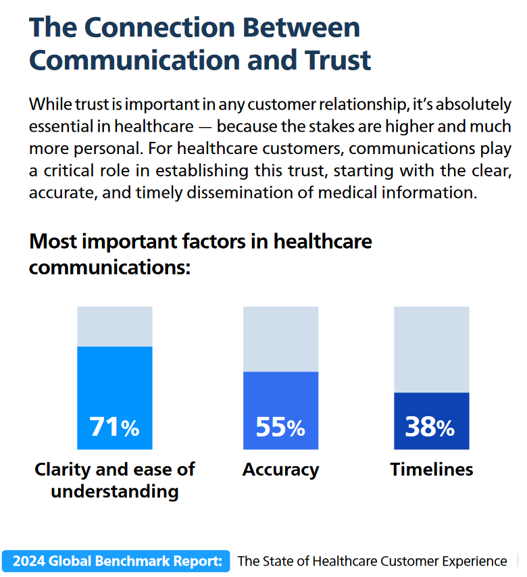
Globally, patients are growing consumer muscles leaning into trust that’s building on communications that connect with them, based on insightful research from Smart Communications. This consumer research was fielded by Toluna and Harris Interactive in February and March 2024. In The State of Customer Conversations, the report assesses input from global consumers from the APAC region (Australia, New Zealand, China, Hong Kong, Taiwan, Japan, and Singapore), German-speaking markets (Austria, Germany, Switzerland), the United Kingdom, and the U.S. The research revealed five key findings, shown in the first exhibit: Communications are increasingly important
Will the Apple Watch, Samsung Galaxy or Oura Rings Become “Intelligent Guardians” For Health?
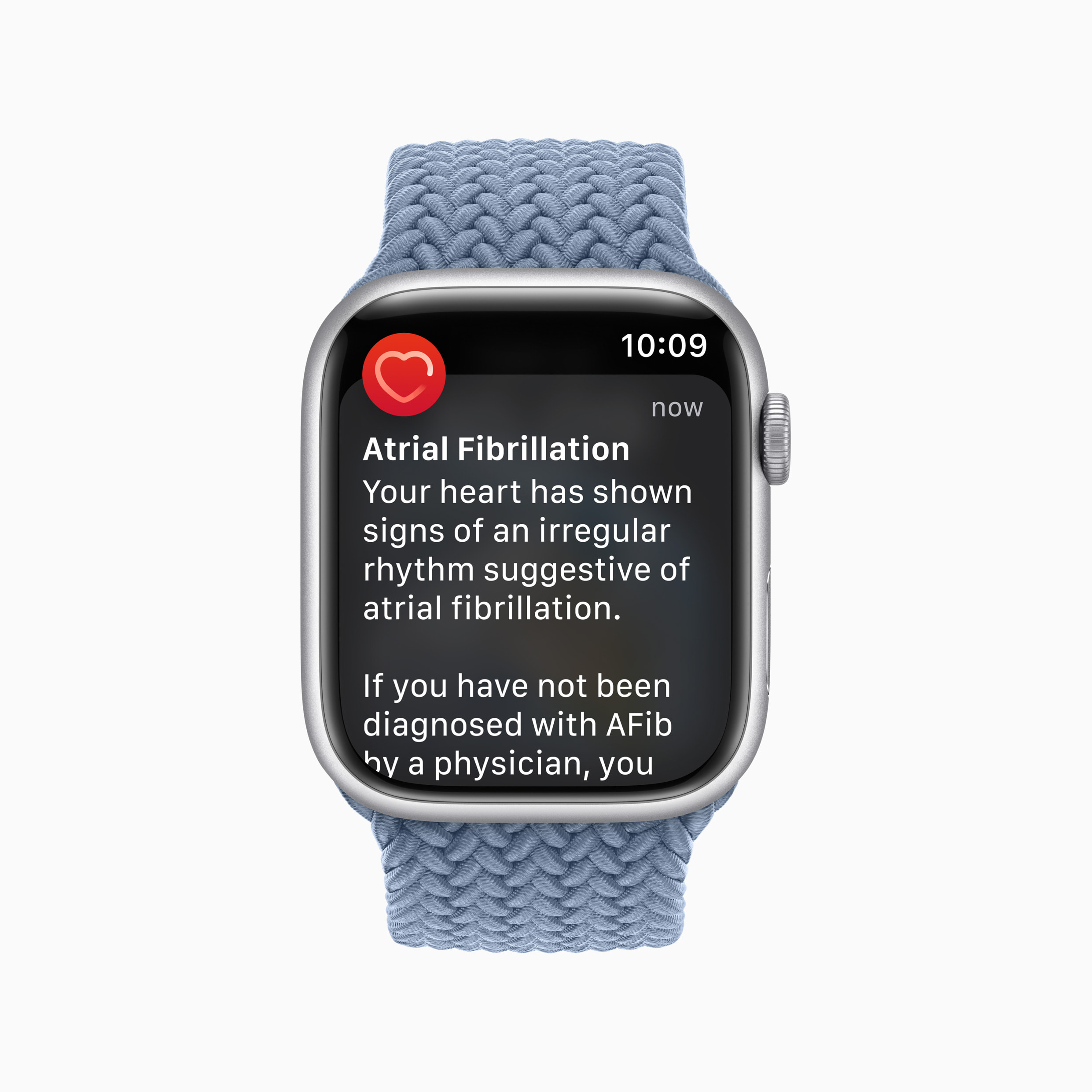
One of the few bright spots in consumer technology spending in the past couple of years of the U.S. economic “vibecession” has been the category of smartwatches. The Wall Street Journal recently talked, specifically, about the growing role of the Apple Watch for health care, gaining traction as a part of cardiologists’ and other physicians’ testing for and adoption of the wearable tech device for patients who are managing medical conditions. Data from CTA, the Consumer Technology Association, has been tracking such spending which I’ve often discussed here in Health Populi
Can AI Help to Improve Health Equity? U.S. Scientists Weigh In With “Yes,” Baking in Ethics and Accountability
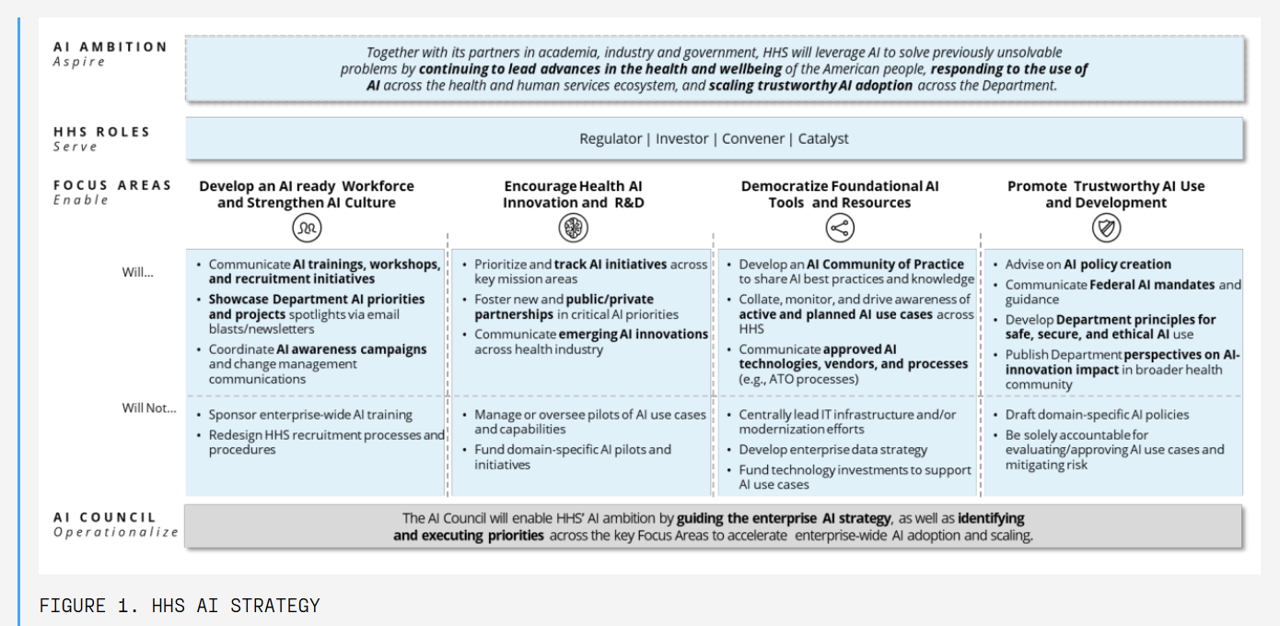
The Federation of American Scientists (FAS) was founded in 1945 by a group of scientists concerned about the atomic bomb — sharing a mission to focus on technology, science, and innovation to, in the Association’s words, “work toward a safer, more equitable, and more peaceful world.” Nearly 80 years after the organization’s launch, the FAS is focusing on the growing role of artificial and augmented intelligence across the many areas that touch peoples’ lives — including health care and well-being. The FAS published a state-of-the-nation essay on June 27 on Improving Health Equity Through AI.
Health Information Security – My Interview with Richard Kaufmann, CISO of Amedisys, Part 3: The Futures of Cybersecurity in Healthcare
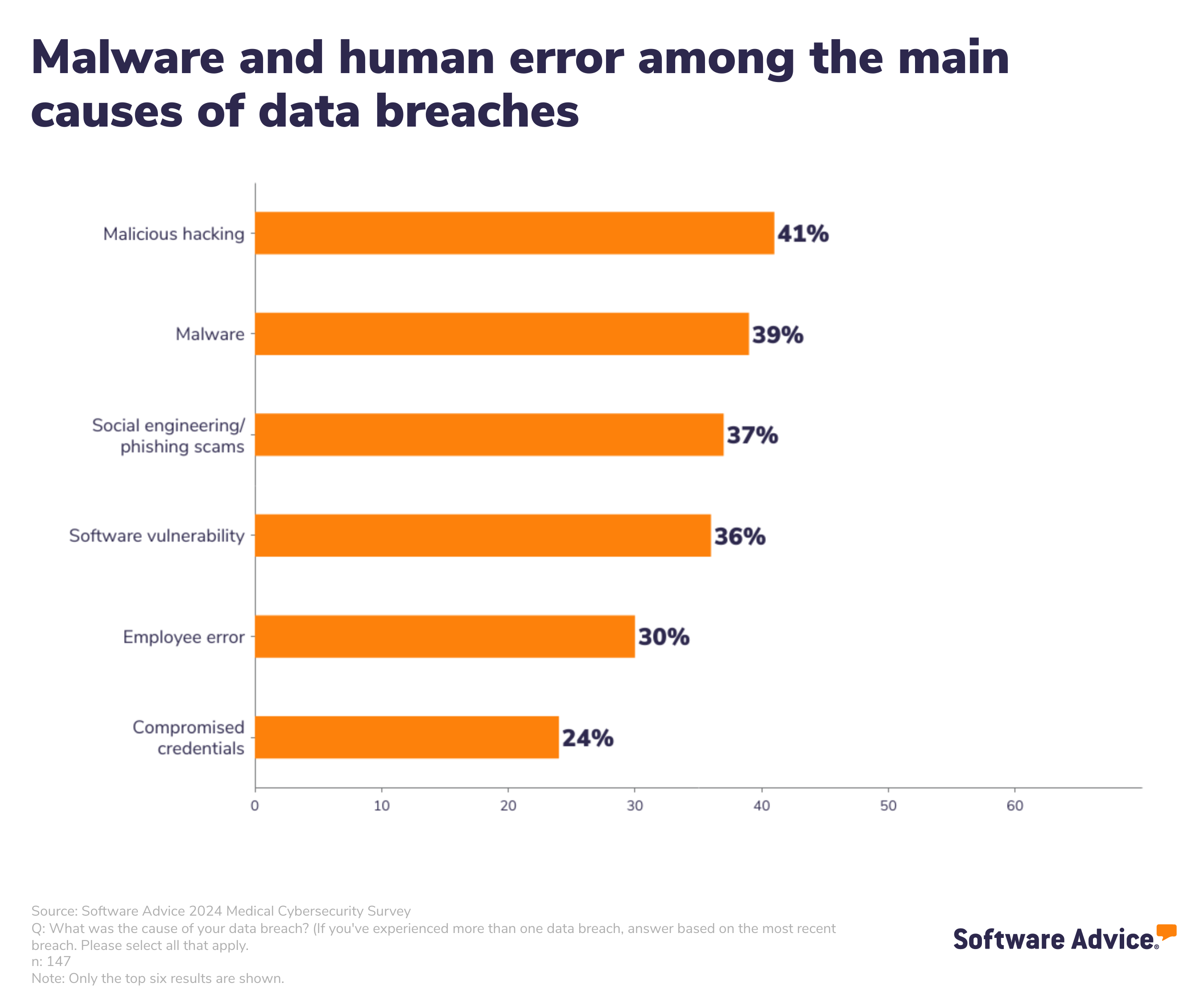
At least one-half of U.S. health care organizations have experienced a data breach, one-third in the last 3 years, according to Software Advice’s 2024 Healthcare Data Security Survey released in May 2024. Of the health care organizations who experienced ransomware attacks, one-third did not recover patient data from the cyber-attackers, Software Advice learned. Clearly, cyberattacks are impacting patient care. And the growth of home care, hospital-to-home, and greater self-care are also increasing risks for cybersecurity. The growing adoption of digital technologies in healthcare, from the hospital to the doctor’s office to the home,
Most Americans Follow an Eating Pattern in Search of Energy, Protein, and Well-Being – With Growing Financial Stress: A Food as Medicine Update
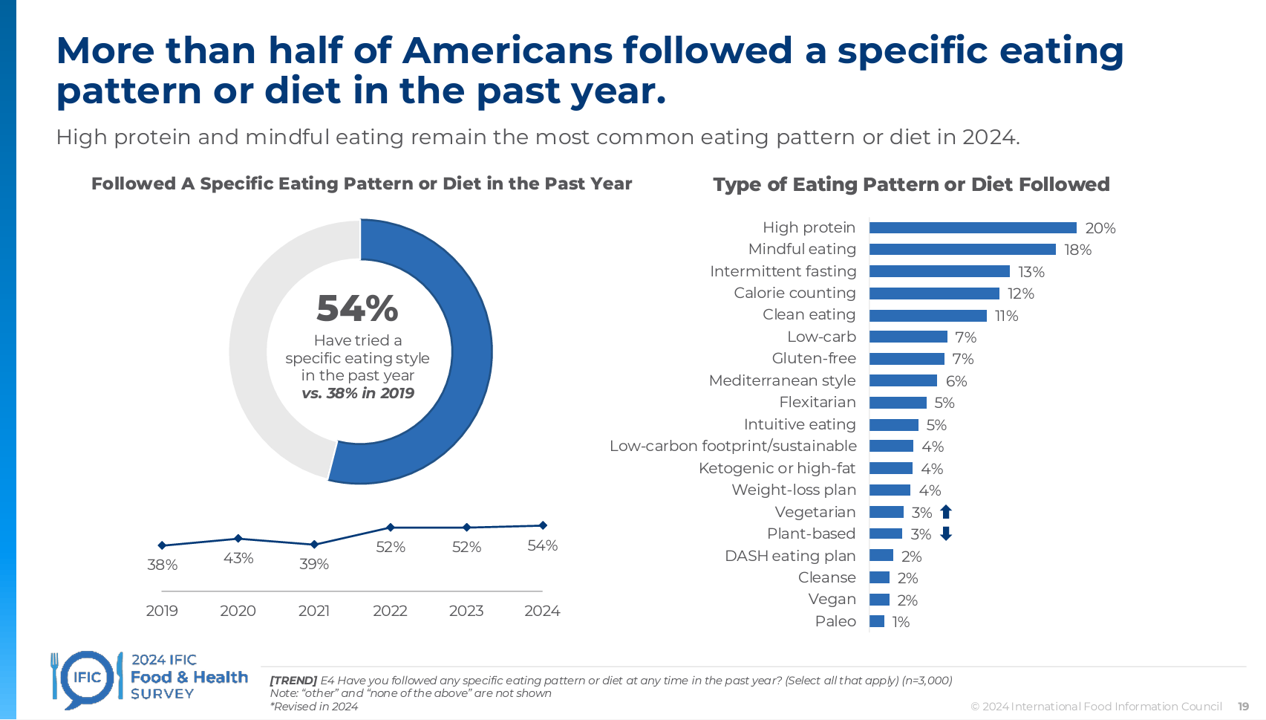
Most Americans follow some kind of eating regime, seeking energy, more protein, and healthy aging, according to the annual 2024 Food & Health Survey published this week by the International Food Information Council (IFIC). But a person’s household finances play a direct role in their ability to balance healthful food purchases and healthy eating, IFIC learned. In this 19th annual fielding of this research, IFIC explored 3,000 U.S. consumers’ perspectives on diet and nutrition, trusted sources for food information, and new insights into peoples’ views on the GLP-1 weight-loss drugs and the growing sense
How to Get Better Care to More People? Address Burnout, Bridge Insights with AI, Embed Sustainability – the Philips Future Health Index 2024
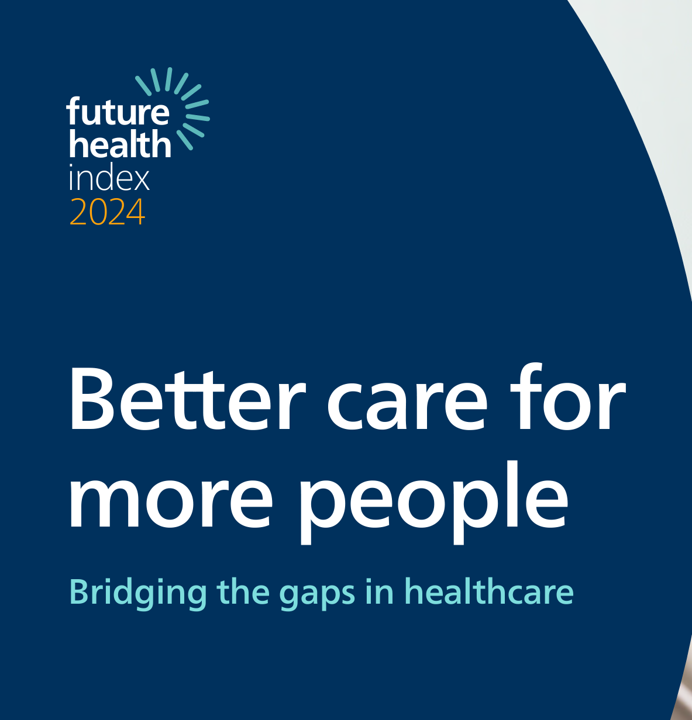
Health care access is a challenge in rural and urban areas, cities and suburbs, and across more demographic groups than you might realize, as we see wait times grow for appointments, primary care shortages, and delays in screening plaguing health systems around the world. In the Future Health Index 2024, Philips’ latest annual report presents a profile of the state of health care focused on how to provide better care for more people. For the report, Philips surveyed a total of 2,800 healthcare leaders consisting of 200 respondents in 14 countries: Australia, Brazil, China,
How AI Technology Could Be Eroding Consumers’ Trust in Health Care
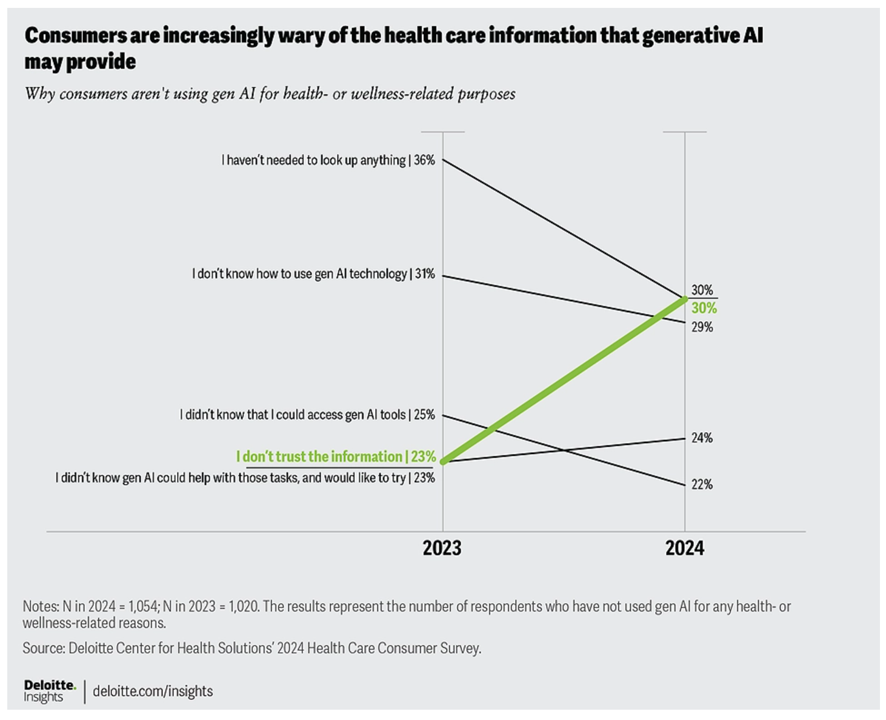
If people’s feelings about AI were a Wall Street market, we’d find both bulls and bears, simultaneously, viewing AI’s role in health care. We can see this from many consumer surveys published in the past year about the growing role and adoption of AI in health care, and some wariness found in a new study from Deloitte on Building and maintaining health care consumers’ trust in generative AI. Here’s the top-line from the Deloitte team, with particular growth in the question of trusting the information forming the AI for health or wellness related
The Thematic Roadmap for AHIP 2024: What the Health Insurance Conference Will Cover

Health insurance plans make mainstream media news every week, whether coverage deals with the cost of a plan, the cost of out-of-network care, prior authorizations, or cybersecurity and ransomware attacks, among other front-page issues. This week, AHIP (the acronym for the industry association of America’s Health Insurance Plans) is convening in Las Vegas for its largest annual 2024 meeting. We expect at least 2,400 attendees registered for the meeting, and they’ll not just be representing the health insurance industry itself; folks will attend #AHIP2024 from other industry segments including pharmaceuticals, technology, hospitals and health systems, and the investment and financial services
The ROI on Patient Experience = Loyalty, Trust and Revenue – Listening to Accenture
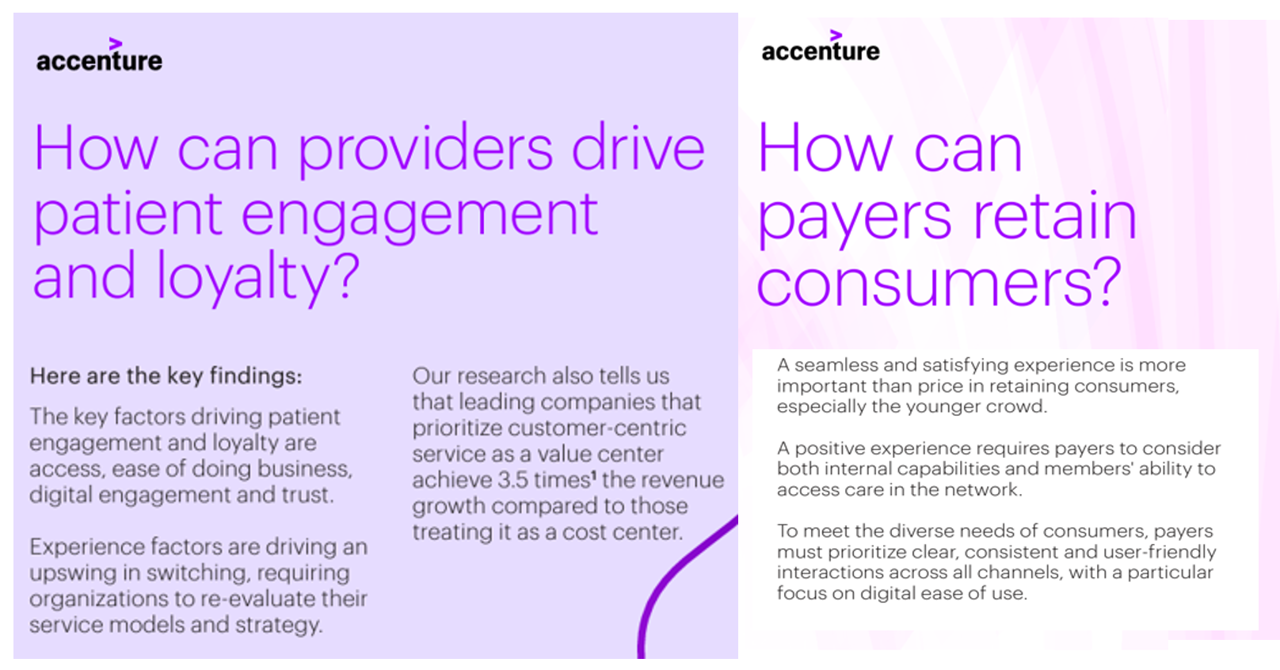
When health care providers and payers make patients’ lives easier, there’s a multiplying factor for loyalty and revenue growth, according to Accenture’s latest look into the value of experience in The Power of Trust: Unlocking patient loyalty in healthcare. Accenture conducted two surveys for this research, assessing nearly 16,000 U.S. adult consumers’ views on healthcare providers and health insurance plans. Several factors underpin patients’ selection of a new health care provider, especially: Access (70%), with a convenient location, quickly available appointments, digital/mobile/social interactions, and virtual care availability; and, The provider being a trusted source
Most Older People Want to Age in Place and Are Adopting Technologies At Home To Do So
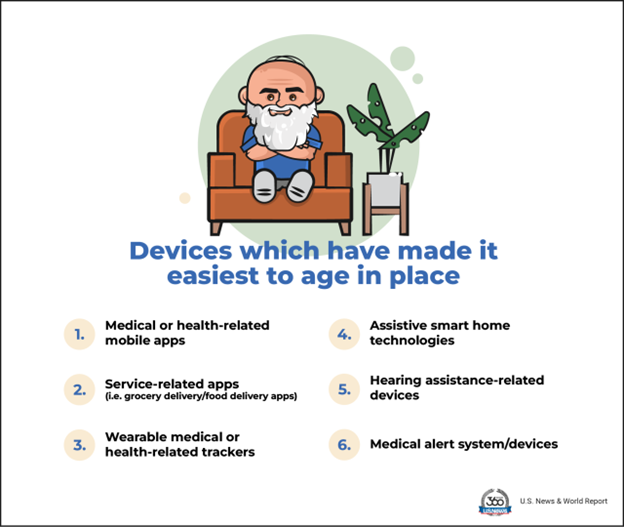
The vast majority of older people (95%) want to “age in place” — that is, stay put in their homes and avoid moving into long-term care residences or elsewhere. One approach for enabling aging-in-place is peoples’ adoption of various technologies, a topic surveyed by U.S. News & World Report. In April 2024, U.S. News interviewed 1,500 U.S. adults ages 55 and over on their views toward technology and everyday life at home. The first graphic from U.S. News’ study report, published earlier this month, shows that older people identified six categories of
Leveraging Trust, Showing Humility: How Health Care Organizations Can Serve Consumers – A New Read from McKinsey
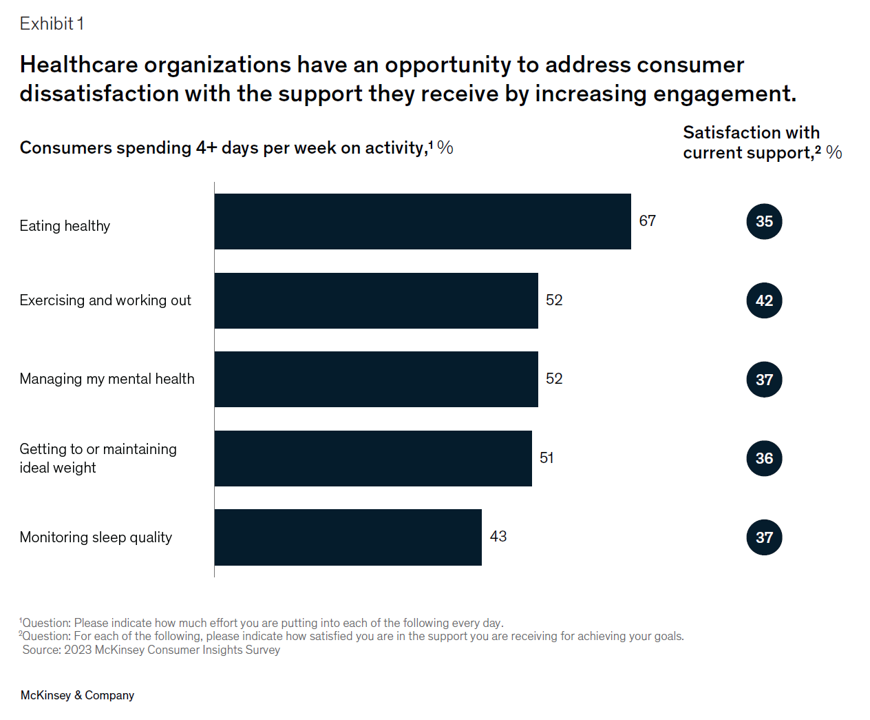
Three trends underpin health consumers’ evolving demands for service: spending more but getting less satisfaction and innovation; trusting health care with data but underwhelmed by the use of that personal information; and, growing “shopping” behavior seeking quality, availability, proximity, cost, and options across channels for health care. That’s the current read from McKinsey & Company’s team noting that Consumers rule: Driving healthcare growth with a consumer-led strategy. In this health consumer update, McKinsey spoke with three consumer marketing experts from other industries to learn best practices on how best to “be there”
Trust is a Superpower for Public Health – The 2024 Edelman Trust Barometer Through the Health Lens
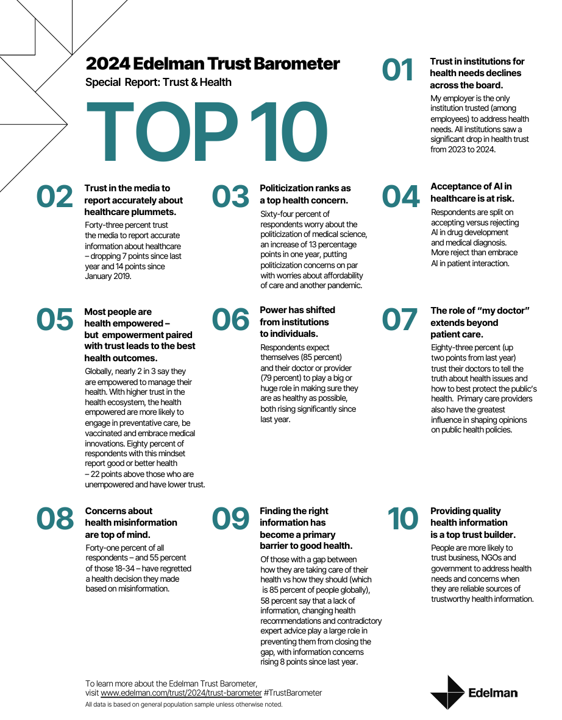
Less than 50% of people living in 16 countries do not trust government, media, or NGOs to do what is right to address their health needs and concerns, based on the responses from over 15,000 people living in 16 countries whose opinions are captured in the 2024 Edelman Trust Barometer’s Special Report on Trust and Health. Edelman launched the 2024 Trust Barometer earlier this year during the Davos World Economic Forum, and today released this round of research focused on health. Globally (among health citizens in the 16 countries polled in the study), trust for
Healthcare 2030: Are We Consumers, CEOs, Health Citizens, or Castaways? 4 Scenarios On the Future of Health Care and Who We Are – Part 2
This post follows up Part 1 of a two-part series I’ve prepared in advance of the AHIP 2024 conference where I’ll be brainstorming these scenarios with a panel of folks who know their stuff in technology, health care and hospital systems, retail health, and pharmacy, among other key issues. Now, let’s dive into the four alternative futures built off of our two driving forces we discussed in Part 1. The stories: 4 future health care worlds for 2030 My goal for this post and for the AHIP panel is to brainstorm what the person’s
Healthcare 2030: Are We Consumers, CEOs, Health Citizens, or Castaways? 4 Scenarios On the Future of Health Care and Who We Are – Part 1
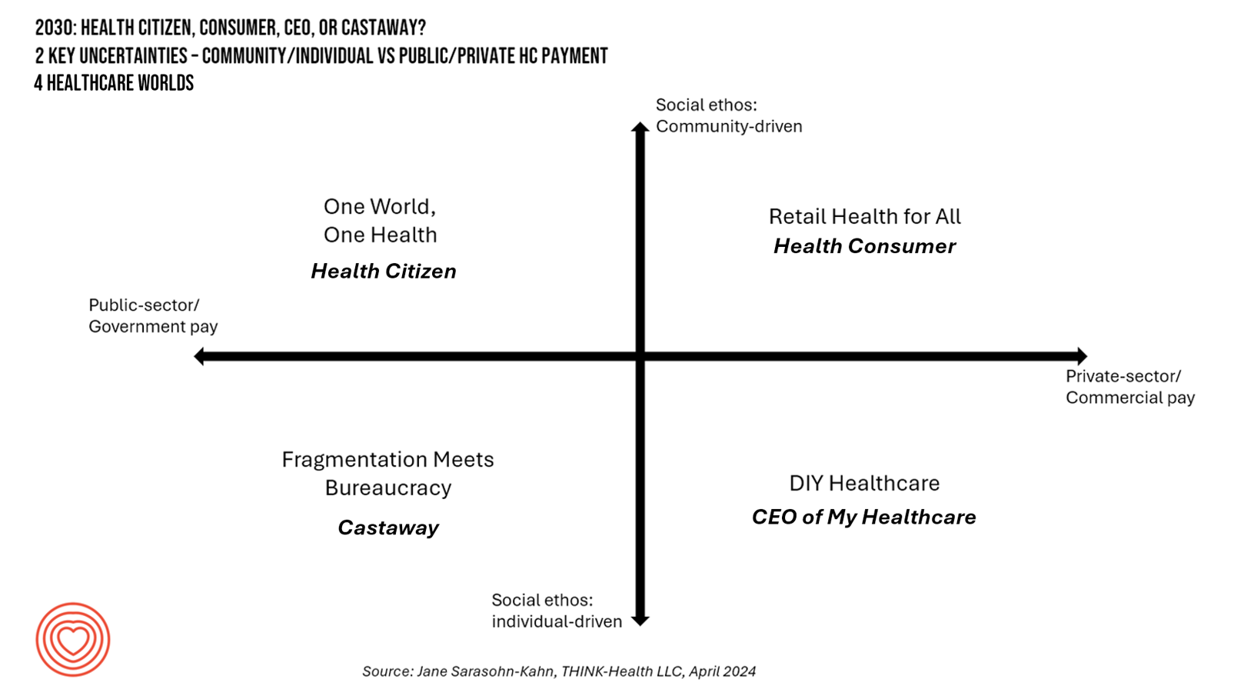
In the past few years, what event or innovation has had the metaphorical impact of hitting you upside the head and disrupted your best-laid plans in health care? A few such forces for me have been the COVID-19 pandemic, the emergence of Chat-GPT, and Russia’s invasion of Ukraine. That’s just three, and to be sure, there are several others that have compelled me to shift my mind-set about what I thought I knew-I-knew for my work with organizations spanning the health care ecosystem. I’m a long-time practitioner of scenario planning, thanks to the early education at the side of Ian
A Vote for Telehealth is a Vote for American Patients’ and Doctors’ Well-Being
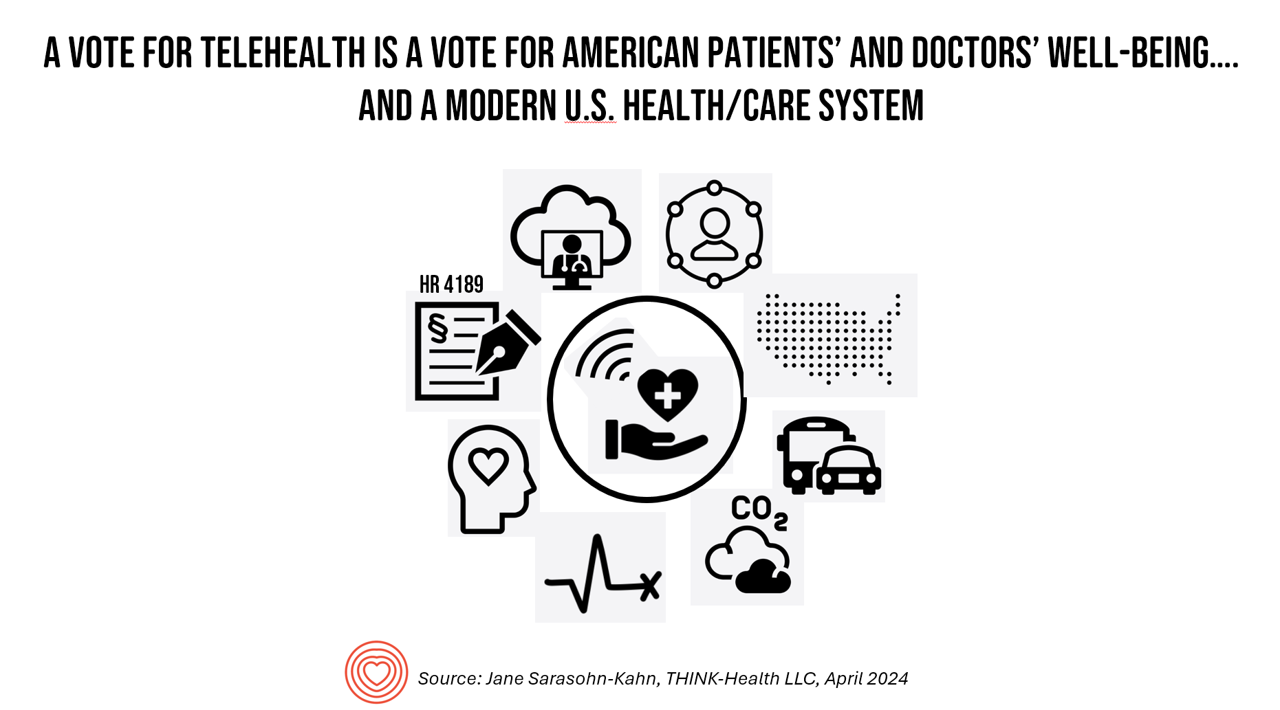
Whether you’re a patient or a physician in the U.S., you’re burned out, tapped out, stressed out, timed out. While the 118th U.S. Congress can’t agree on much before the 2024 summer recess, there’s one bipartisan stroke of political pens in Washington, DC, that could provide some satisfaction for both patients and doctors: bring telehealth back to patients and providers permanently. Those pens would do two things to modernize American health care for both patients and doctors: first, Congress would pass the CONNECT for Health Act (HR 4189. S 2016) and second, re-introduce and sign the Telehealth Modernization Act.
A Springtime Re-Set for Self-Care, From Fitness to Cozy Cardio: Peloton’s Latest Consumer Research

How many people do you know that don’t know their cholesterol or their BMI, their net worth or IQ, their credit score, astrological sign, or ancestry pie-chart? Chances are fewer and fewer as most people have gained access to medical records and lab test results on patient portals, calorie burns on smartwatches, credit scores via monthly credit card payments online, and completing spit tests from that popularly gifted Ancestry DNA test kits received during the holiday season. Meet “The Guy Who Didn’t Know His Cholesterol” conceived by Roz Chast,
The Self-Prescribing Consumer: DIY Comes to Prescriptions via GLP-1s, the OPill, and Dexcom’s CGM
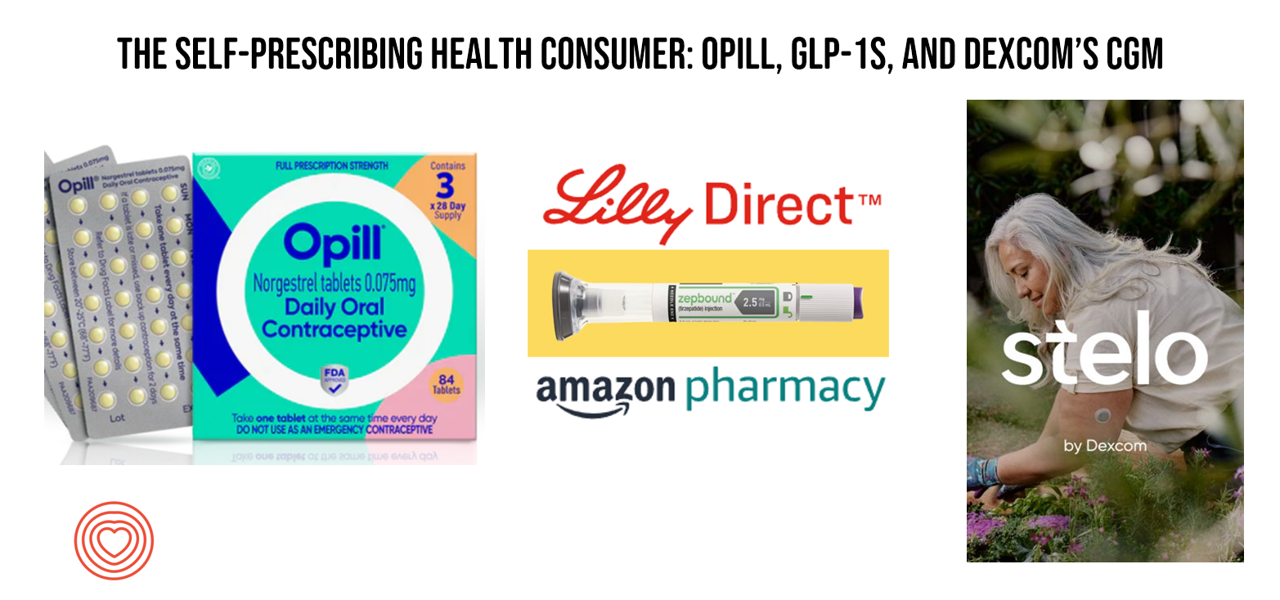
Three major milestones marked March 2024 which compel us to note the growing role of patients-as-consumers — especially for self-prescribing medicines and medical devices. This wave of self-prescribed healthcare is characterized by three innovations: the Opill, GLP-1 receptor agonists, and Dexcom’s Continuous Glucose Monitoring (CGM) system that’s now available without a prescription. Together, these products reflect a shift in health care empowerment toward patients as consumers with greater autonomy over their health care when the products and services are accessible, affordable, and designed with the end-user central to the value proposition and care flows. Let’s take a look at each
While Virtual Care is “Table Stakes” in Health Care, Consumers Are Growing More Protective About Data-Sharing
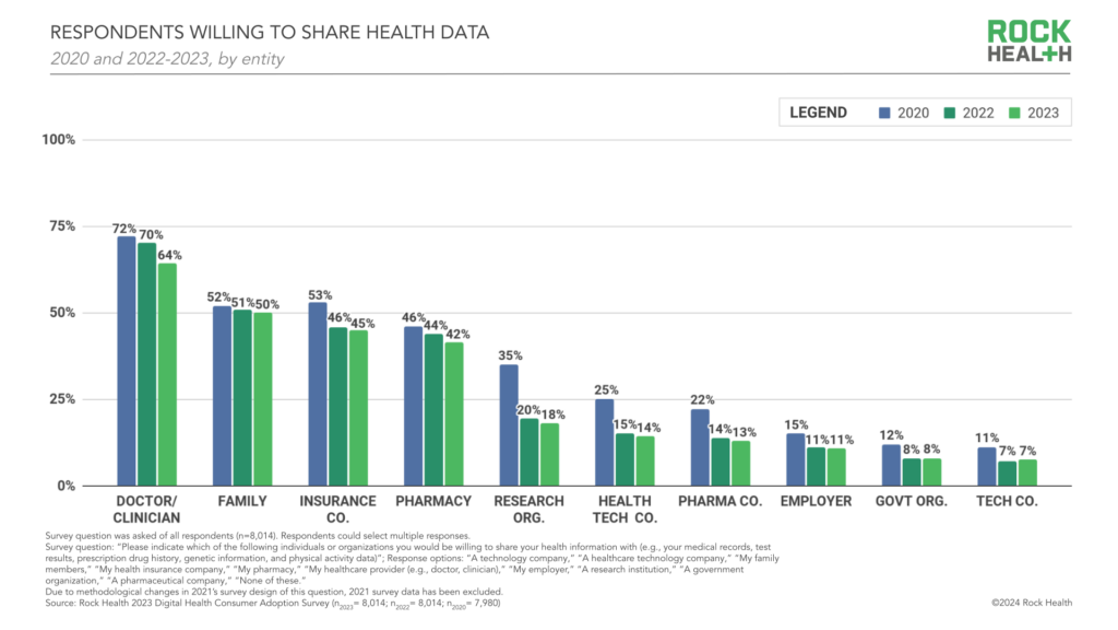
Three in four people in the U.S. have used virtual care, now, “Table-stakes…here to stay for patients and providers. However, that ubiquity comes with its own set of market pressures…shifting from pandemic-responsiveness to market- and consumer- responsiveness,” according to The new era of consumer engagement, Rock Health’s ninth annual Consumer Adoption Survey published 18 March. Convenience and waiting time are the top two reasons for choosing virtual over in-person care, Rock Health found. While virtual care is ubiquitous across the U.S. health care delivery landscape, patients-as-health care consumers are becoming more savvy and discriminating based
AI: Patients Included

“Clinical transformation with AI is easier without patients.” When Dr. Grace Cordovano heard this statement on a panel of physicians convening to share perspectives on the future of AI in health care held in early March 2024, the board-certified patient advocate felt, in her words, “insulted on behalf of the patient communities I know that are working tirelessly to advance AI that works for them.” “The healthcare ecosystem and policy landscape must formally recognize patients as end-users and co-creators of AI,” Cordovano wrote to me in an e-mail exchange. “Patients, their care partners, caregivers, and advocates are already utilizing AI
Hospital at Home: Prospects and Challenges, and Learnings from Best Buy Health
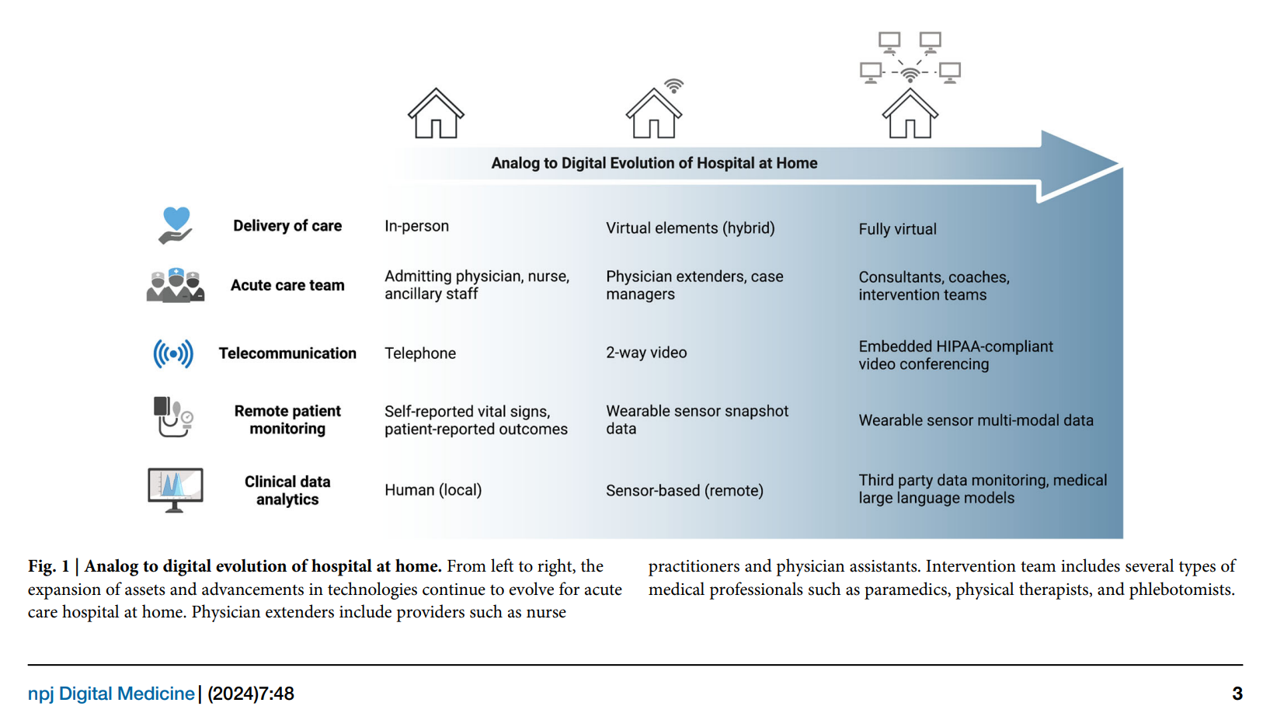
With the urgent need to identify more efficient and lower-cost health care delivery models, we look to growing evidence for digital health technologies that support the Hospital at Home (HaH) model, considered in a new review article published in late February in npj Digital Medicine, The hospital at home in the USA: current status and future prospects. Clinicians from Scripps Research and Johns Hopkins School of Medicine collaborated on this work, calling out the relatively fast adoption of HaH programs during the peak of the COVID-19 pandemic. In some parts of the world, such as Australia and Norway, “in-person at-home
How AI is Shaping the Patient and Clinician Experience – My Conversation with Microsoft
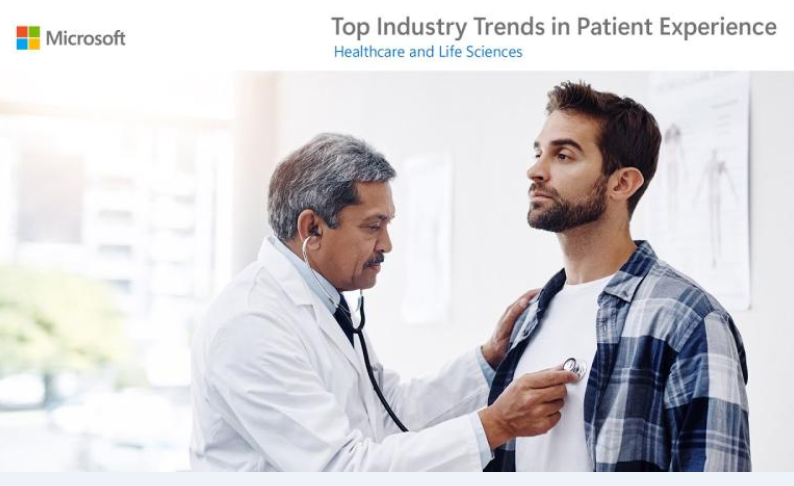
For change agents in health care, one of our True North paradigms is the Quintuple Aim. The five pillars of the Quint Aim grew from 3 goals of the Triple Aim: to improve patient experience, to drive better health outcomes, and to lower per patient costs. The Quadruple Aim added the goal of bolstering clinicians’ well-being (to address burnout, stress and depression), leading to the addition of health equity as the fifth objective. That happened in 2021, in the height of the COVID-19 pandemic which shined a bright light on health disparities, inequities, and risks in peoples’ social determinants of
Rebel Health: The Personal and Professional Passion of Susannah Fox
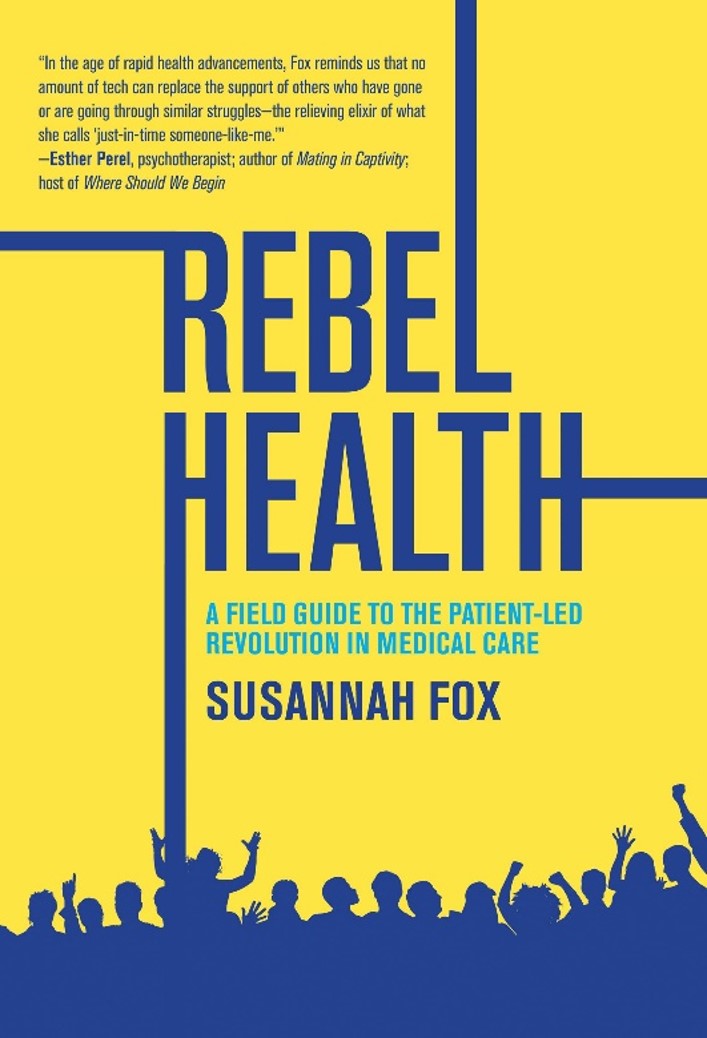
A “rebel” is both a noun and a verb. As a noun, Merriam-Webster tells us that a rebel is a person who opposes or takes up arms against a government or a ruler. As a verb, “to rebel” is to oppose or disobey one in authority or control, or otherwise renounce and resist by force the authority of one’s government.” An additional definition of the verb is, “to feel or exhibit anger or revulsion.” If you’ve been a patient facing a diagnosis of an illness, whether rare or common, you may well have felt these various feelings stirring inside your self.
Ethics for AI in Health – A View From The World Health Organization
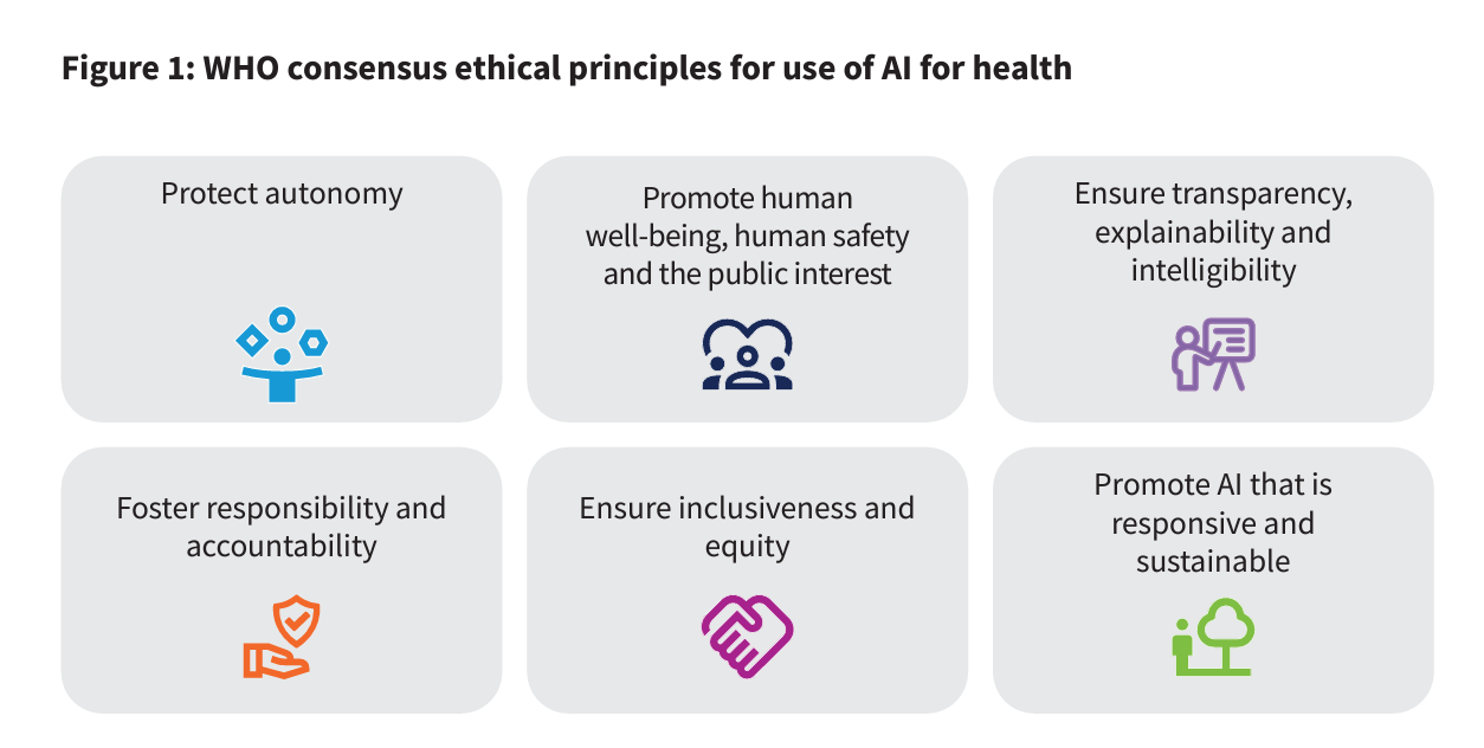
For health care, AI can benefit diagnosis and clinical care, address paperwork and bureaucratic duplication and waste, accelerate scientific research, and personalize health care direct-to-patients and -caregivers. On the downside, risks of AI in health care can involve incomplete or false diagnoses, inaccuracies and errors in cleaning up paperwork, exacerbate differential access to scientific knowledge, and exacerbate health disparities, explained in the World Health Organization’s (WHO) report, Ethics and governance of artificial intelligence for health. WHO has released guidance on the use of large multi-modal models (LMMs) in health care which detail 40+ recommendations for
Why Elevance Health is “Prescribing” Phones for Members
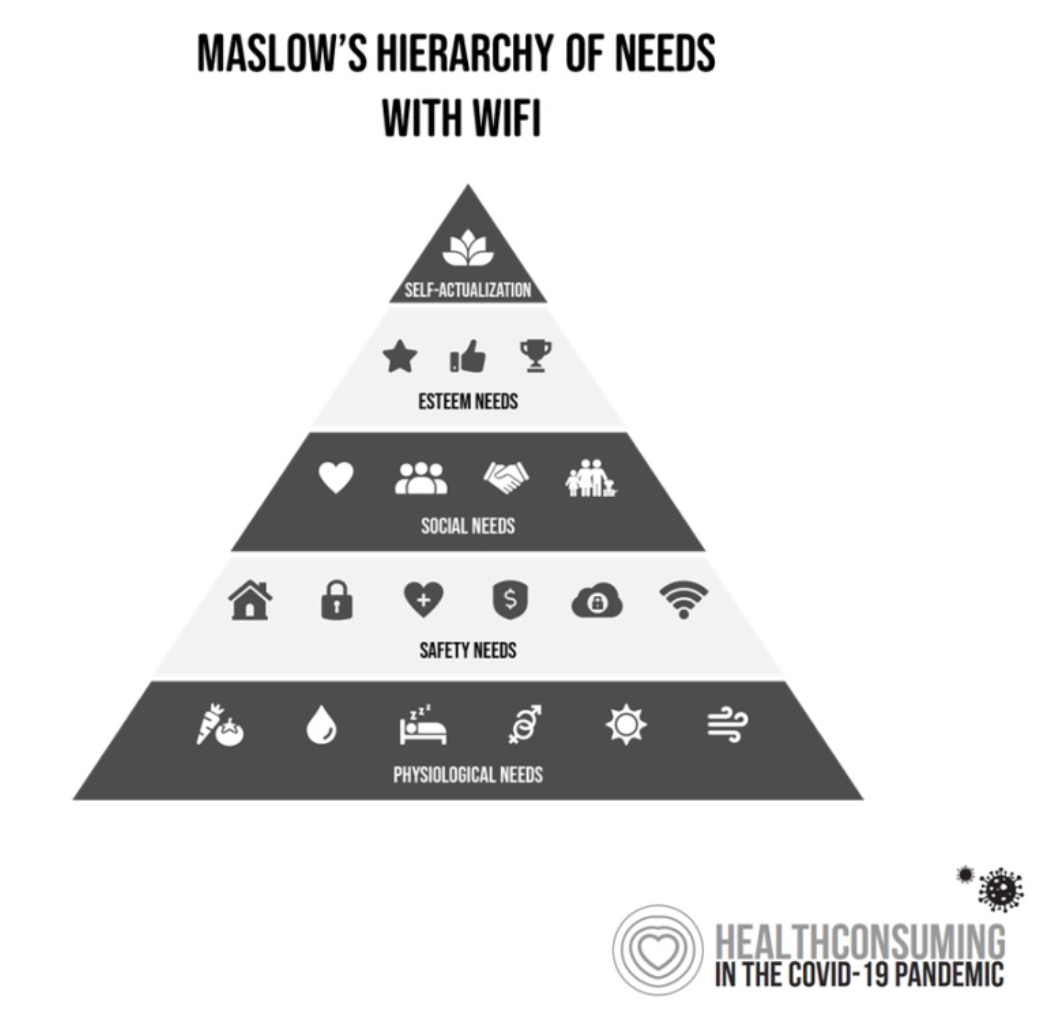
You’ve heard of food-as-medicine and exercise-as-medicine. Now we see the emergence of telecomms-as-medicine — or more specifically, a driver of health, access, and empowerment. Elevance Health, the health plan organization serving 117 million members, launched a program to channel mobile phones and data plans into the hands of some Medicaid plan enrollees, explained in the organization’s press release on the program. To implement this program and get connectivity into consumers’ hands and homes, Elevance Health is collaborating with several telecomms companies including Verizon, AT&T, Samsung, and T-Mobile. Funding is supported by the FCC’s Affordable Connectivity Program.
Access to Technology Is the New Pillar for Well-Being: CES & the UN Partner for Human Security for All
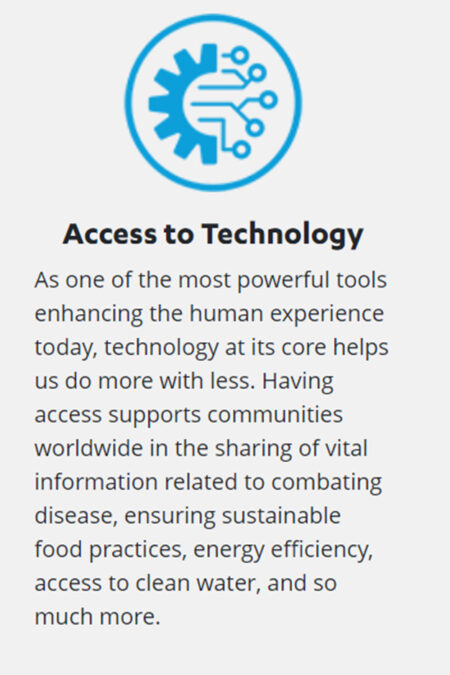
In kicking off #CES2024, CTA’s researchers noted the acceleration of global connectivity, with gaps in peoples’ ability to connect depending where they live: by region, the percent of people connected to the internet today are, according to CTA’s data, 92% in the U.S. 87% in the E.U. 76% in Latin America 73% in China 55% in Nigeria 46% in India. Such gaps in connectivity threaten peoples’ individual well-being, but also social and political stability that impacts the entire world’s security. And not to overlook, as well, the promise of AI to do good at scale at the enterprise-level, globally.
Mainstreaming the Connected Life, with a Side of Trust — Insights from Capgemini at the Start of #CES2024
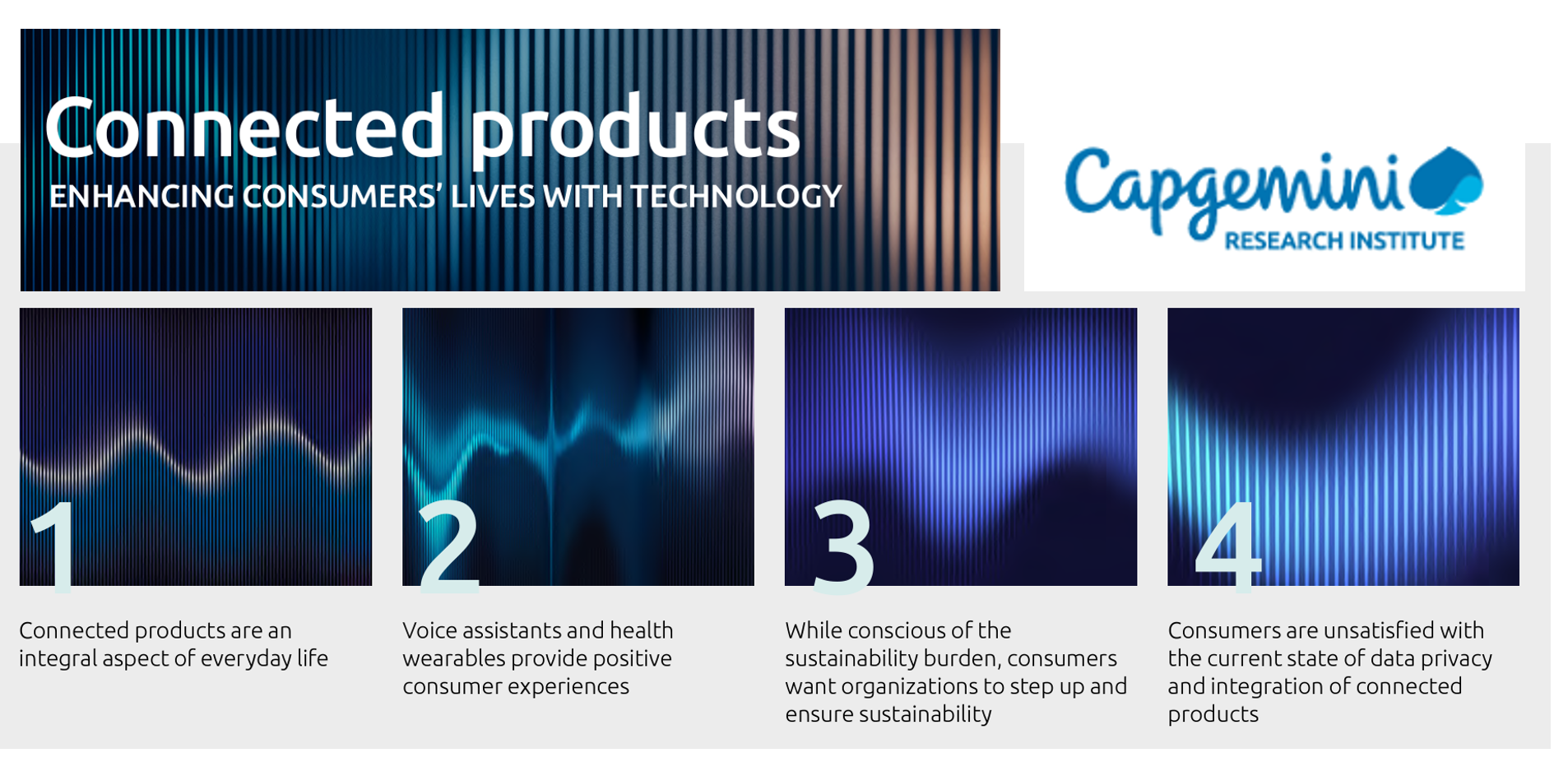
Even with serious concerns about personal data privacy and lack of integration, “connected products” are an integral aspect of peoples’ everyday lives. That’s the central thesis in a timely report from Capgemini Research Institute, Connected products: Enhancing consumers’ lives with technology. This study is well-timed as we begin a week-long exploration into the latest technology innovations being unveiled at CES 2024, the annual mega-conference hosted by the Consumer Technology Association (CTA). For the consumer research, Capgemini’s team polled the perspectives of 10,000 consumers age 18+ in November, among people from 13 countries: Australia, Canada, France, Germany,
Consumers’ Spending on Tech in 2024 Will Increase: CTA’s #CES2024 Forecast
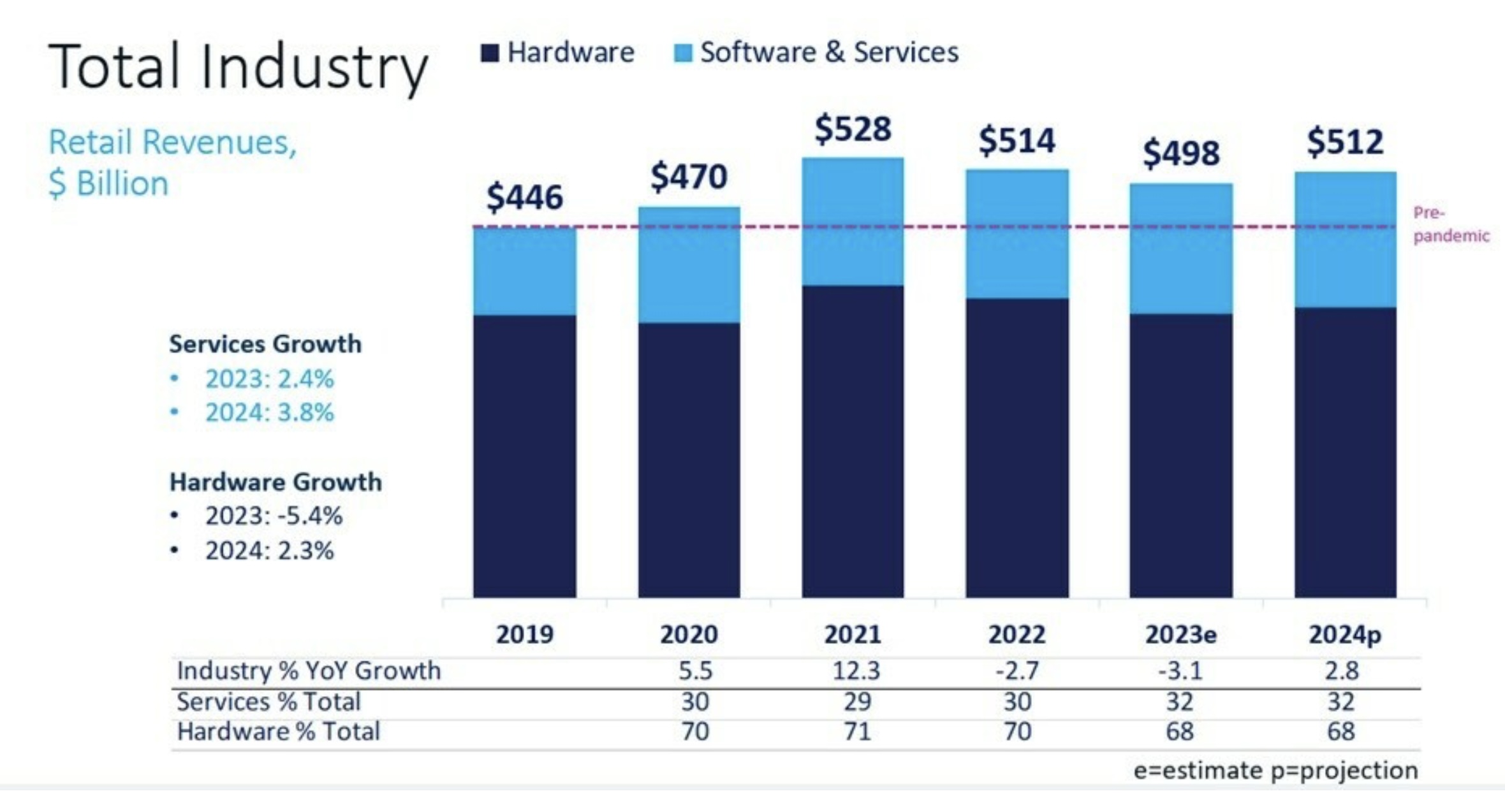
2023 was a pretty lackluster year for consumers’ spending on technology: inflation, concerns about global instability, and general household economic ennui caused consumers to ration spending on most electronic gadgets last year. Enter a more cash-positive mood for many consumers keener in the new year to acquire updated and upgraded tech, from computer hardware to wearable tech for health, according to the forecast released by the Consumer Technology Association (CTA) research team. The study results, announced on the first of two pre-conference Media Days, kicks off CES 2024 convening this week in Las Vegas. The bullish spending statistics reverse a two-year
What to Expect For Health/Care at CES 2024
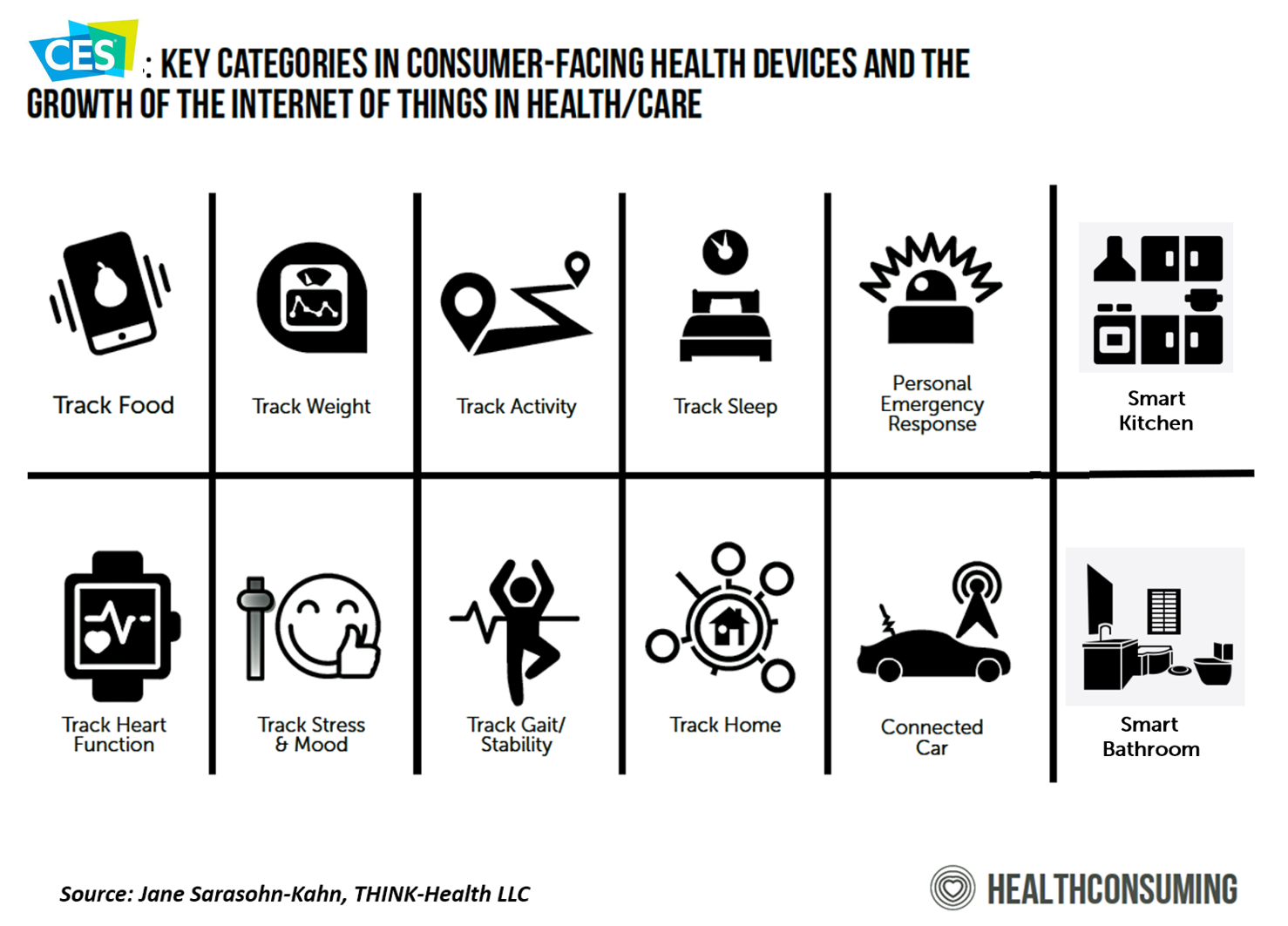
Not known for its salubrious qualities, Las Vegas will nonetheless be a locus for health, medical care, and well-being inspiration next week when the Consumer Technology Association convenes the annual CES featuring innovations in consumer technology. Ten years ago here in Health Populi, I wrote about New Year’s Resolutions for Health and the 2013 Consumer Electronics Show. Then, one-third of consumers were keen to buy health tracking technology but most of those people were healthy, CTA’s research found. I talked about the “battle of the (wrist)bands” witnessed at CES 2013, and spotted the
Technology Is Playing a Growing Role in Wellness and Healthy Aging – AARP’s Latest Look Into the 50+ Tech Consumer
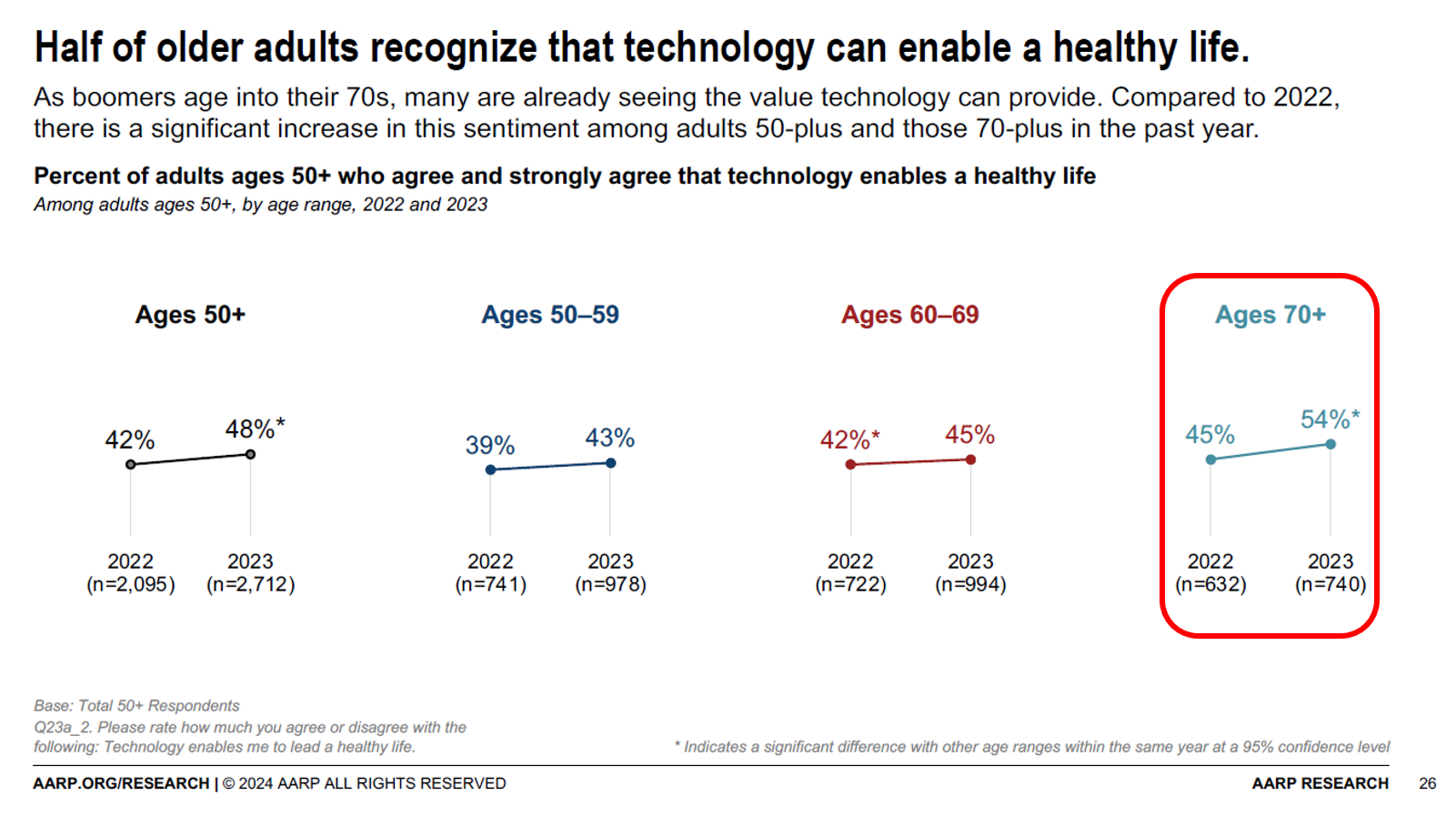
Most people over 70 years of age recognize technology’s role in supporting peoples’ health, we learn from a new report on 2024 Tech Trends and Adults 50+ from AARP. But adoption and ongoing use of digital innovations among older people will be tempered without attending to four key barriers that carry equal weight in the minds of 50+ consumers: design and user experience, awareness and interest, cost and acquisition, and trust and privacy concerns. [Spoiler alert: in the Hot Points, below, I add a fifth consideration: health equity + dignity]. To gauge older Americans’ views on
The Health Consumer in 2024 – The Health Populi TrendCast
At the end of each year since I launched the Health Populi blog, I have put my best forecasting hat on to focus on the next year in health and health care. For this round, I’m firmly focused on the key noun in health care, which is the patient – as consumer, as Chief Health Officer of the family, as caregiver, as health citizen. As my brain does when mashing up dozens of data points for a “trendcast” such as this, I’ll start with big picture/macro on the economy to the microeconomics of health care in the family and household,
The Consumerization of AI in Healthcare – The Early Days of AI-Trust
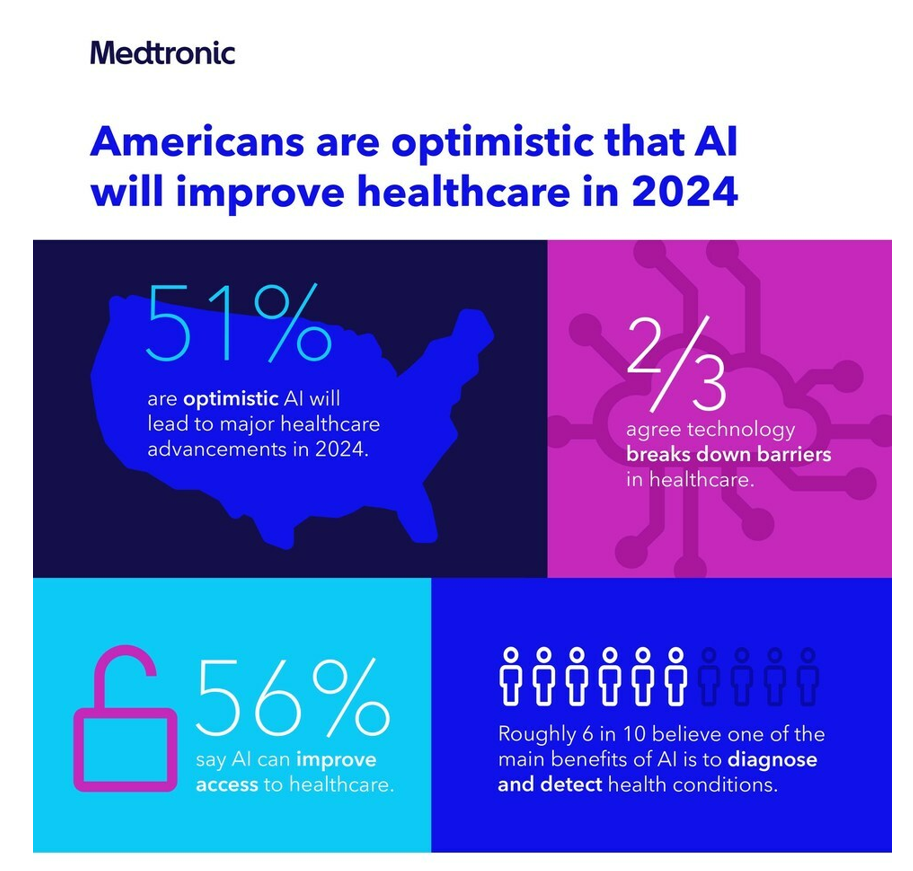
Most people in the U.S. are bullish on the role AI will play in health care in 2024, especially to lower access barriers to care and to diagnose and detect health conditions. Two new studies point to the consumerization of AI in healthcare, from Medtronic and Deloitte. This post weaves their findings together and suggests some planning points for 2024. Medtronic collaborated with Morning Consult to poll 2,213 U.S. adults in late September 2023 to gauge peoples’ perspectives on AI and health care. With such optimism among health consumers comes some
Workforce Shortages and Health Care Cost Pressures Inspire RSNA 2023 (and yes, AI’s in the mix, too)

Radiology and radiologists play starring roles in our health care, with he core work flow of diagnostic imaging supporting prevention, disease detection, diagnosis, delivering and monitoring therapy, linking specialists to other providers in telehealth, and as a medium for teaching clinicians, patients and caregivers. As health care delivery continues to change and adapt to technological innovations, demographic shifts, and economic-social-political forces, so, too, are the roles of radiology and radiologists in motion. Every year when American Thanksgiving weekend comes along, you’ll find folks involved in digital imaging flocking to chilly Chicago to convene at McCormick Place for
A Digital Health Checkup for the US – #1 in AI, Meh in Interoperability – An OECD Update
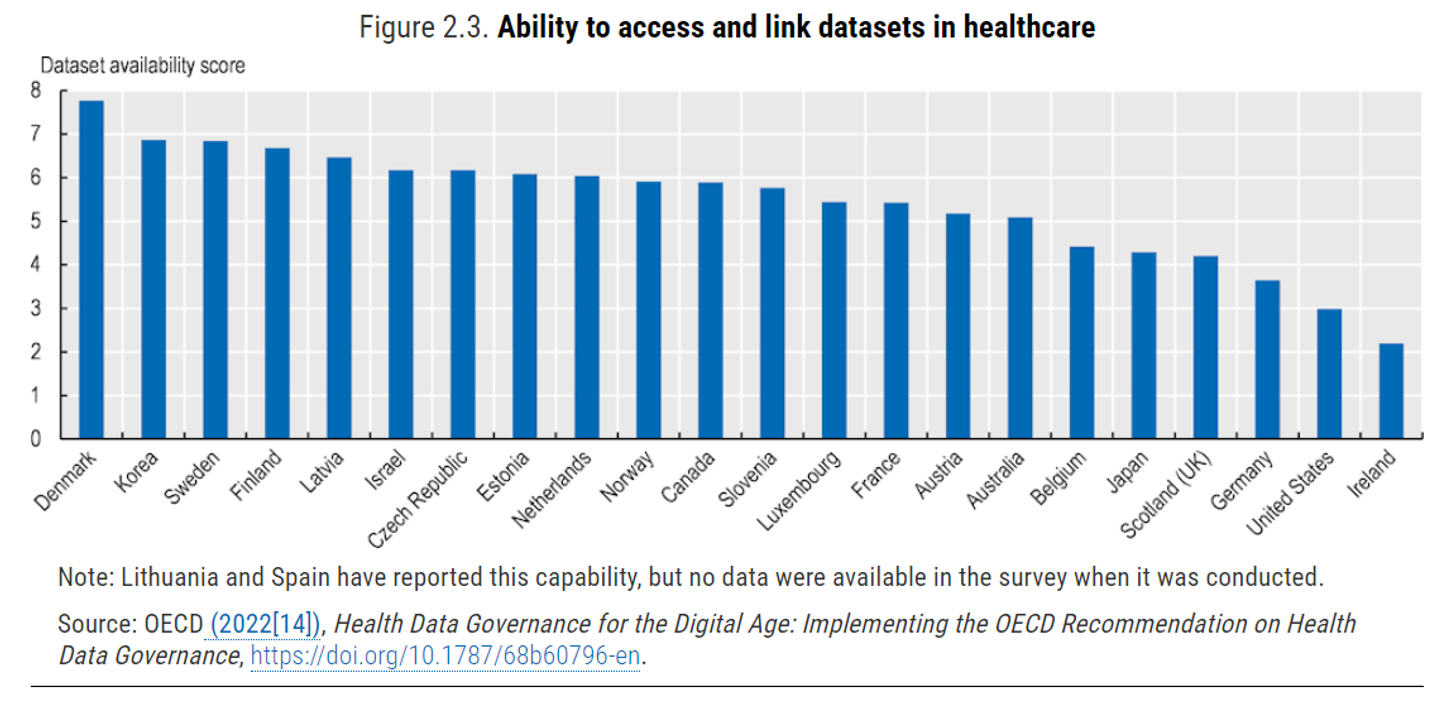
While health care has been slower than other industries to leverage digital transformation, COVID-19 accelerated change — revealing some key barriers blocking the potential for more fulsome transformation, the OECD explains in its latest version of Health At A Glance for 2023 with a detailed chapter on “digital health at a glance.” The OECD report assesses digital health maturity across 22 countries: in addition to the U.S., the report provides details digital health traits in (alphabetically) Australia, Austria, Belgium, Canada, Czech Republic, Denmark, Estonia, Finland, France, Germany, Ireland, Israel, Japan, Korea,
“My Doctor’s Office” Should Accept Wearable Tech Health Data, Most Patients Say
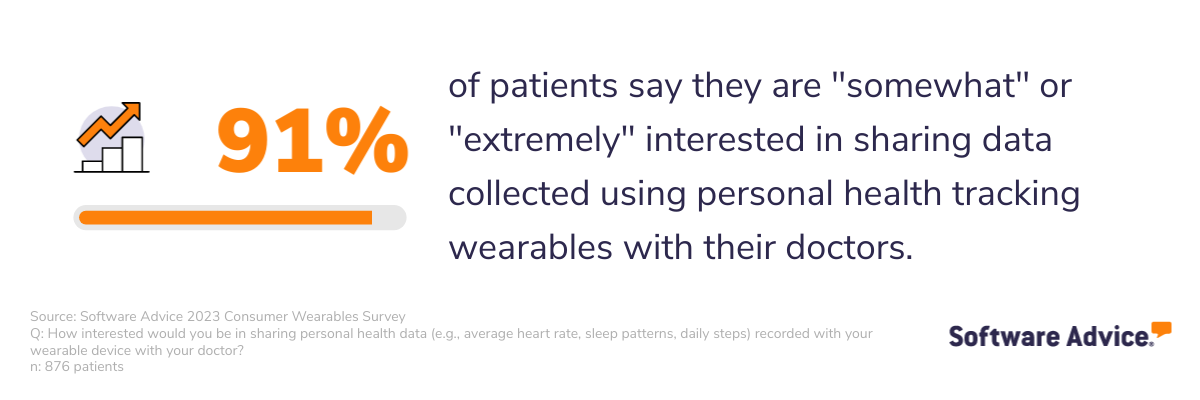
“Do personal health trackers belong in the doctor’s office?” Software Advice wondered. “Yes,” the company’s latest consumer survey found, details of which are discussed in a report published on their website. Unique to this study is the patient sample polled: Software Advice surveyed 876 patients in September 2023 to gauge their perspectives on wearable tech and health. Note that the patient sample was limited to consumers who had seen a health care provider in the past two years and who also owned and used a personal wearable health device such as an Apple Watch or Fitbit. Thus, the responses shared
Clinician Burnout – Lessons from BDO’s Clinician Experience Survey for Patient Experience and Primary Care
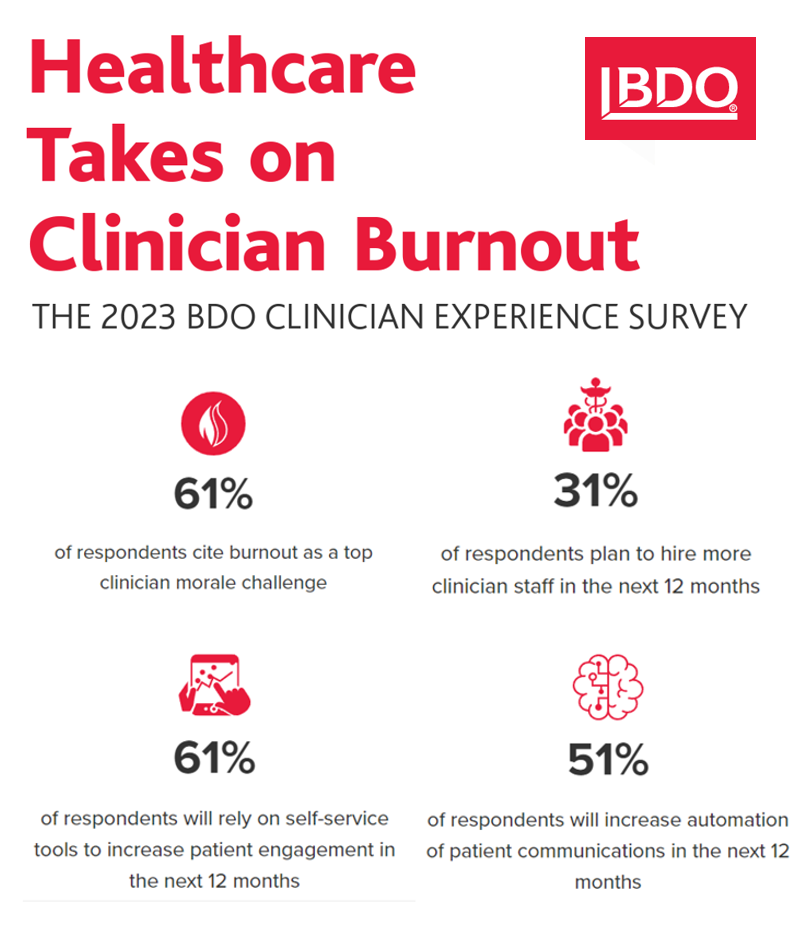
Clinicians’ feeling burnout is the top morale challenge facing U.S. doctors, driven by turnover and understaffing, compassion fatigue, and challenges using digital tools — think EHRs. The 2023 BDO Clinician Experience Survey “takes on” clinician burnout, connecting the strategic dots between the clinician experience and the patient experience. BDO surveyed 153 clinician leaders in June and July 2023; one-half of the clinicians were executive leaders, and one-fourth were each direct clinician providers and clinician directors. Roles reached into the C-suite (one-third), and other levels in their organizations.
What If We Built a Consumer-Enchanting Health System in the Context of HLTH 2023? Building Blocks for the Scenario
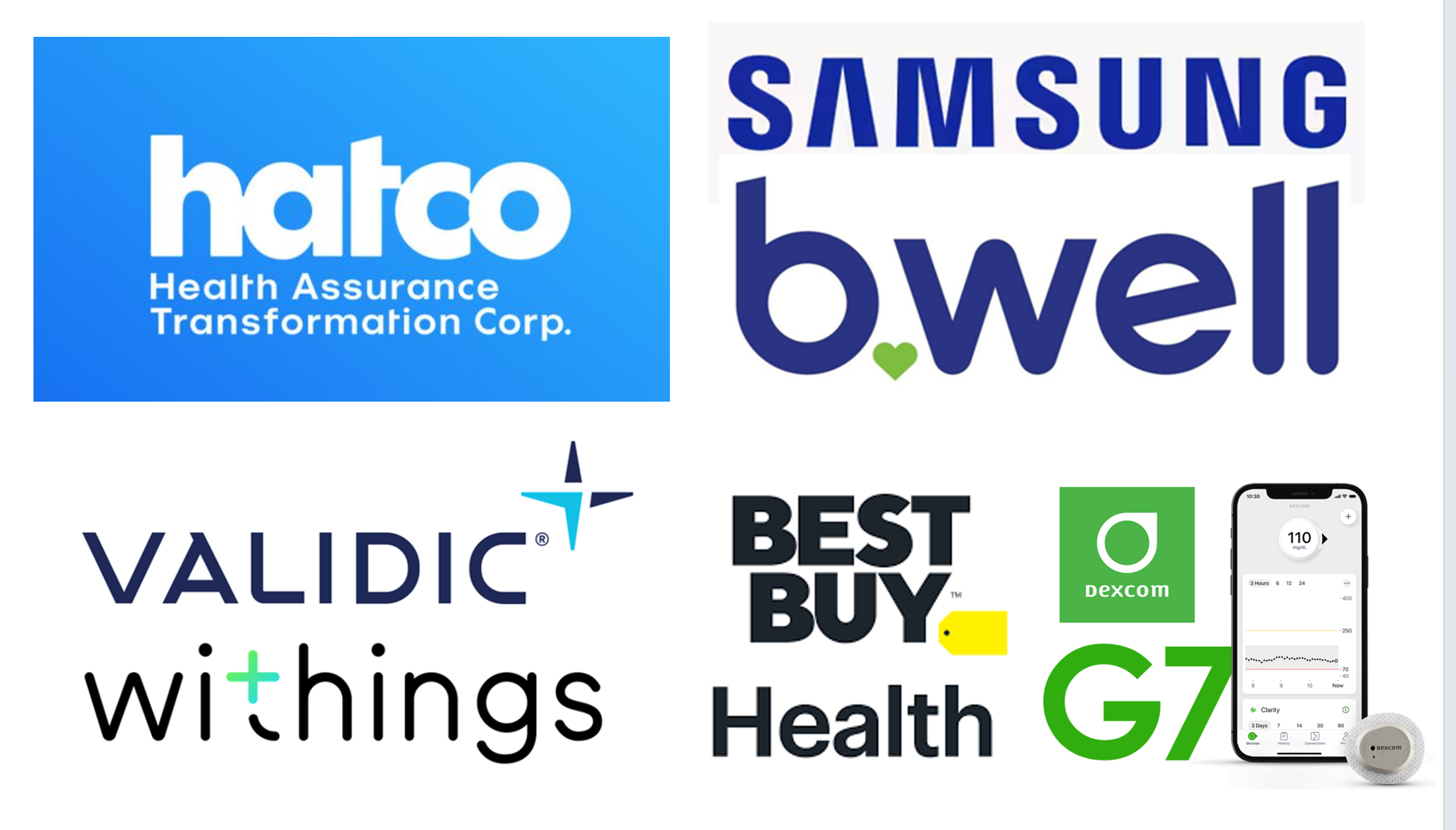
What if….you were given the opportunity to build a health system from scratch in this new era of platforms, cloud computing, AI and machine learning, curious-digital-empowered consumers, and collaborators in retail and community settings operating close to peoples’ homes and workplaces? With the HLTH 2023 Conference meeting up in Vegas these past couple of days, this “what if” scenario can be constructed with announcements coming out of the meeting, coupled with recent developments in the larger health/care ecosystem. Start with General Catalyst’s news of engaging Dr. Marc Harrison, most recently CEO of Intermountain Health,
Nurses Hacking for Health, Addressing Burnout, Workplace Violence, and AI
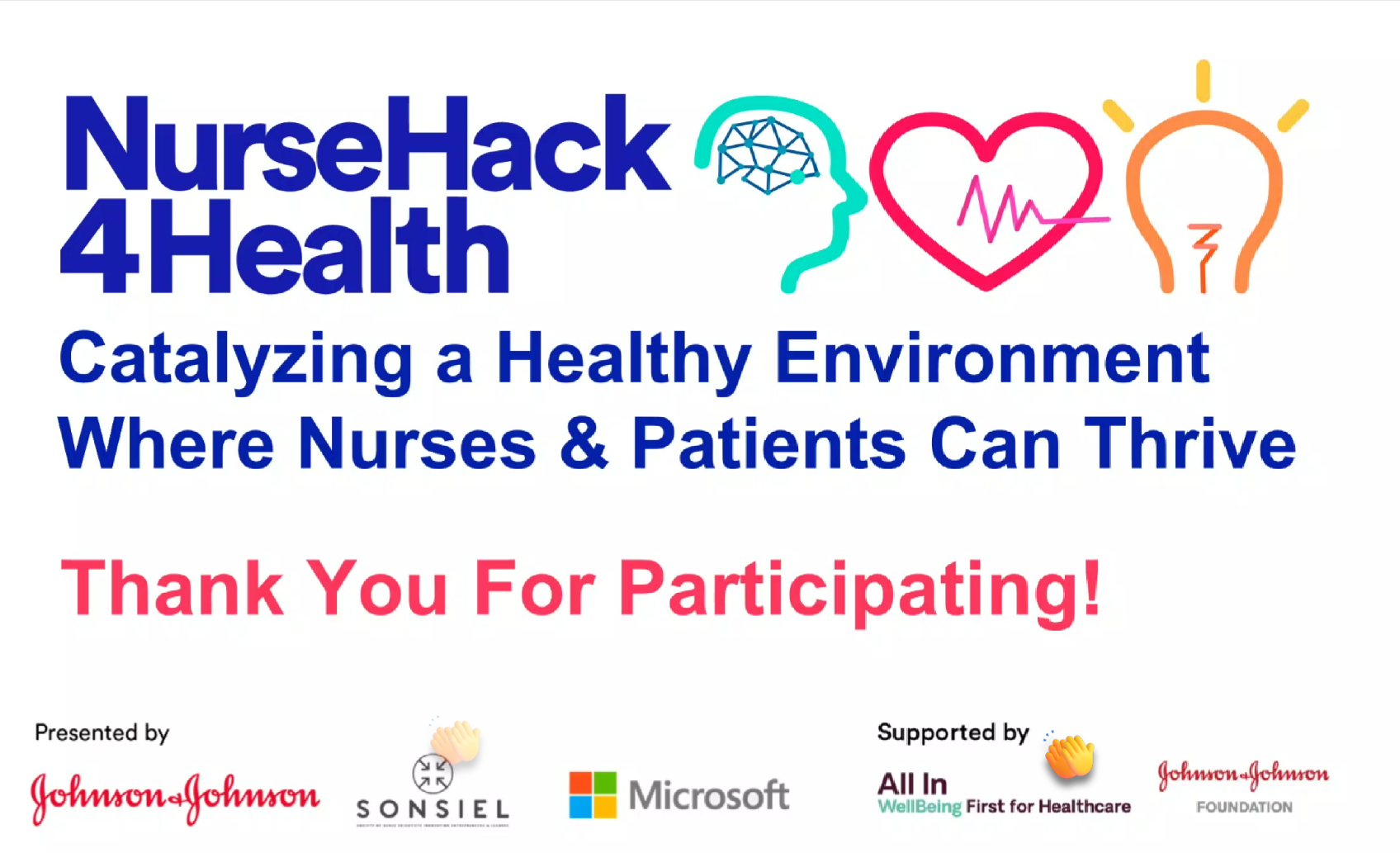
Three in four nurses working in hospitals care about the success of their institution — “they show up and gown up…yet only 57% feel a sense of ownership in their hospitals, leaving leaders to expect 100% quality to be delivered by about half of the nursing workforce.” This is the key finding in a study from PRC on the implications of nurses’ dis-engagement from their work. That context puts this year’s NurseHack4Health event all the more essential and impactful. This year’s virtual hackathon was sponsored by Johnson & Johnson, SONSIEL, Microsoft, and the ALL
The Omnichannel Imperative for Healthcare: Supporting Telehealth Awareness Week 2023
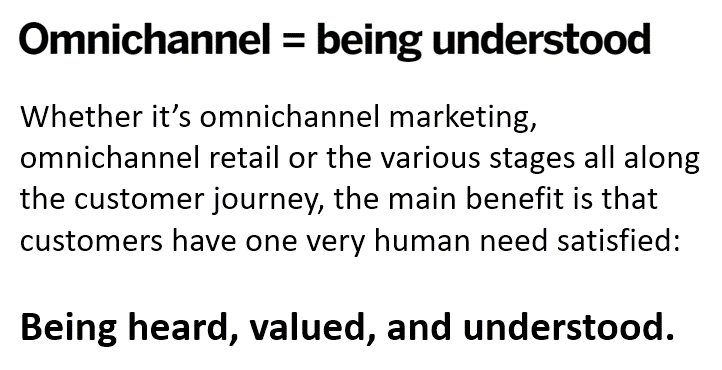
“What omnichannel really means: hearing the customer wherever they are and making them feel heard, valued, and understood.” That statement comes from Qualtrics’ explanation of omnichannel experience design. The very human needs of feeling one is heard, is valued, and is understood, underpin the rasion d’etre of omnichannel marketing. And these very values are those that underpin the trust between patients and providers and the large healthcare ecosystem. It’s Telehealth Awareness Week, led by the ATA. I celebrate and support the effort; this Health Populi post explains the Association’s mantra that Telehealth is Health, and that
Consumers Continue to Spend on Technology, Seeking “A Happy, Healthy Connected Life”
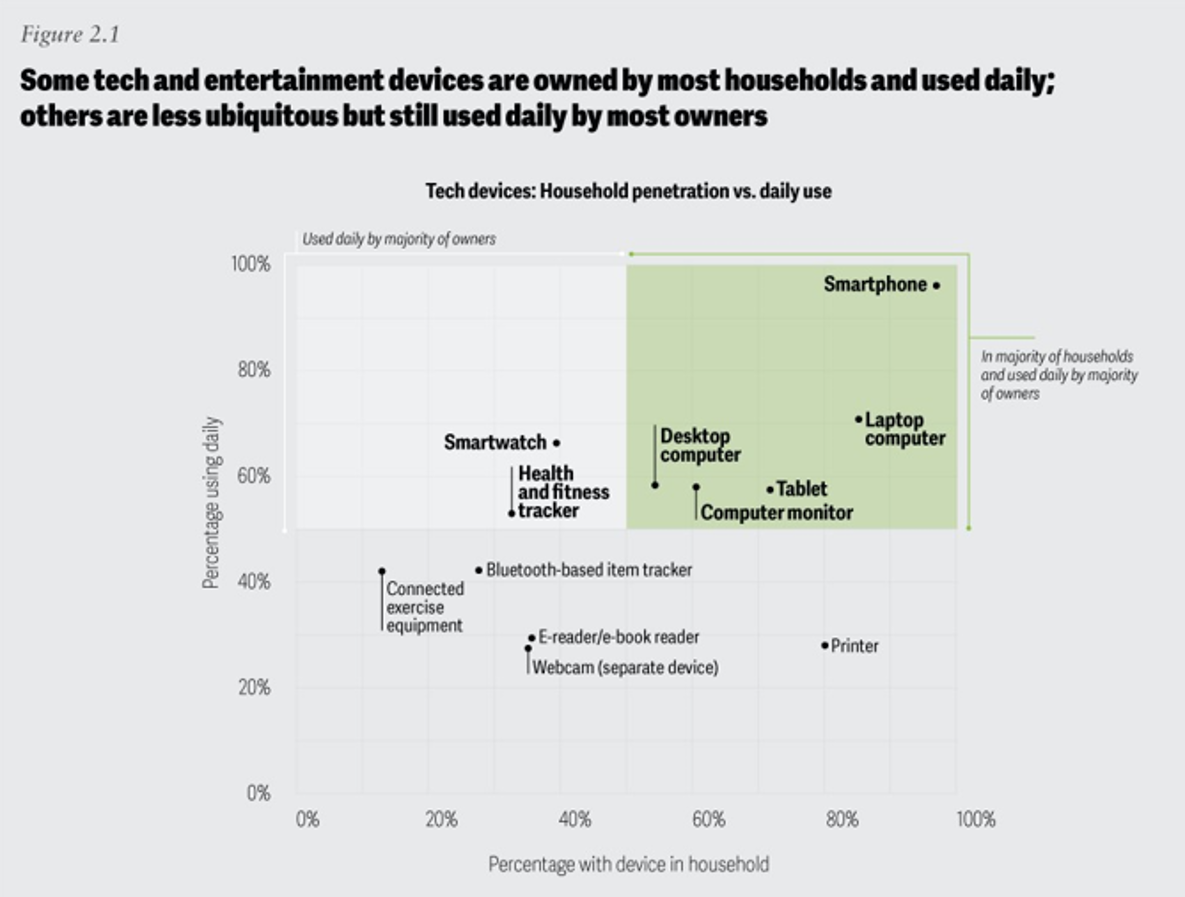
Most U.S. consumers will continue to spend their disposable incomes on connected consumer devices, but will be looking for more balance in their digital lives according to Deloitte’s fourth annual 2023 Connected Consumer Survey. In this year’s update, the Deloitte Center for Technology, Media & Telecommunications found that most households use five key digital devices daily: above all, smartphones, followed by laptop and desktop computers, tablets, and computer monitors. Most consumers who own smartwatches and health and fitness trackers also use those devices every day, as shown in the household penetration/usage chart
Large Employers Expect More Employees Will Experience Prolonged Health Impacts Due to COVID-19. and a Note About Telehealth Engagement
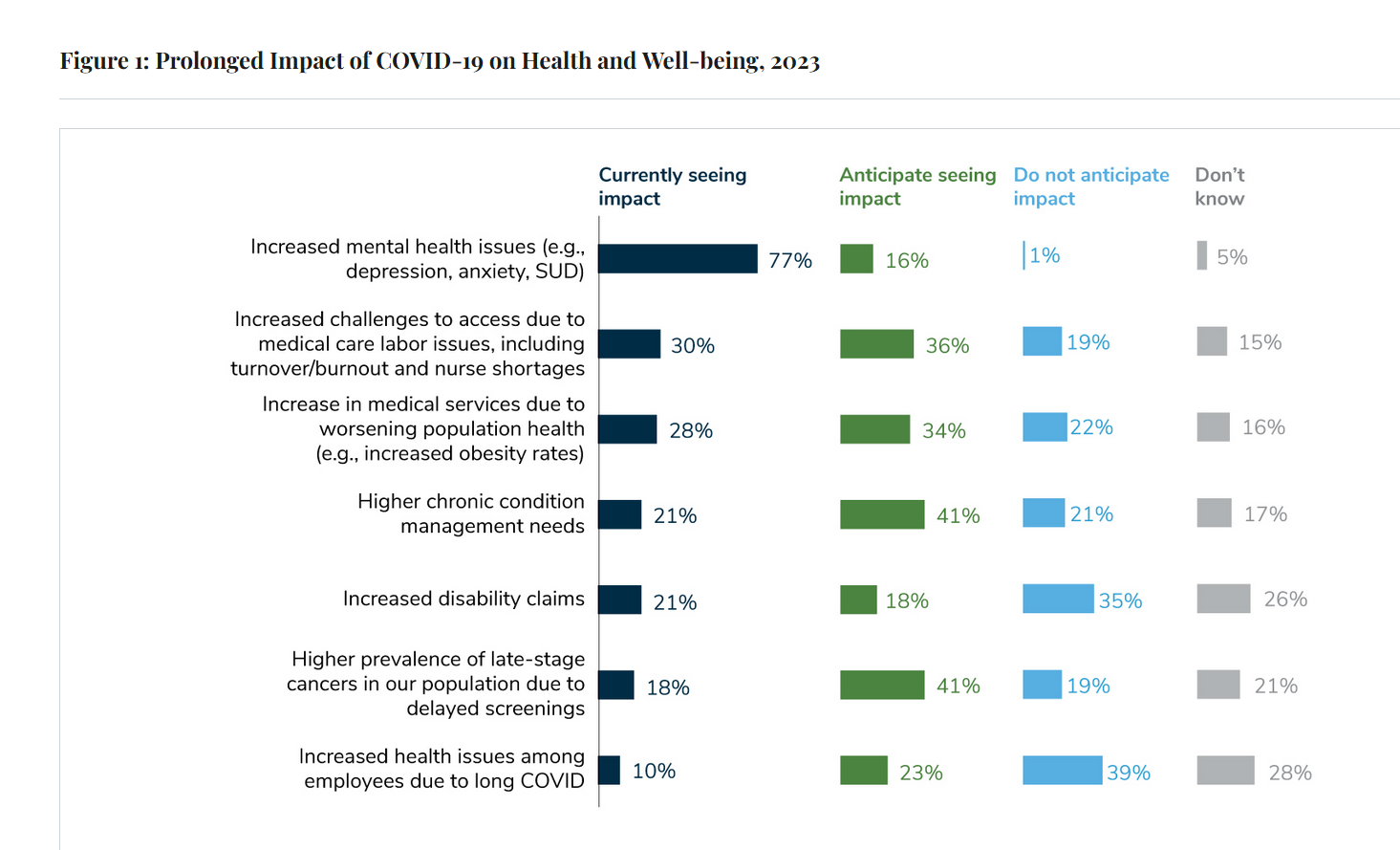
Due to their delayed return to medical services and diagnostic testing in the COVID-19 pandemic era, U.S. employees are expected to sustain serious health impacts that will drive employers’ health care costs, envisioned in the 2024 Large Employer Health Care Strategy Survey from the Business Group on Health (BGH). Dealing with mental health issues is the top health and well-being impact workers in large companies are addressing in 2023. Looking forward, large employers foresee their workers will be seeking care for chronic conditions and later-stage cancers that are diagnosed due to delayed screenings.
Personalizing Health Means Personalizing Health Insurance for Patient-Members – Learning from HealthEdge
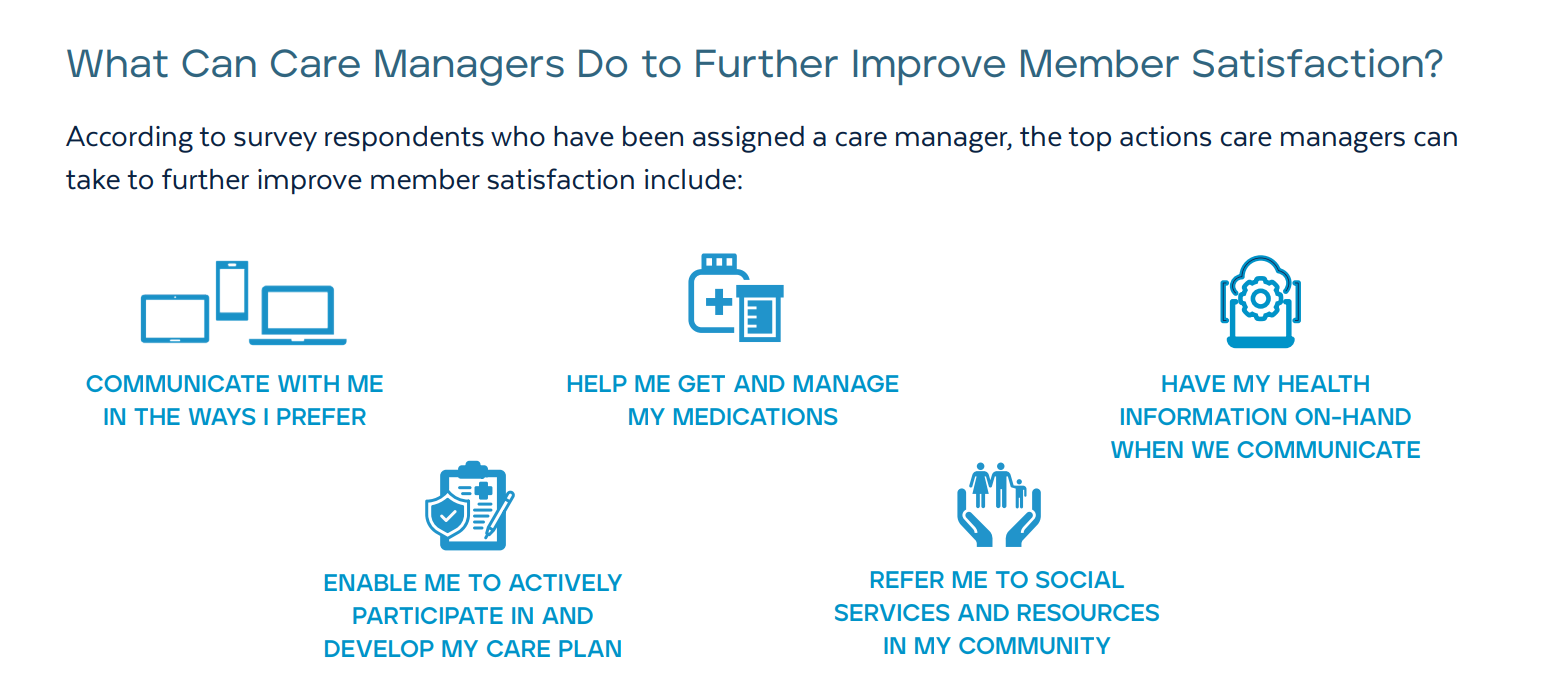
As patients assume more financial skin in their personal healthcare, they take on the role of demanding consumer, or “impatient patients.” HealthEdge’s latest research into health consumers’ perspectives finds peoples’ satisfaction with their health insurance plans lacking, with members seeking easier access their personal health information, high levels of service, and rewards for healthy behaviors. Health plans would also boost consumers’ satisfaction by channeling patients’ access to the kinds of medical providers that align with consumers’ preferences and personal values, and by personalizing information to steer people toward lower-cost care.
Hims and Hers and Hearts – Cardiology Blurs Into DTC Retail Health

Statin therapy has been used for decades to lower cholesterol with the goal of reducing mortality and preventing cardiovascular problems such as heart attacks and strokes. Hims & Hers announced a new service offering for health consumers and clinicians concerned about heart health called Heart Health by Hims. This is Hims & Hers’ first foray into cardiovascular health, working in collaboration with the American College of Cardiology (ACC). ACC clinical guidelines will inform the Hims’ provider platform for the program. “Prevention is the ideal mechanism to decrease cardiovascular events and ensure optimal heart
Patients Don’t Trust Big Tech with Personal Health Information Much Preferring Healthcare Providers as Data Stewards
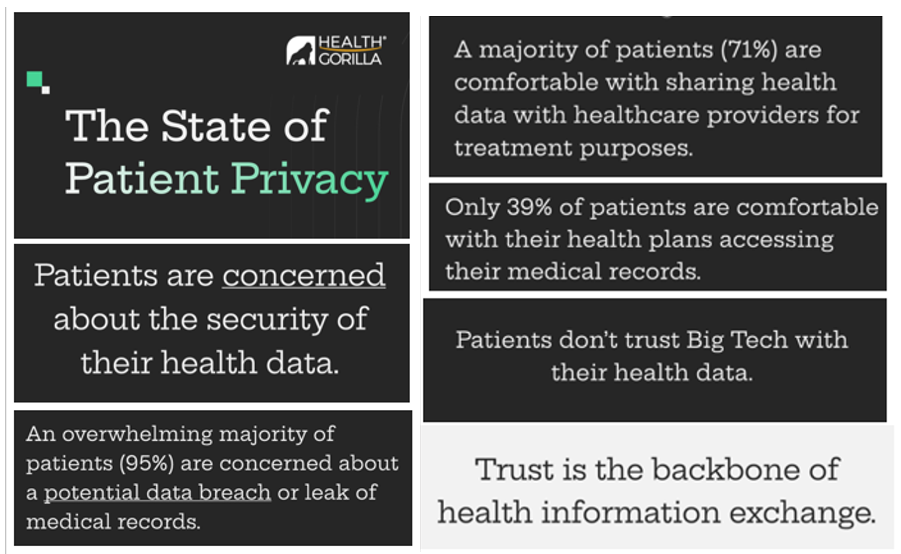
Nearly all patients are concerned about their medical records getting leaked or breached, which is The State of Patient Privacy, the title of a consumer study from Health Gorilla with a headline finding that “Patients don’t trust Big Tech with their health data.” With trust the “backbone” of health information exchange, Health Gorilla calls out, we have to face a big challenge here as health care enters its own sort of industrial revolution embedded AI and data analytics across the health/care ecosystem. How to re-build trust with the very technology that can help health care,
Aging and the New Home Health, Tech-Enabled – Learning from Nature
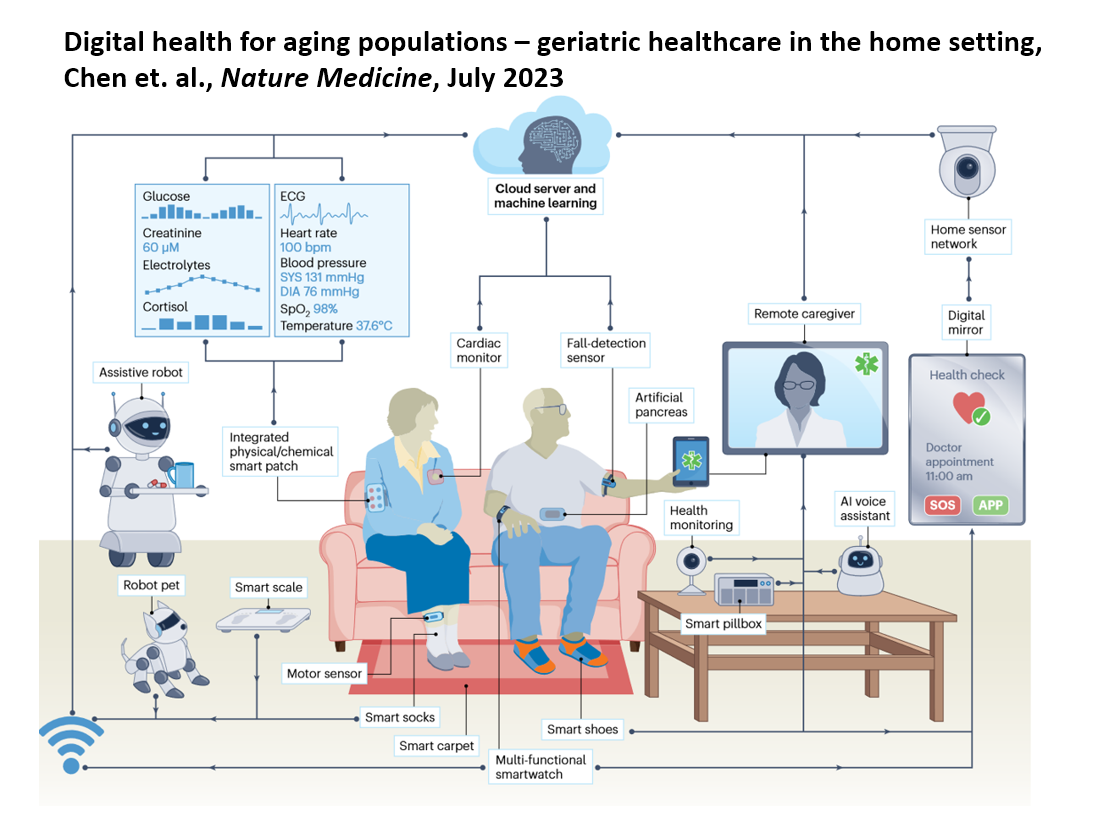
“Digital technologies offer tremendous potential for shifting from traditional medical routines to remote medicine,” with the role of wearables playing a growing role in the new home care for healthy aging. But what are the challenges of deploying this promising tech with older people keen to be independent at home? We learn a lot about prospects and challenges in Digital health for aging populations, a Perspective report in Nature Medicine‘s July 2023 issue. An experienced team affiliated with the University of California San Diego shares their insights in this essay, which
Happy Amazon Prime Days, When You Can Get 25% Off a Year’s One Medical Membership
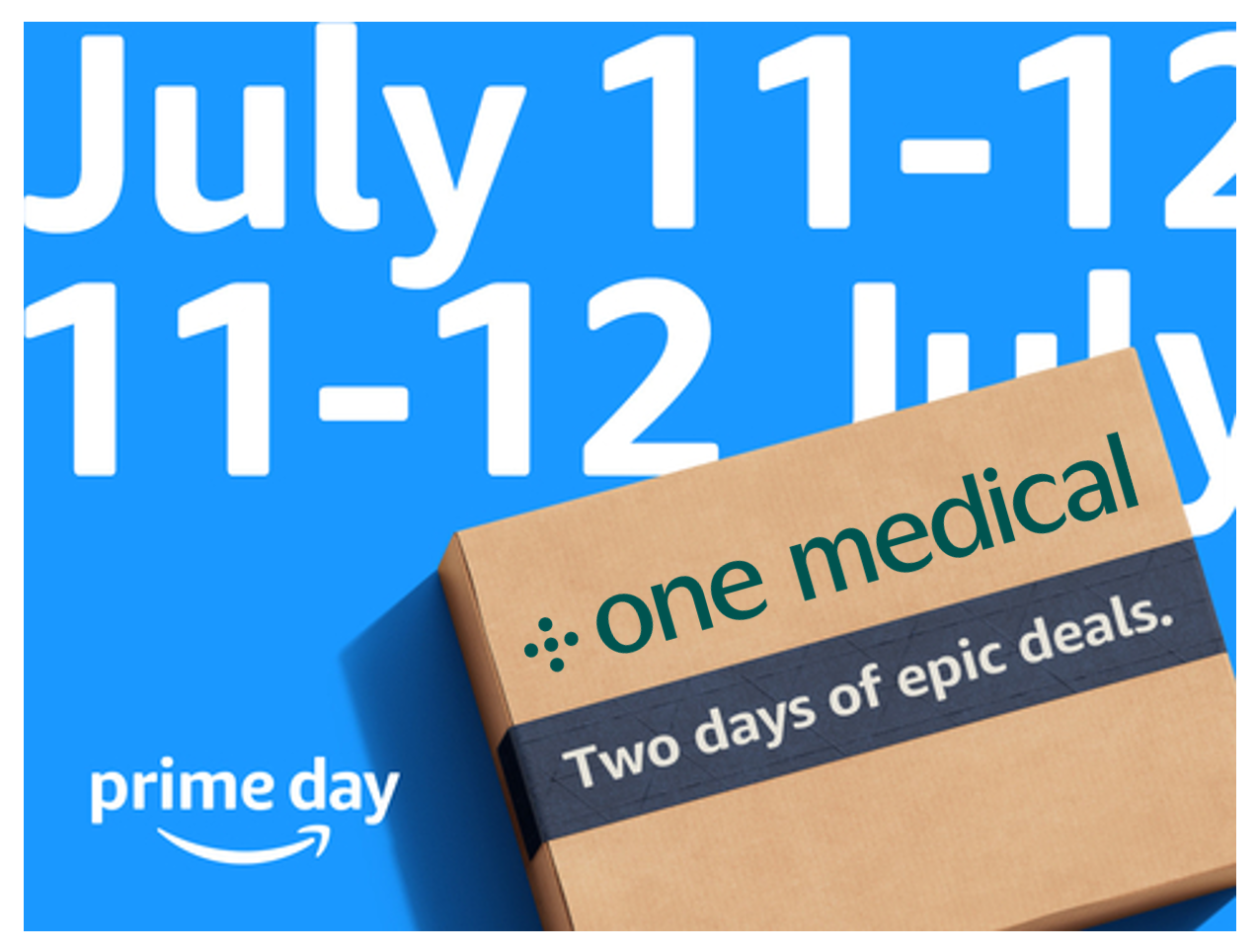
Now in Aisle E(commerce) – get your one-year membership to One Medical for $149. Today and tomorrow are Amazon Prime Days, 2023 style, when you can fetch bargains on lots of electronics (esp. deeply-discounted Amazon-branded devices), sporting goods, kitchen gear, pet supplies, and even groceries (saving with Amazon Fresh getting $20 off $100+ orders on Prime Day). And among a vast menu of health, medical, and well-being offerings from collagen to gym equipment and blood pressure monitors is that One Medical membership good for a year of services. “On-demand
Technologies That Bolster Health Will Be Baked Into the Fourth Industrial Revolution: Listening to the World Economic Forum
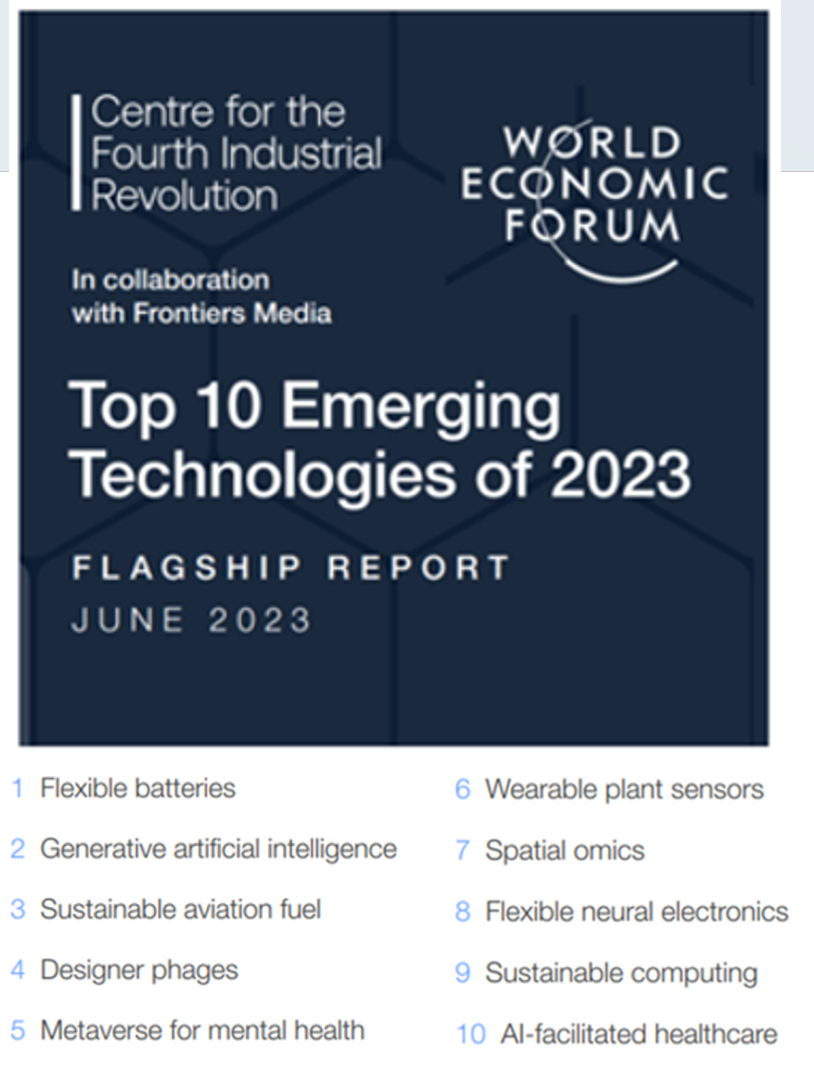
The technologies that will drive the Fourth Industrial Revolution have health baked into most of them, based on the Top 10 Emerging Technologies of 2023, a flagship report from the World Economic Forum, Two of the ten technologies making up this forecast directly speak to health and health care” AI-facilitated healthcare, and The metaverse for mental health. But seven of the remaining eight all address health somewhere in their discussions, and even the tenth non-obvious tech — #3, sustainable aviation fuel — would resonate with many researchers working on the opportunity
A “Great Re-Set” for Telehealth and Remote Monitoring? Panda Health Says That’s a “Yes”
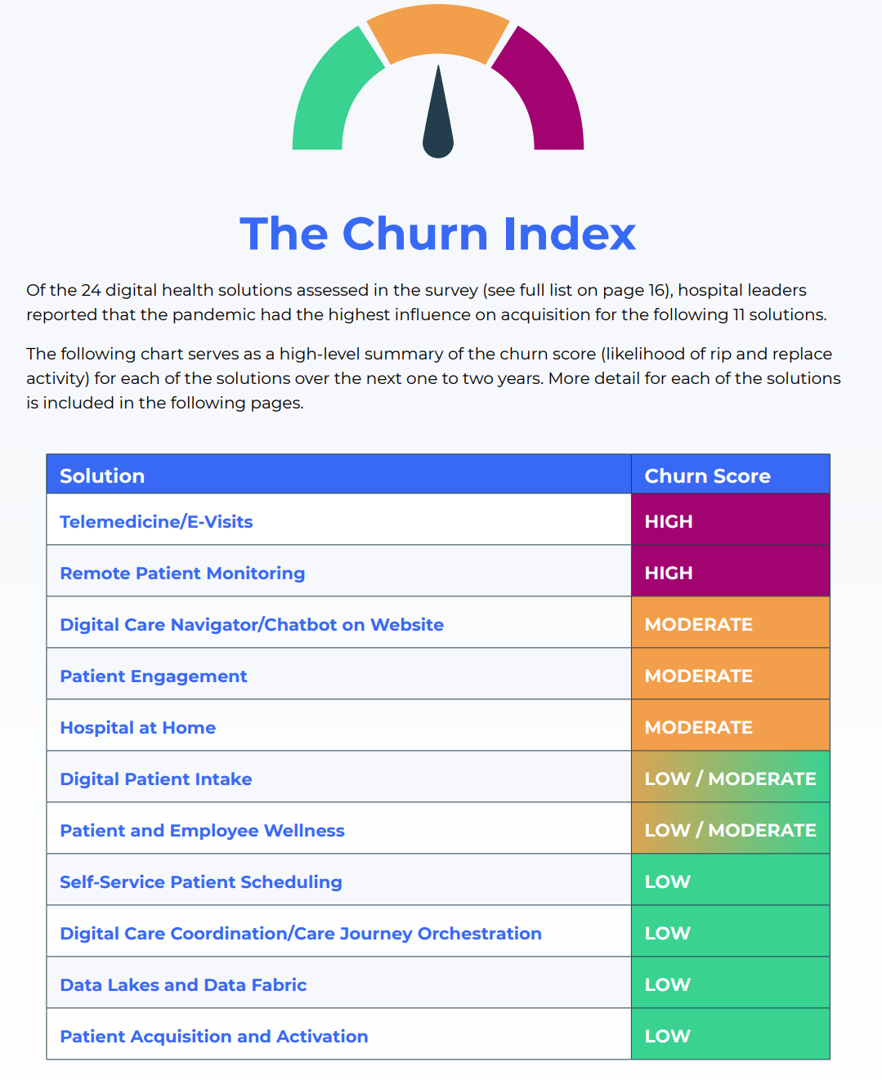
The fast-growing adoption of telemedicine and remote patient monitoring from the emergence of the COVID-19 pandemic led to hospitals and health systems launching new or expanding existing virtual care programs to accommodate a new reality for work-flow and patient care. Now that the worst of the coronavirus acute impact is in our rear-view mirror, it appears medical care providers are reassessing these implementations and may “rip [out] and replace” those systems, according to The Great Shakeup, a survey report from Panda Health. Panda Health collaborated with Sage Growth Partners
It Will Be a “Meh” Year for Consumers Buying Connected Health Devices, Based on CTA’s 2023 Forecast
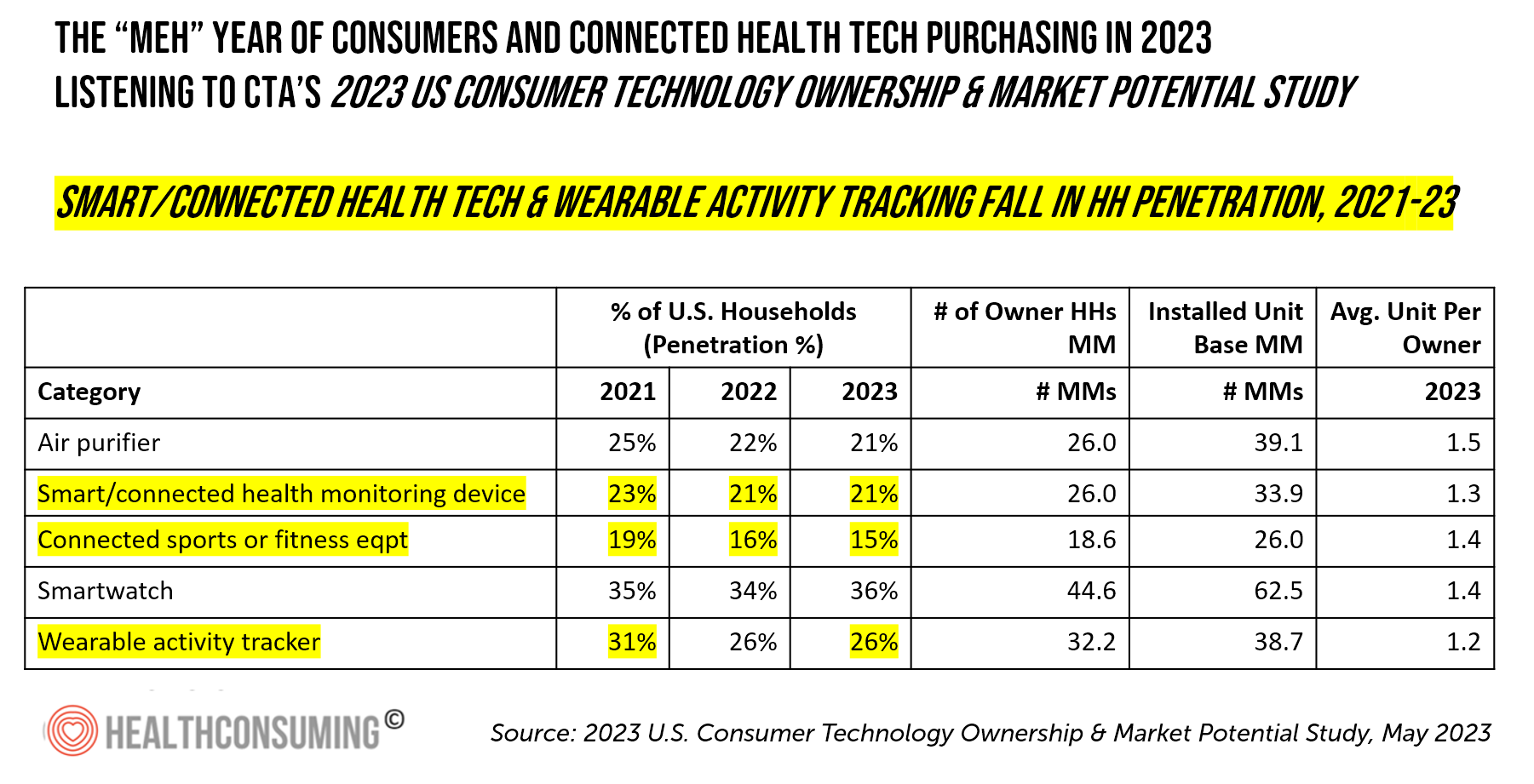
In 2023, U.S. consumers’ purchases of technology in their households will contract this year. Consumer-facing health-tech categories won’t be spared, we learn in the 2023 U.S. Consumer Technology Ownership & Market Potential Study, an annual update from the Consumer Technology Association (CTA). On the upside, smartwatch market penetration held steady in 2023, as this favorite form of wearable technology is “providing consumers a personalized digital health and fitness dashboard at their fingertips.” Many of these new smartwatch purchases will be cellular-enabled, blurring the space between smartphones and watches. One in five households intends to purchase
Patients-As-Health Care Payers Define What a Digital Front Door Looks Like
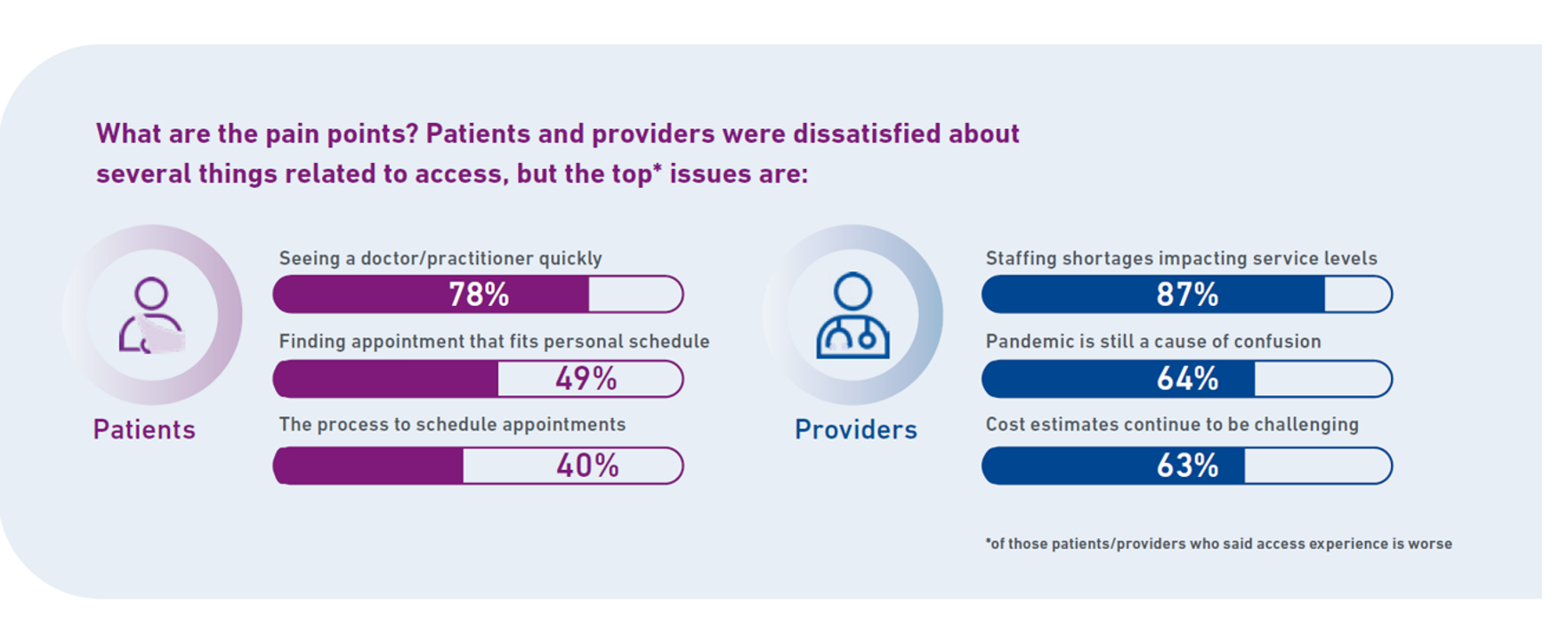
In health care, one of the “gifts” inspired by the coronavirus pandemic was the industry’s fast-pivot and adoption of digital health tools — especially telehealth and more generally the so-called “digital front doors” enabling patients to access medical services and personal work-flows for their care. Two years later, Experian provides a look into The State of Patient Access: 2023. You may know the name Experian as one of the largest credit rating agencies for consumer finance in the U.S. You may not know that the company has a significant footprint
Searching for Health/Care Touchpoints in the 2023 Axios Harris Poll 100
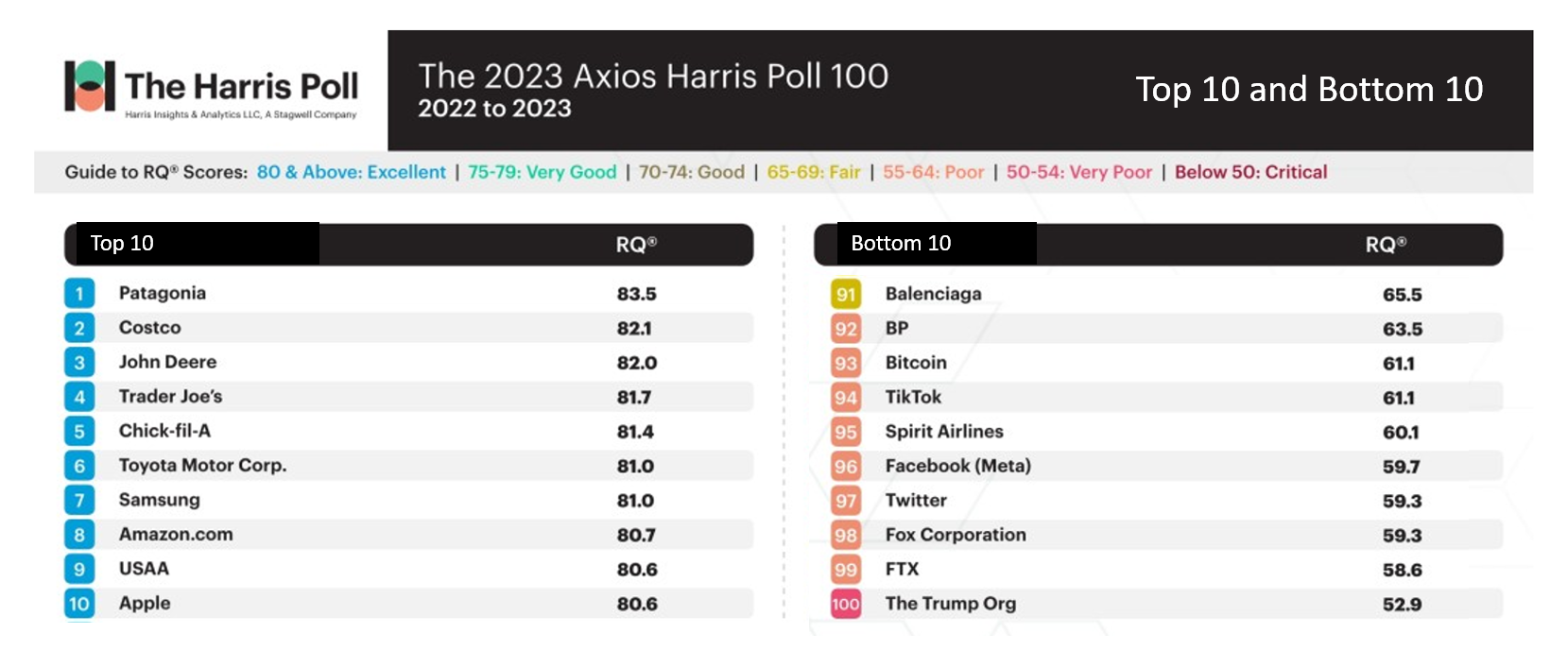
Patagonia, Costco, John Deere, and Trader Joe’s are loved; Twitter, Fox Corp., FTX and The Trump Organization? Not so much. Welcome to 2023 Axios Harris Poll 100 list of companies U.S. consumers rate from excellent in terms of reputation to very poor and, one in particular, “critical.” Exploring the list, we can find insights into consumers’ preferred touchpoints for health, health care, and well-being curated in their daily lives. In this, today’s, Health Populi blog, I consider The 2023 Axios Harris Poll 100 reputation rankings in light of what we learned from the Morning Consult Most Trusted Brands 2023 study
Retail Clinics’ Growing Role in Health Care and Prescription Drug Sales
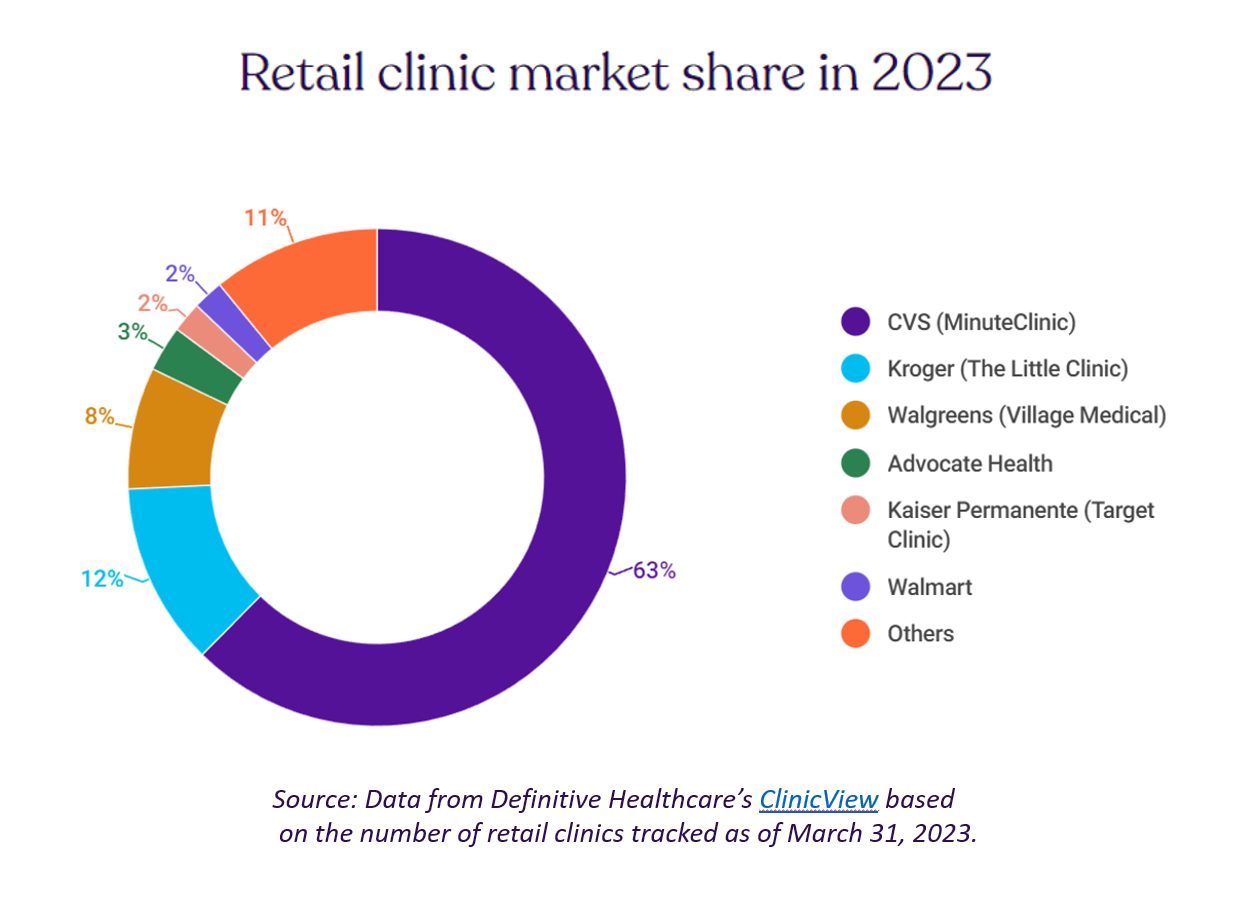
“It seemed like an odd pairing: shampoo and a throat swab,” observes a new report on the growth of retail health from Definitive Healthcare. But retail clinics are no longer, as the paper explains, “an experiment of a few grocery stores….they’re becoming a major force in the U.S. healthcare system,” asserts the thesis of Retailers in healthcare: A catalyst for provider evolution. While the use of emergency departments fell by 1% in the past five years, the use of retail clinics expanded by 70%, Definitive Healthcare calculated. Most retail clinics are owned by
Getting Health Care at a Retail Pharmacy vs a Retail Store: Consumers May Be Favoring the Pharmacist Versus the Retailer
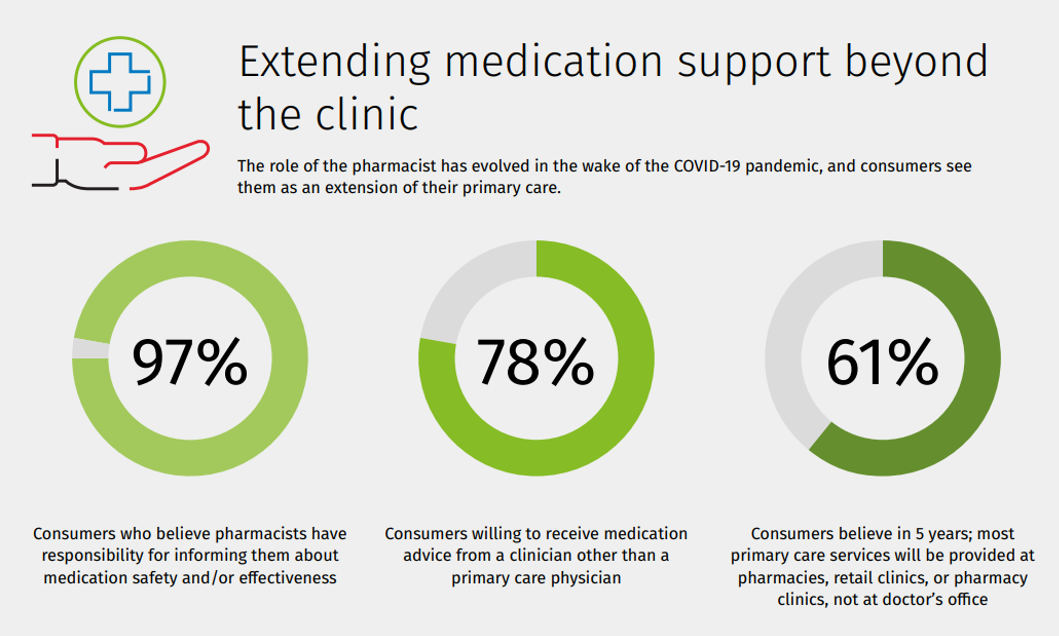
Not all “retail health” sites are created equal, U.S. consumers seem to be saying in a new study from Wolters Kluwer Health, the company’s second Pharmacy Next: Consumer Care and Cost Trends survey. Specifically, consumers have begun to differentiate between health care delivered at a retail pharmacy versus care offered at a retail store — such as Target or Walmart (both named as sites that offer “health clinics in department stores” in the study press release). While 58% of Americans were likely to visit a local pharmacy as a “first step” when faced with a non-emergency medical situation and 79%
Health Systems Must Move “Beyond the Walls” to Support Consumers’ Well-Being
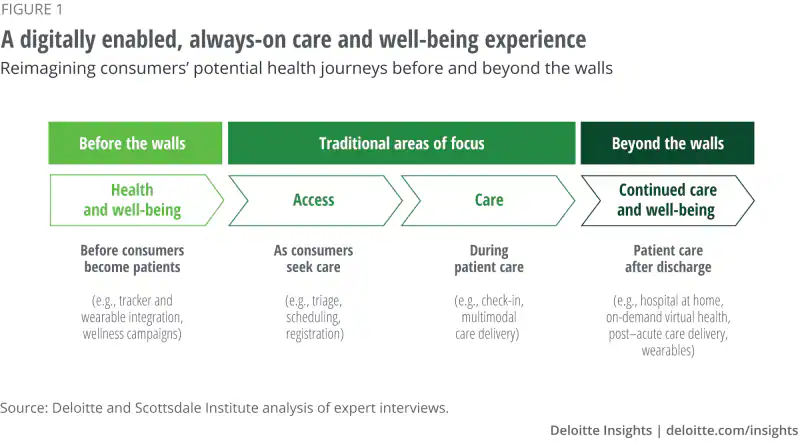
Hospitals’ and health systems’ core competencies have been serving patients “within the walls” of their organizations and institutions. As health systems continue to evolve value-based services while meeting patients’ consumer-oriented demands for convenience and personalization, digital transformation is required, enabling care “beyond-the-walls.” We learn more about this vision and how to map the journey to getting there in the report Integrating digital health tools to help improve the whole consumer experience from the Deloitte Center for Health Solutions and the Scottsdale Institute. This report is based on detailed interviews with experts in 30 US health
Three More Signposts on the Road to Retail Health – Weight Loss Drugs, OTC Birth Control and Fashion-Meets-the-Flu
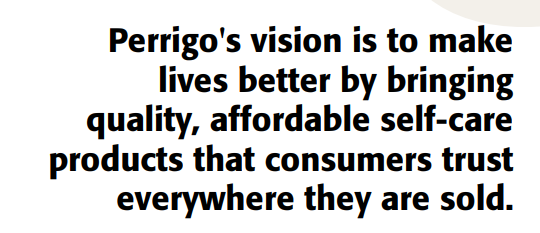
We continue to track to evolving, expanding landscape of retail health — which we see as the expanding ecosystem of health/care accessible to people-as-health consumers. This week, three intriguing examples are resonating with us: The ever-evolving weight-loss industry FDA favors OTC use for Perrigo’s Opill daily oral contraceptive birth control pill The convergence of fashion and health — specifically, how an over-the-counter medicine converges with clothing that helps us feel better. Let’s start with weight-loss, as several aspects of health/care come together in the consumer’s retail health sandbox. Dr. Eric Topol
Consumers’ Use of Digital Health is Just Part of Mainstream Life Now
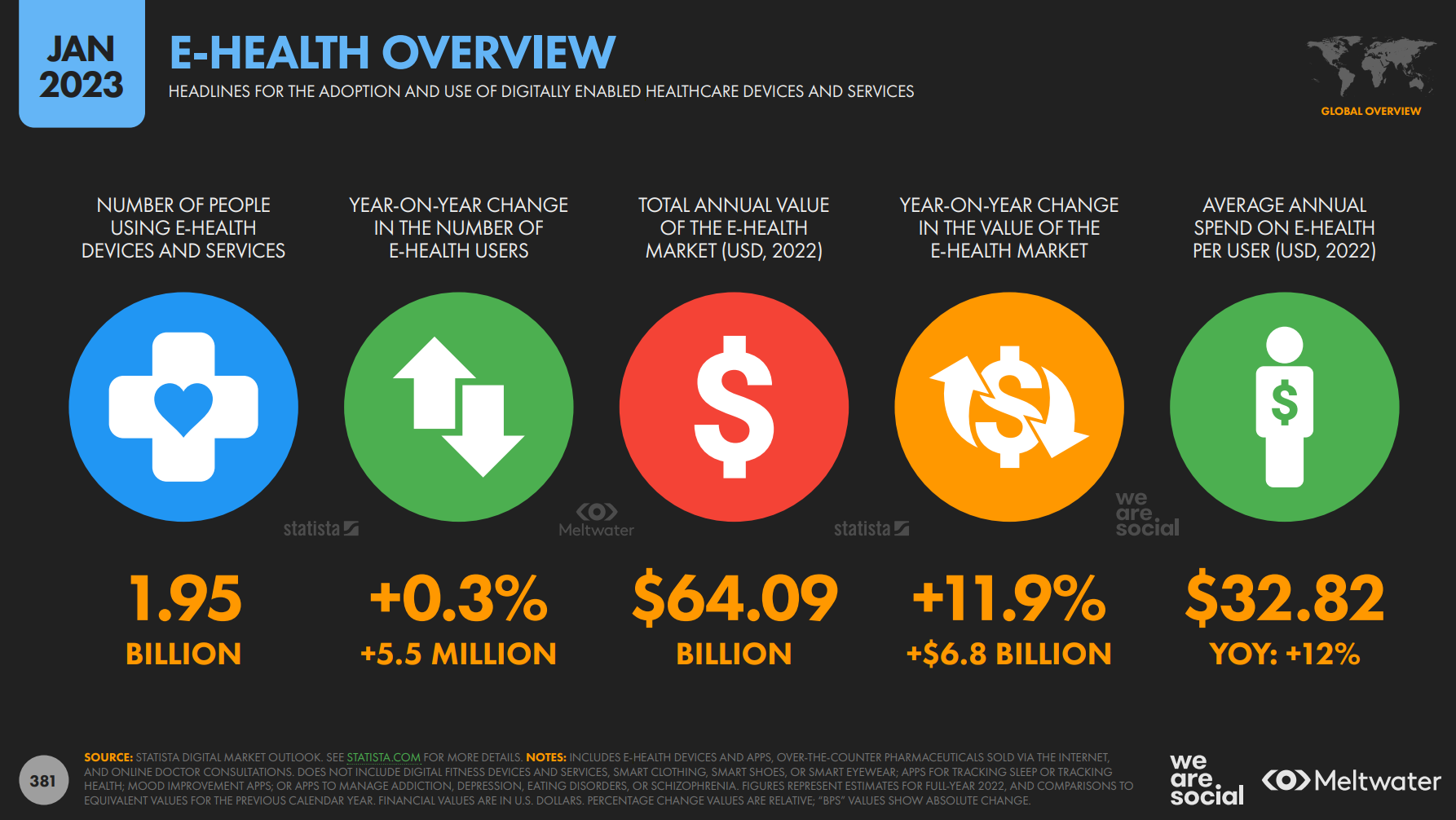
Using the Internet and mobile health apps are as mainstream as swiping left for a date and researching features in a new car, based on the Digital 2023 Global Overview Report from Meltwater. The broad coverage of this kind of research can’t be accomplished by just one entity, and Meltwater acknowledges the partners who brought them to this research-party: these included data.ai, GSMA Intelligence, GWI, Locowise, Ookla, PPRO, SemRush, Similarweb, Skai, and Statista. In this 400+ page report, you can find most datapoints you’re interested in covering the global consumers’ use of the internet, mobile apps, and social media. I
Virtual Health Care Can Reduce Carbon Emissions: the Environmental ROI on Telehealth
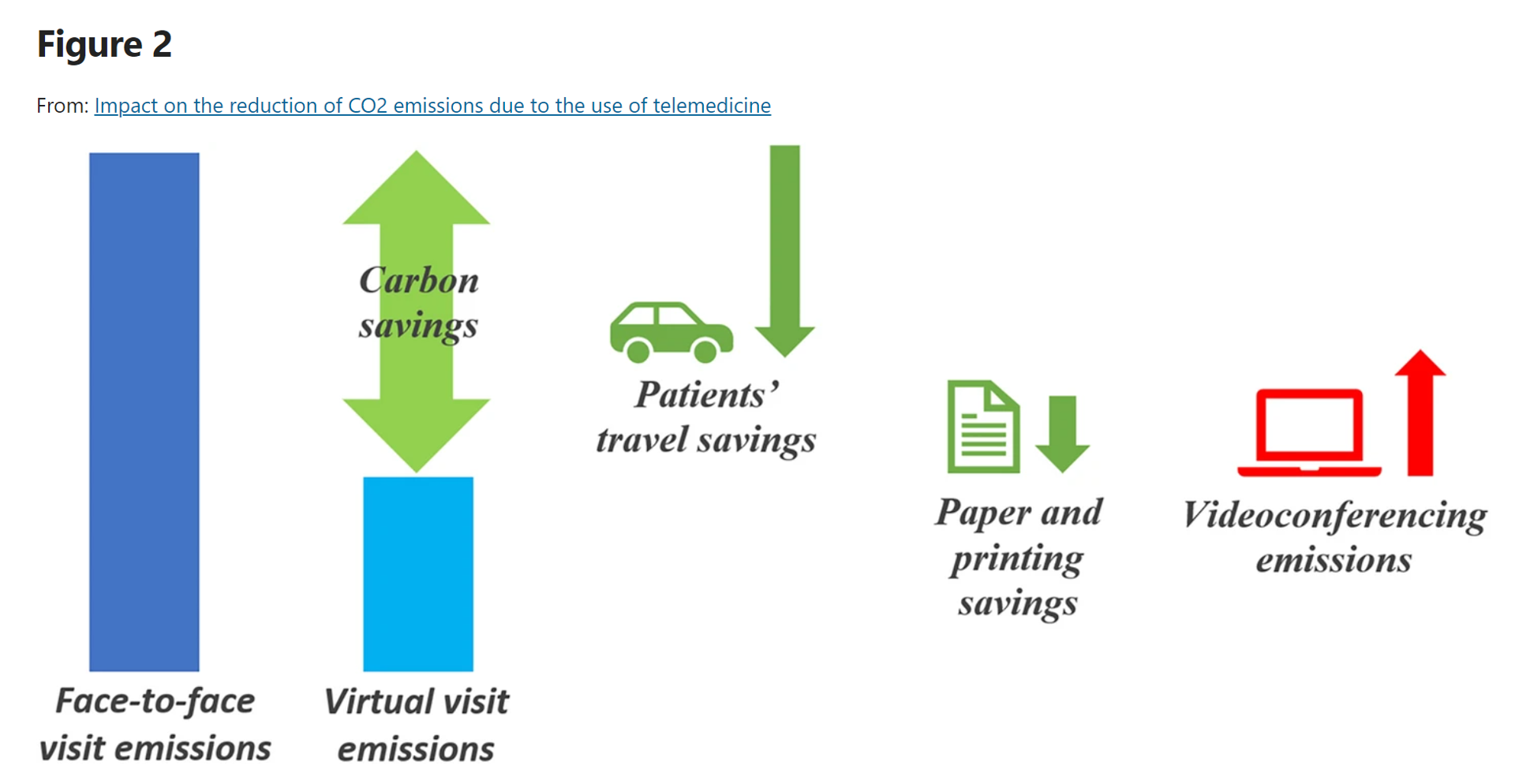
As implemented in the COVID-19 era and its immediate wake, the most obvious environmental benefits offered by telehealth visits replacing in-person patient encounters have been achieved through reduced patient travel, considering The Role of Virtual Consulting in Developing Environmentally Sustainable Health Care, a systematic literature review published in the Journal of Medical Internet Research. This study, led by researchers at the University of Oxford, UK, and the University of Oslo, Norway, identified over 1,600 scientific papers, narrowing the most rigorous and relevant to 23 papers focusing on virtual consulting and carbon emissions. This is an important question for two major
“Your care, your way:” Learning from the Philips Future Health Index 2023
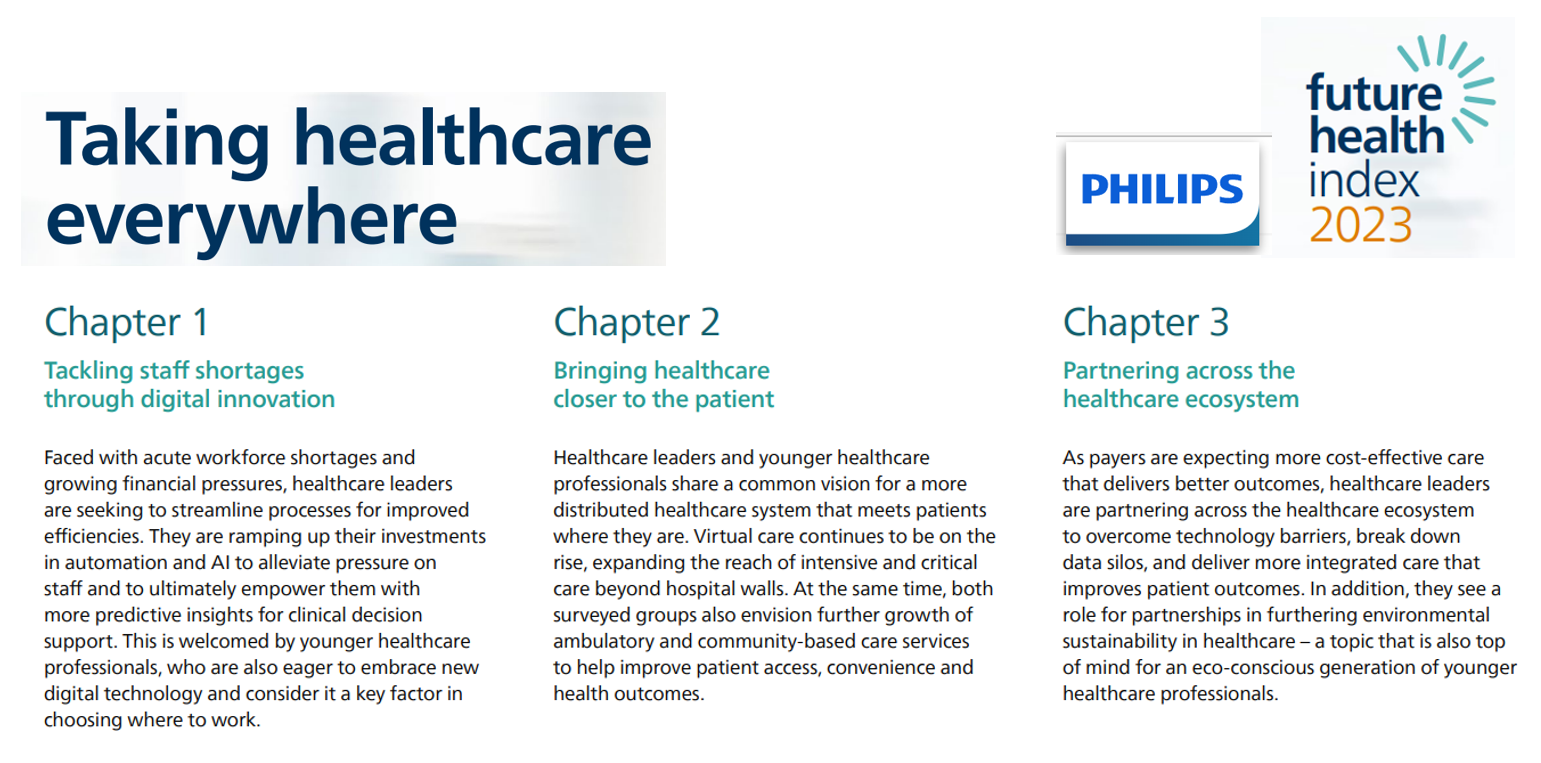
Consider the key drivers of supply and demand in health care, globally, right now: On the medical delivery supply side, the shortage of staff is a limiting factor to continuing to deliver care based on the usual work-flows and payment models. On the demand side, patients are taking on more demanding roles as consumers with high expectations for service, convenience, and safe care delivered closer to home — or at home. This dynamic informs The Future Health Index 2023 report from Philips, launched this week at HIMSS 2023. This is the eighth annual global FHI report, with detailed country-specific analyses to
My Health, My Data – Thinking Consumers, Privacy and Self-Care at HIMSS 2023
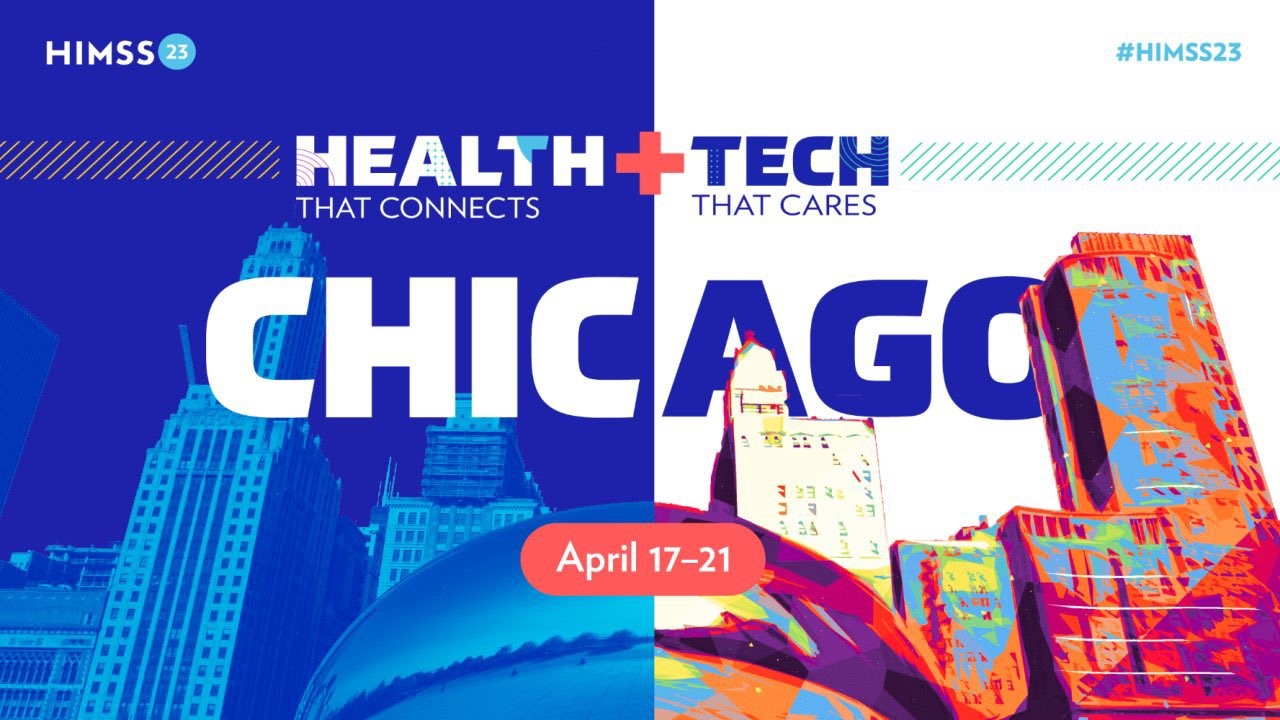
The Washington State legislature passed House Bill 1155, aka the My Health, My Data Act, last week. Governor Jay Inslee is expected to sign this into State law later this year. The bill expands privacy protections for Washington State’s health citizens beyond HIPAA’s provisions. The My Health, My Data Act defines “consumer health data” as “personal information that is linked or reasonably linkable to a consumer and that identifies a consumer’s past, present, or future physical or mental health.” The ethos of the name and the intent of this law is a perfect vision for
Patients Have AI-Disconnect When it Comes to Their Health Care – Pew Research Center Insights
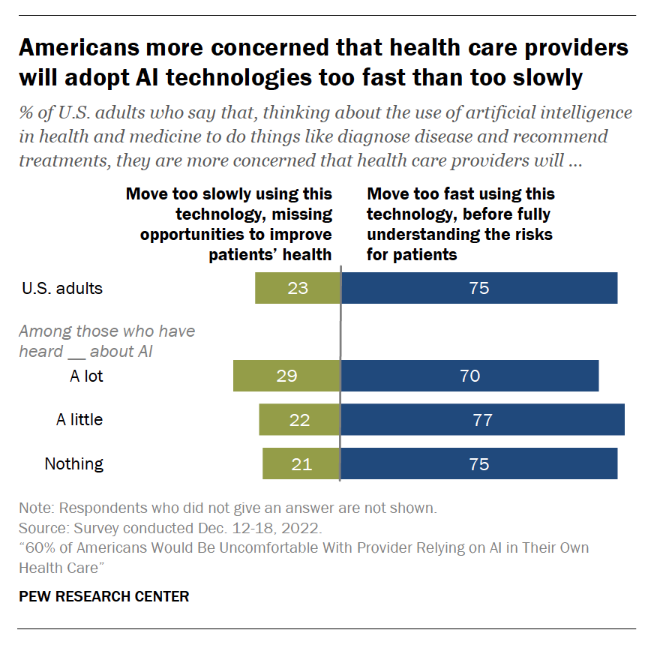
Most U.S. health citizens think AI is being adopted in American health care too quickly, feeling “significant discomfort…with the idea of AI being used in their own health care,” according to consumer studies from the Pew Research Center. The top-line is that 60% of Americans would be uncomfortable with [their health] provider relying on AI in their own care, found in a consumer poll fielded in December 2022 among over11,000 U.S. adults. Most consumers who are aware of common uses of AI know about wearable fitness trackers that can analyze exercise and sleep
The Top 10 Patient Safety Concerns for 2023 Are About Social, Mental and Behavioral Health
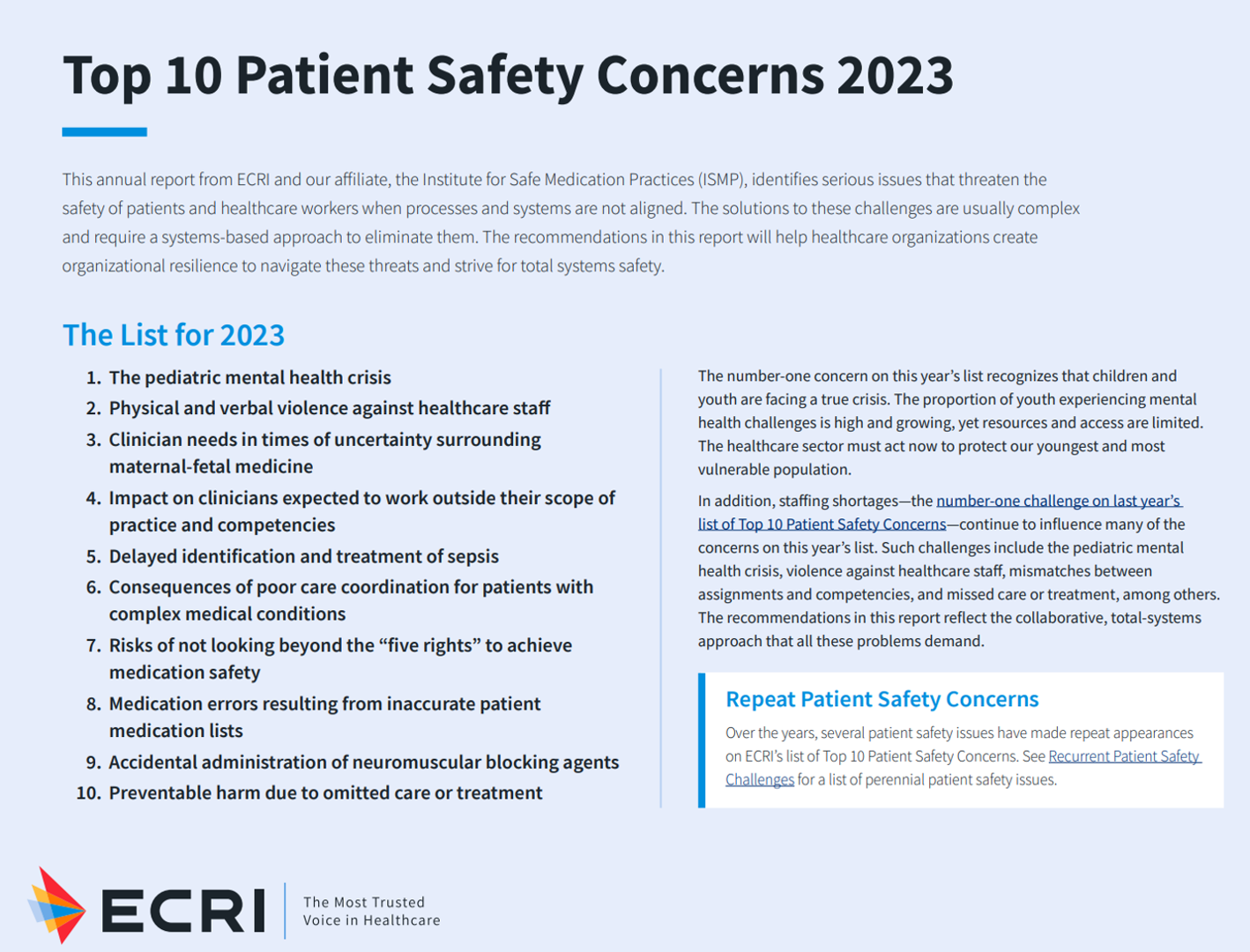
Ten years ago, ECRI named the top 10 health technology hazards for 2013: they were alarm hazards, medication administrative errors using infusion pumps, unnecessary exposure and radiation burns from diagnostic radiology procedures, patient/data mismatches in EHRs and other HIT systems, interoperability failures with medical devices and health IT systems, and five other tech-related hazards. In 2014, ECRI pivoted the title of this annual report to “patient safety concerns,” a nuance away from health technology. Fast forward to 2023 and ECRI’s latest take on the Top 10 Patient Safety Concerns 2023. While technology is embedded in this list, the headlines have more
Growing DTC for Health Beyond the Rx – the New Health/Care at Home
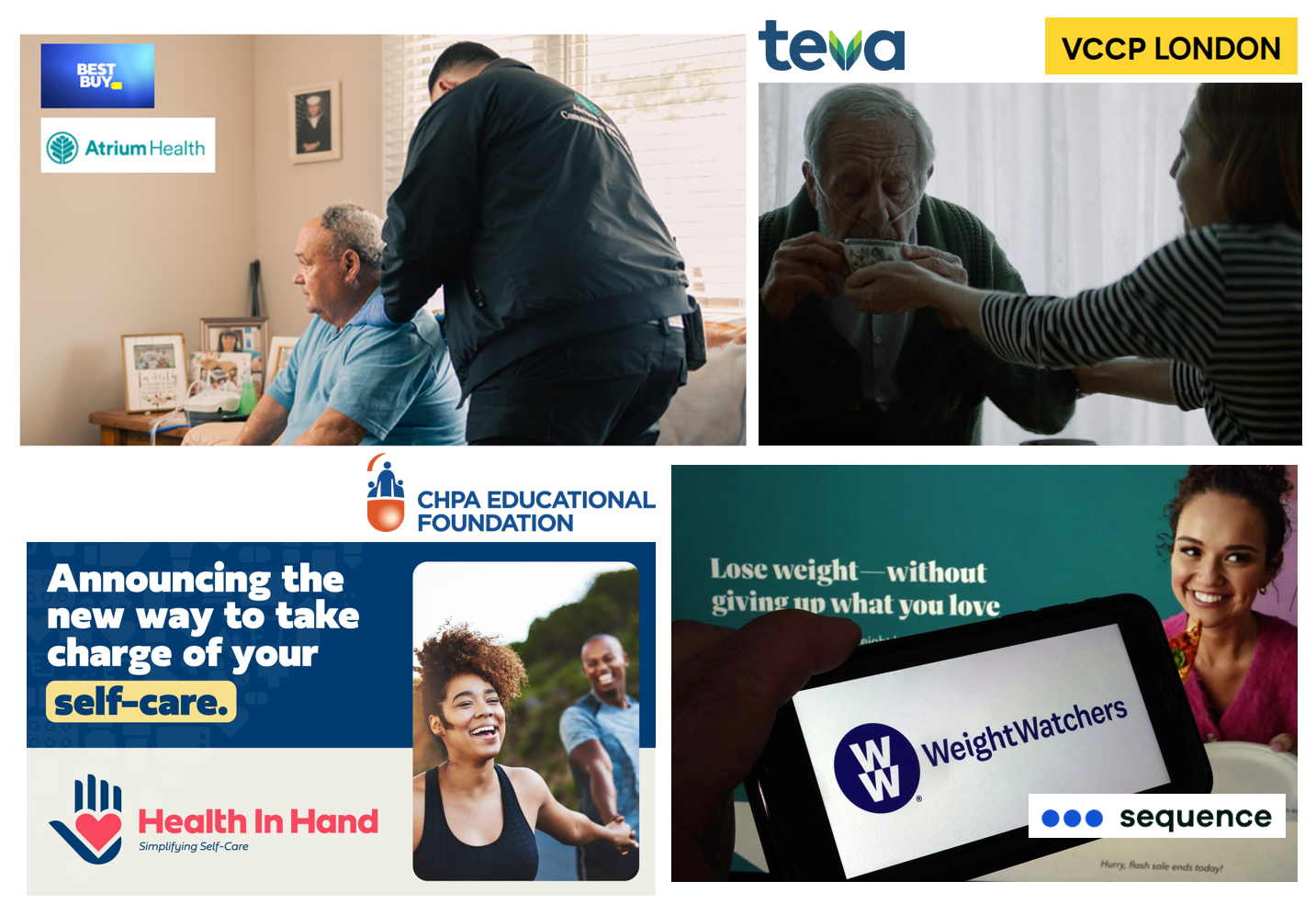
As our homes and health care services continue to converge, we can see signposts of direct-to-consumer strategies from the pillbox (where DTC is a mature thing) to clinical care in peoples’ hands (and on their preferred technology platforms). Some examples this week make this point, which taken together demonstrate the portfolio of ways more people – as health consumers and caregivers – can engage in their health, well-being, and clinical care. Start with Best Buy’s announcement that they will collaborate with the health system Atrium Health to bolster hospital-to-home effectiveness and activation between hospitals
How Consumers and Physicians View Digital Health – An Update from the Consumer Technology Association
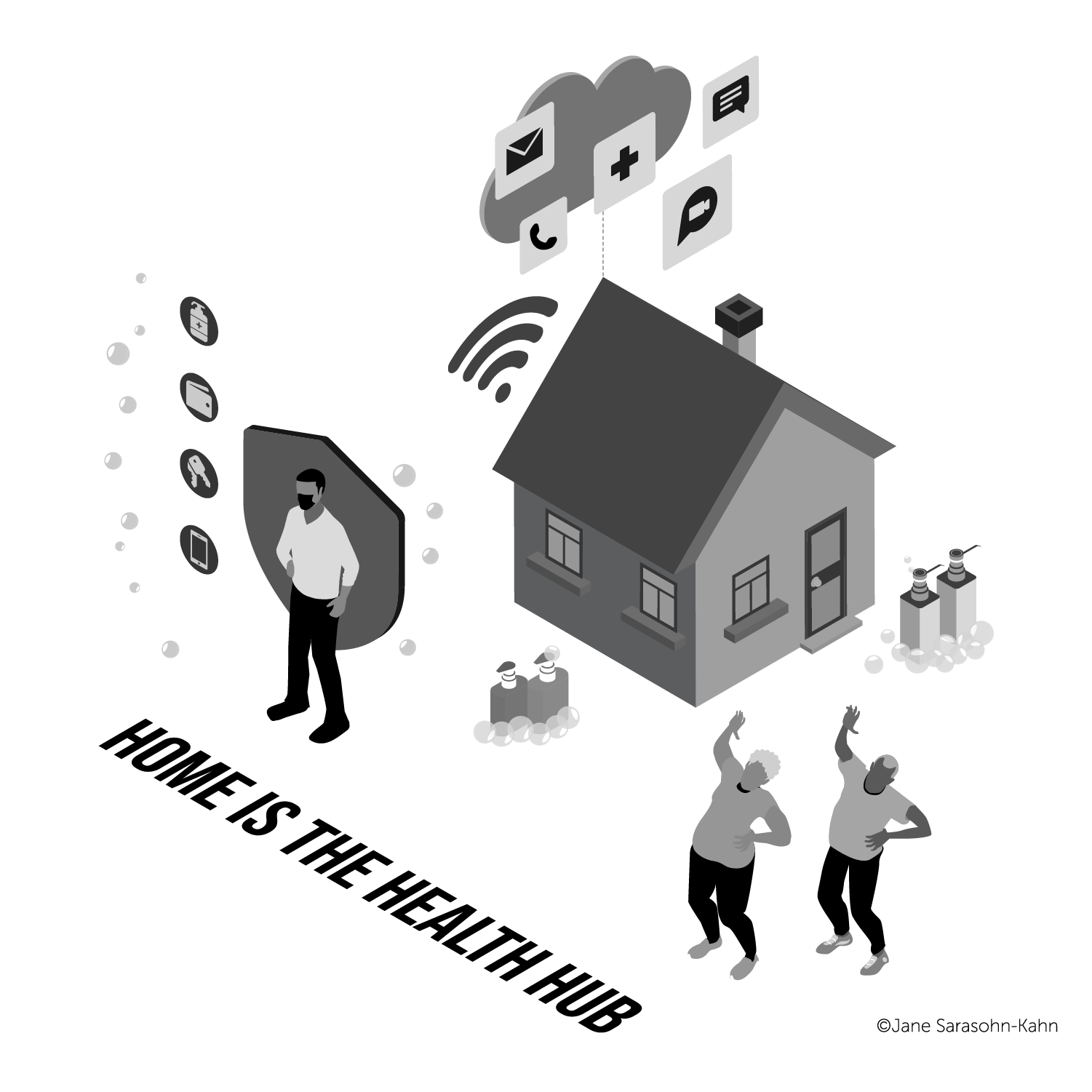
Most consumers are bullish on the benefits that digital health technologies can play in their health. Most health care practitioners are also positive about the potential of digital health — recognizing room for improvement for better data integration, interoperability, and the opportunity to bridge gaps to achieve health equity and bolster access. So assesses the Consumer Technology Association in the report, Driving Consumer Adoption of Digital Health Solutions, To paint this profile, CTA engaged Ipsos to poll 1,000 U.S. consumers 18 years and older, 300 health care providers (HCPs), and 12 health tech company stakeholders in August and September 2022.
Enabling better health care, everywhere – my conversation with Microsoft
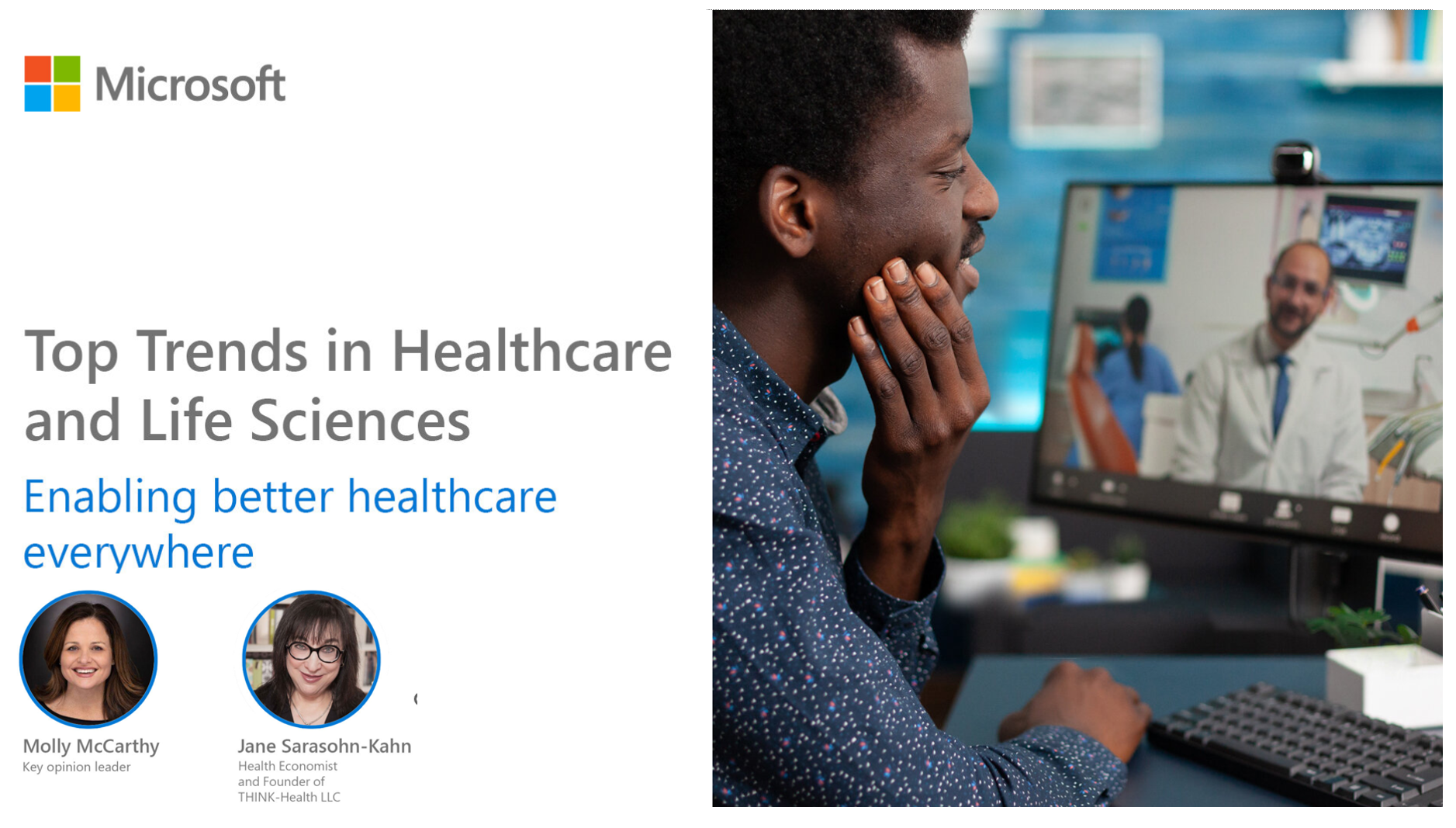
I am grateful to have been given the opportunity to brainstorm omnichannel health care for people to enable better health care for all, anywhere and everywhere, with Team Microsoft. Key opinion leader Molly McCarthy and I covered a lot of ground in this webcast conversation as part of Microsoft’s series of three “Expert perspectives on trends driving change in healthcare.” Molly and I covered a lot of ground here, starting with the key forces shaping and accelerating virtual care across the continuum. While these were in place before the COVID-19 pandemic, the public health
People Using Health Apps and Wearable Tech Most Likely Track Exercise and Heart Rate, Sleep and Weight – But Cost Is Still A Barrier
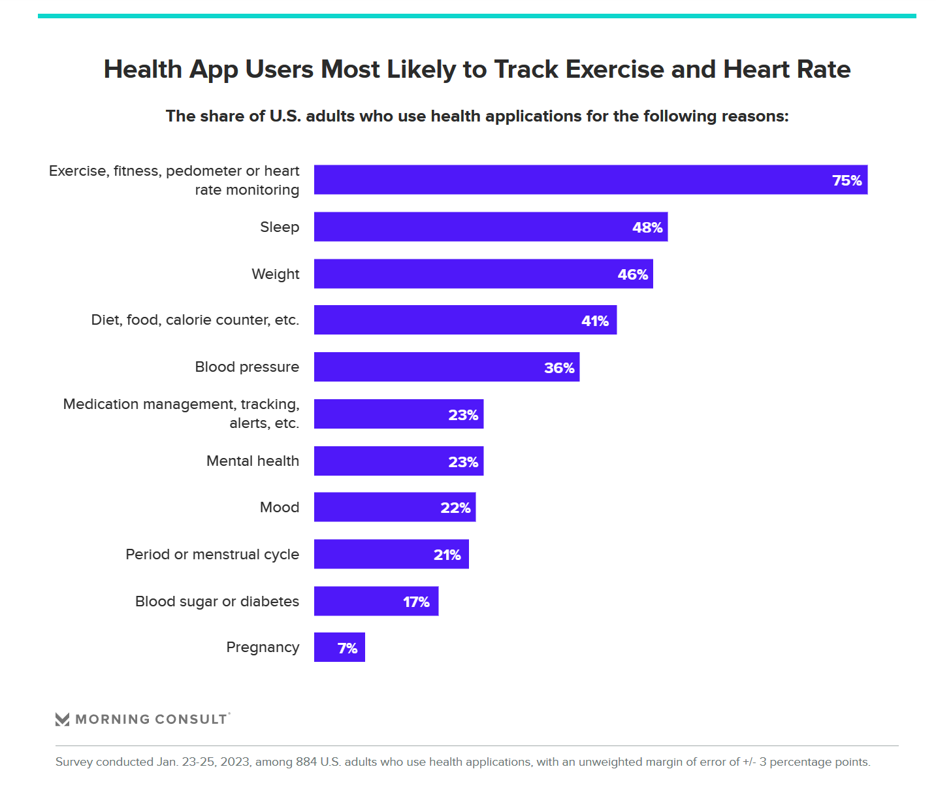
Over one in three U.S. consumers use a health app or wearable technology device to track some aspect of their health. “The public’s use of health apps and wearables has increased in recent years but digital health still has room to grow,” a new poll from Morning Consult asserts, published today. Among digital health tech users, most check into them at least once every day in the past month. One in four use these tech’s multiple times a day, the first pie chart illustrates. Eighteen percent of people use their digital
The American Hospital Association Looks at Retail and Tech Health Care Disruptors
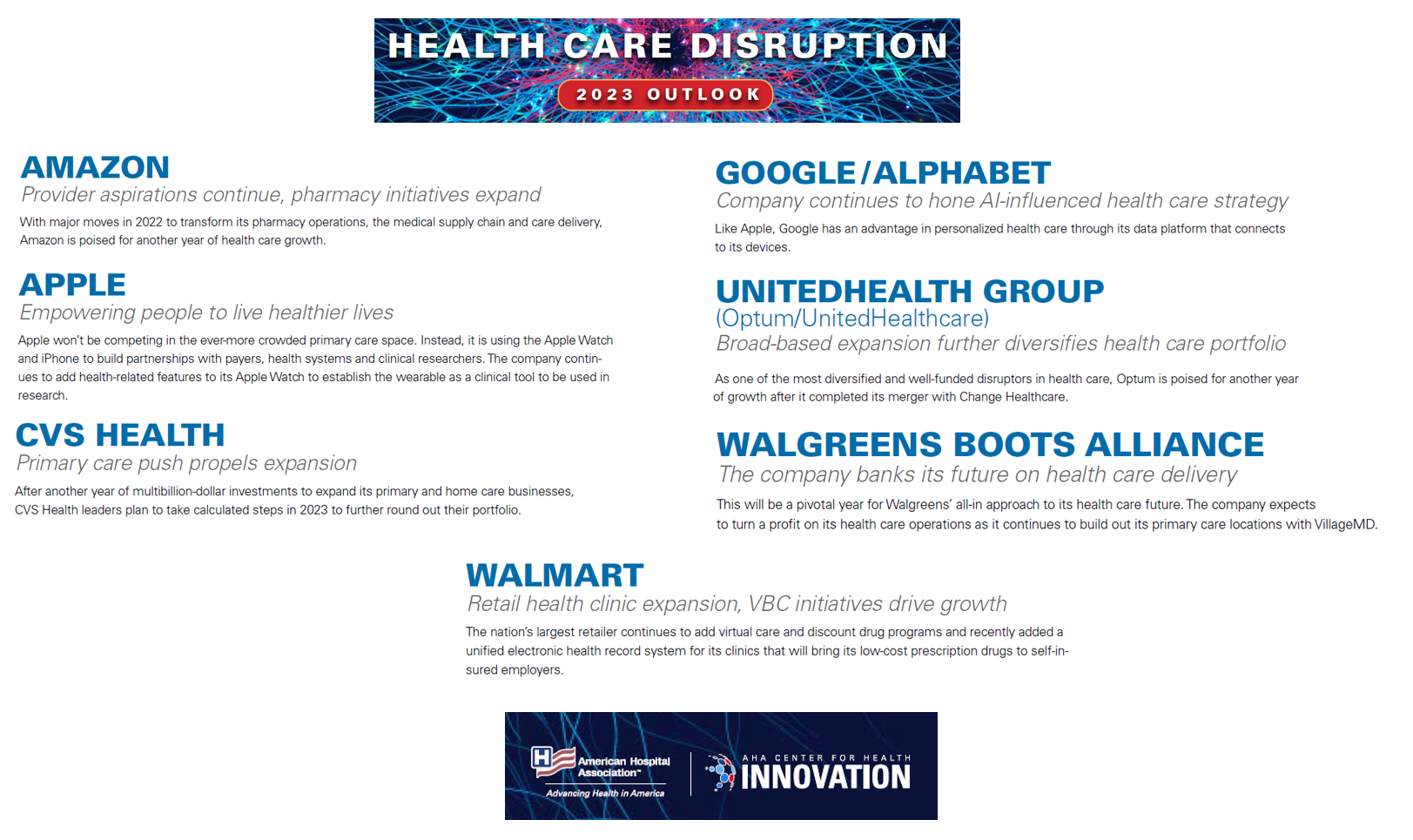
Ever since Clayton Christensen explained the concept of disruptive innovation in 1995, health care became one of the poster children emblematic of an industry ripe for disruption. Nearly 30 years later, disrupting health care continues to be a theme which, in 2023, seems open for those slow-moving tectonic driving forces to finally re-form and re-imagine health care delivery. So in today’s Health Populi we turn to a new report, Health Care Disruption 2023 Outlook, part of AHA’s “The Buzz” market scan initiative. The American Hospital Association is taking disruption seriously right here, right now, as the U.S. hospital sector is
Bayer at The Big Game LVII: the Heart Health Ecosystem is Ripe for Self-Care and DIY Health at Home

Joke if you must about Big Game cuisine being typically packed with calories and fat and carbs….and as such, not-so-great for health. For me, the ads are the attraction during The Big Game (along with the Philadelphia Eagles). In this year’s ad line-up, health will be featured in high-priced spots as it has for the past few years. Last year, I was intrigued by a female-focused 30-second spot from Hologic, educating viewers on cervical cancer, discussed here in Health Populi. This year, my eyes are on Bayer Aspirin’s campaign “encouraging sports fans to keep their heart
What Are Patients Looking for in a Doctor? It Depends on Who You Ask…and Their Race
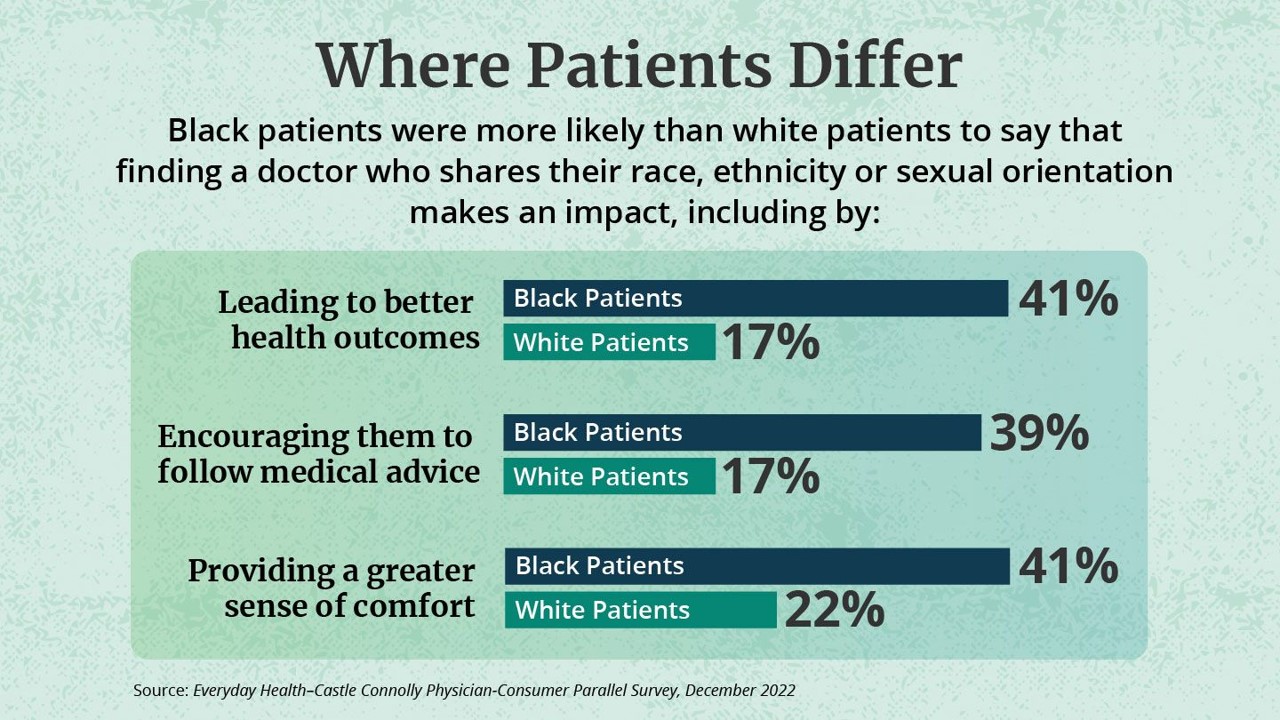
While the same proportion of Black and White patients say they are looking for a doctor with empathy and compassion, there are relatively large differences between patients based on their race, found in the Everyday Health-Castle Connolly Physician-Consumer study. The survey was conducted in December 2022 among a group of 1,001 U.S. consumers and 277 Castle Connolly health care professionals. As the first bar chart illustrates “where patients differ, “Black people were nearly twice as likely as white people (41 percent versus 22 percent) to completely agree that they would be more comfortable and
Integration is the New Innovation for Healthcare in 2023: Reflections on CES2023 and JPM2023

The peak of venture investment for digital health was in 2020 and 2021, precipitously declining later in 2022. And the outlook for 2023 is practical and Show-Me: that is, demonstrate clinical outcomes and return-on-investment before “I” (for investors) can take a leap of faith to spend a dollar, a Yen, a Euro, or British pound on a shiny new-new healthcare thing. If it’s January, then CES and JP Morgan convene their influential annual meetings which feature health technology for globally engaged health industry stakeholders — investors, surely, but also providers, innovators, analysts, and insurers. In my January
Record Numbers of People in the U.S. Putting Off Medical Care Due to Cost – A New “Pink Tax” on Women?
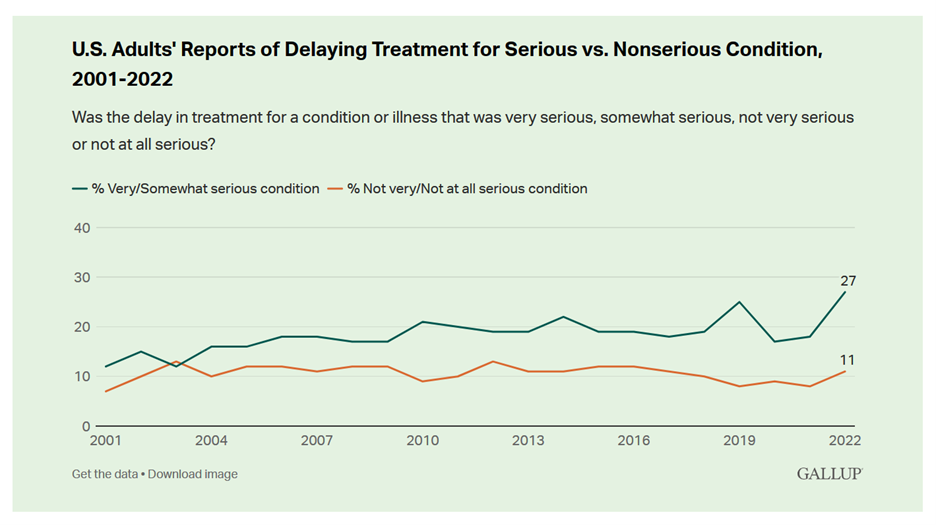
More people in the U.S. than ever have put off medical care due to cost, according to Gallup’s latest poll of patients in America. Gallup conducted the annual Health and Healthcare poll U.S. adults in November and December 2022. This was the highest level of self-rationing care due to cost the pollster has found since its inaugural study on the topic in 2001. This was also the most dramatic year-on-year increase of postponing treatment due to cost in the study’s history. Note the substantial difference in women avoiding
Digital Health Funding Updates from FINN + Galen and Silicon Valley Bank – Context for JPM2023
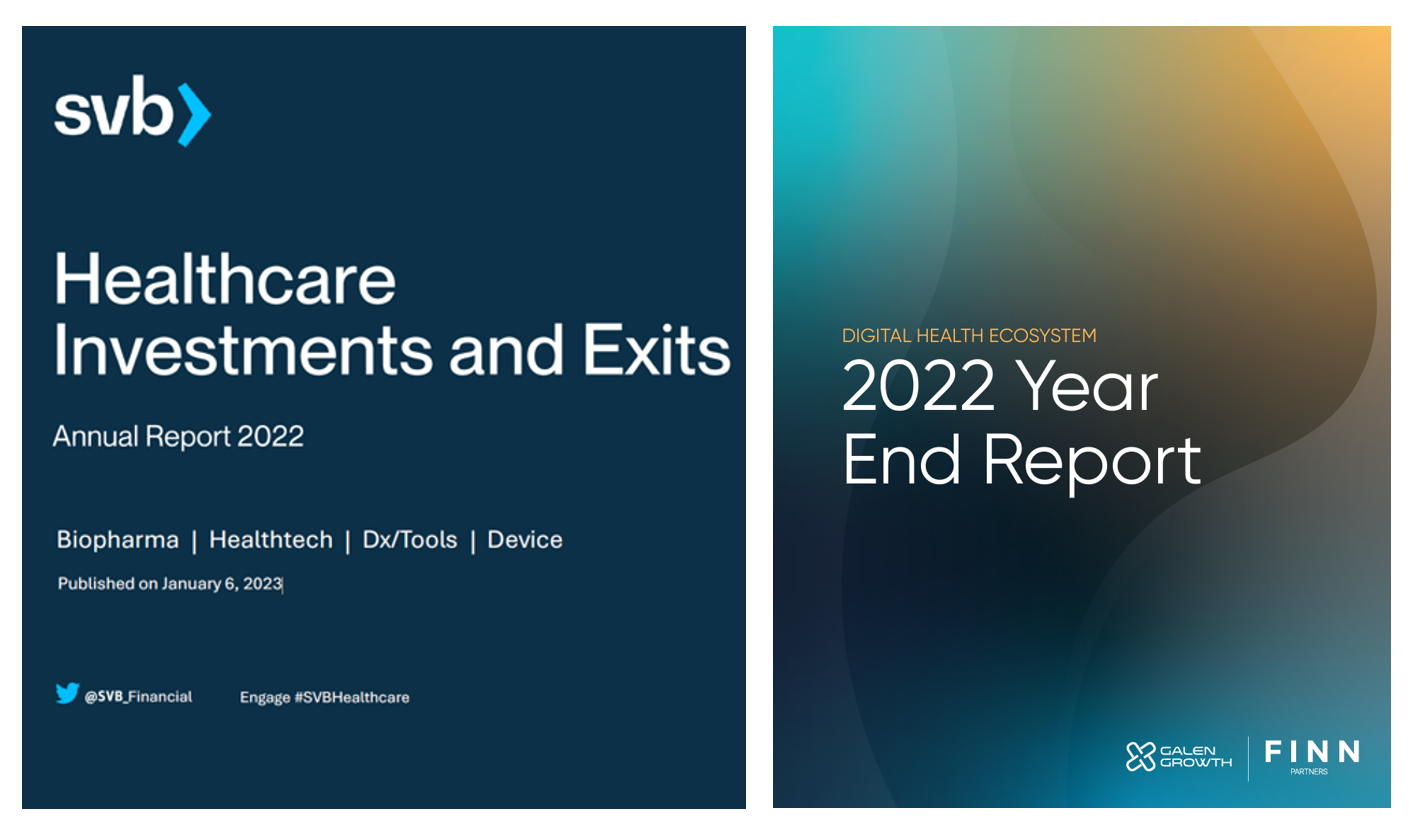
As we enter the week’s brainstorms and deal-making prospects this week at the annual JP Morgan meet-up for healthcare, I’m kicking off Health Populi’s posts this week by diving into two major reports published in sync with this meeting that’s so pivotal and important for the digital health community: the Silicon Valley Bank (SVB) 2022 Annual Report on Healthcare Investments and Exits and the 2022 Global State of Digital Health Report from FINN Partners and Galen Growth SVB notes that venture funding in healthcare fell in terms of both deals and dollars each quarter
The Heart Health Continuum at #CES2023 – From Prevention and Monitoring to Healthy Eating and Sleep
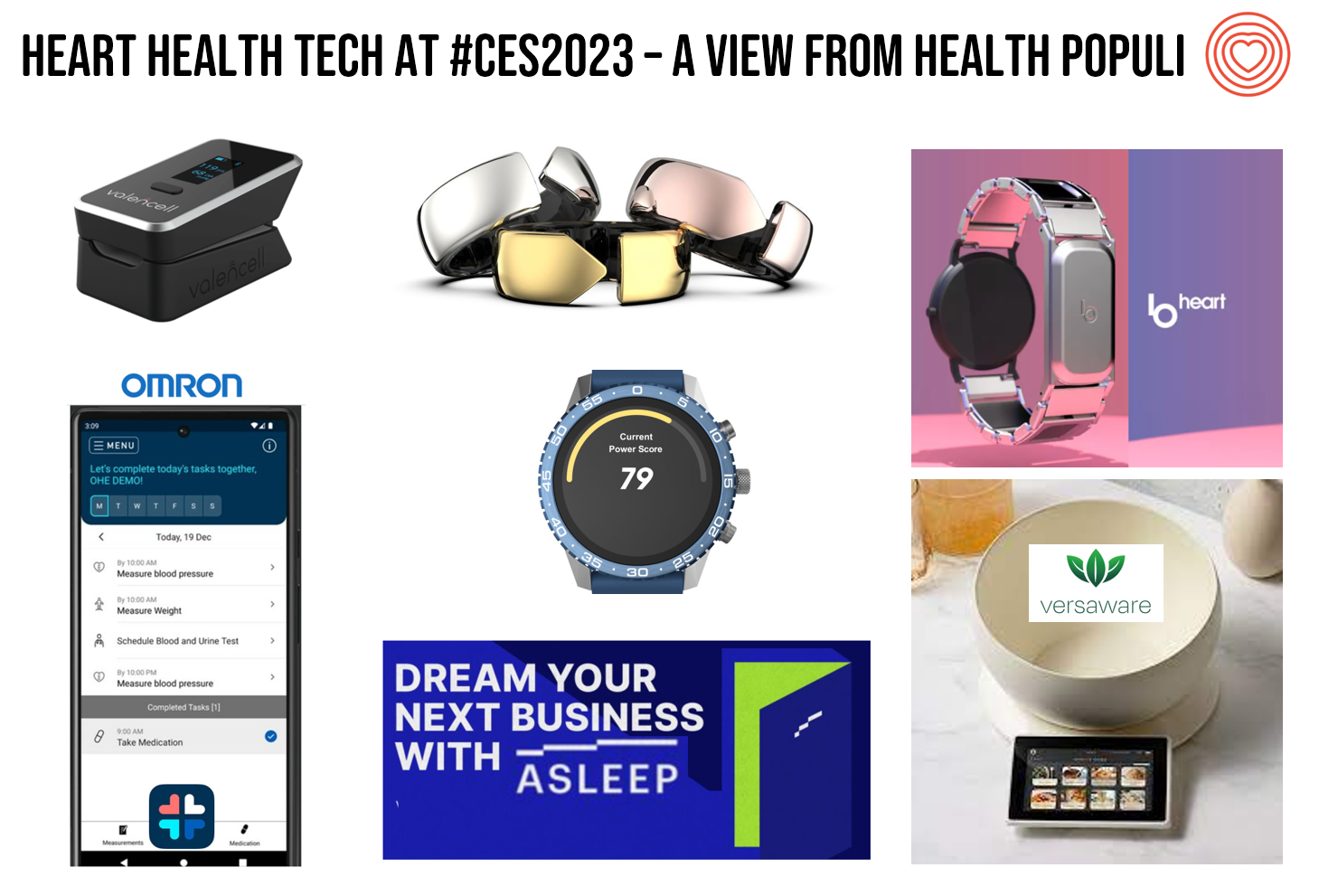
“Are we losing the battle against heart disease?” asks the lead article featured in the January 2023 issue of the AARP Bulletin. “Despite breathtaking medical advancements since President Harry Truman declared war on heart disease 75 years ago, researchers have observed a disturbing trend that started in 2009: America’s death rate from heart-related conditions is climbing again,” the detailed essay explains. AARP is in fact a very visible stakeholder in the 2023 CES, collaborating on the AgeTech content track at the tech conference. The track covers all aspects of aging well, from financial health to entertainment,
Consumers Continue to Lean Into Digital Services: Beyond Tech and Hardware at #CES2023
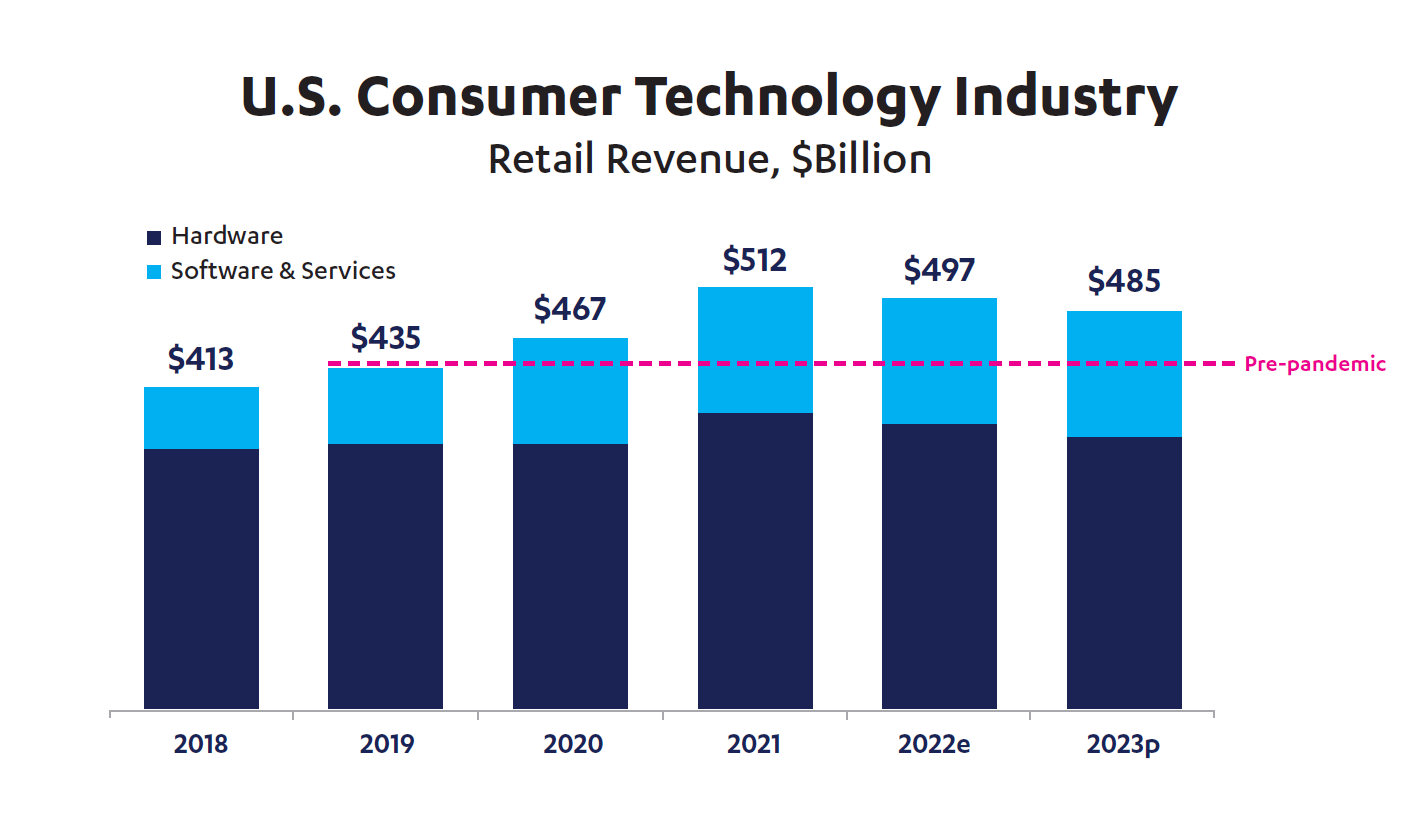
While CTA forecasts a sobering consumer technology revenue picture for 2023, one of the few bright spots is health and fitness technology services, expected to increase by 9 percent in 2023. For the forecast, CTA looked at various spending categories, including gaming, automotive and transportation tech, video and audio streaming, consumer electronics (like big-screen TVs), and fitness and health devices. The chart illustrates that consumers’ spending on software and services is expected to hold steady in 2023, still above pre-pandemic levels. On 3 January, in the annual #CES
Your Home as Clinical Lab: Withings Brings “Your Urine, Your Self” to #CES2023
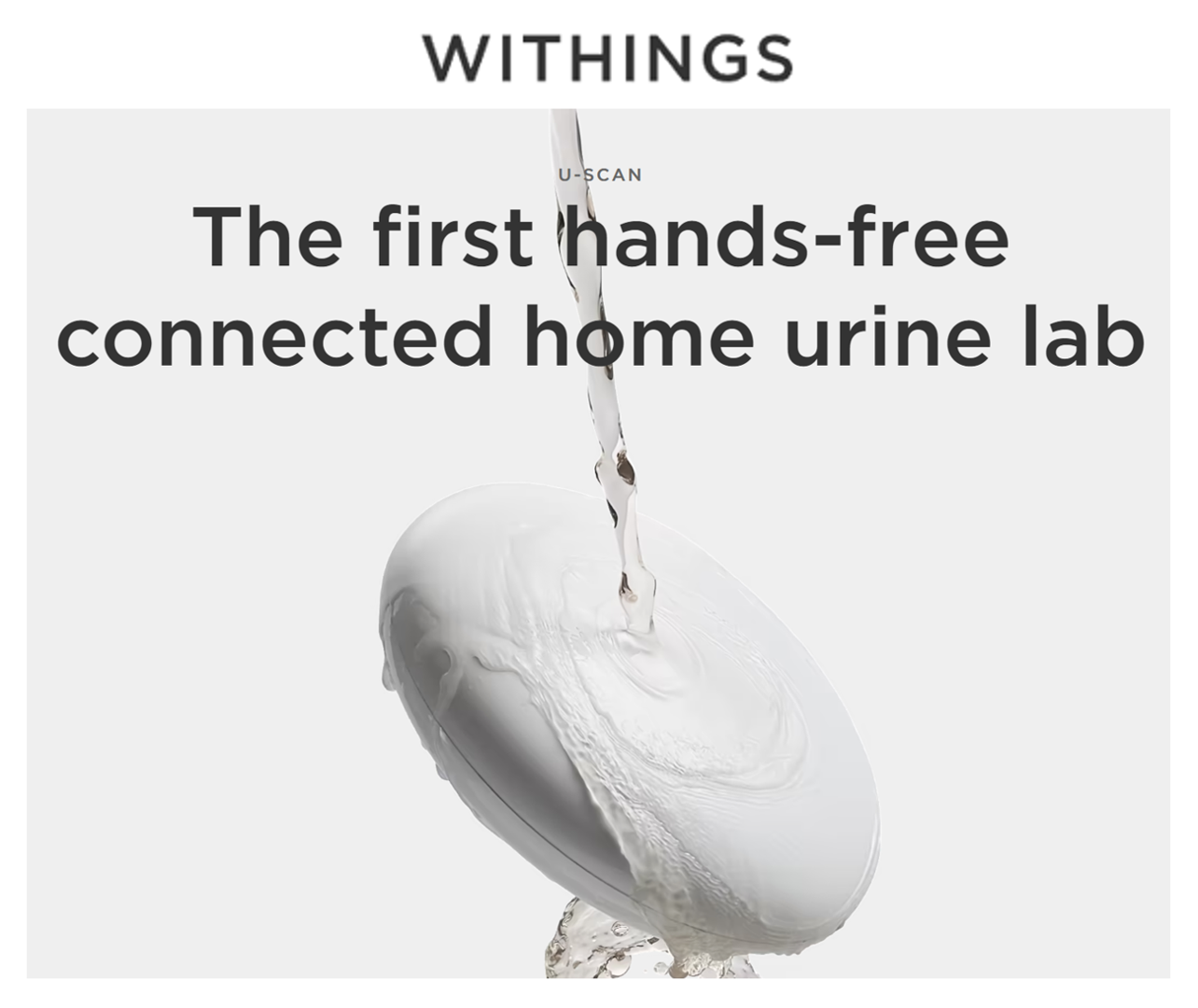
We’ve all been morphing our homes into our personal HealthQuarters since the start of the coronavirus era. Millions of global health citizens have taken to telehealth who never used a health care “digital front door” before. Other patients adopted remote health monitoring to avoid perennial visits to doctors for managing chronic conditions like diabetes or heart disease. From the kitchen to the bedroom, our homes have become our health hubs. And now, to the bathroom and specifically, the toilet. Withings, maker of my personally favorite connected weight scale, announced U-Scan, a direct-to-consumer lab test platform that analyzes our urine from
Can Consumer Electronics Help Stem the Decline of U.S. Life-Years? A Preface for #CES2023
Life expectancy in the U.S. dropped nearly three years between 2019 and 2021, from close to 79 years down to 76. We ended 2022 with this new, sobering statistic from the Centers tor Disease Control (CDC). We begin 2023 with the opening of CES 2023, the world’s largest annual meet-up of consumer electronics innovators, companies, and retailers. How can digital health and other consumer-facing technologies help our health? First, consider the stark data point(s), and then we can better respond to the question’s answer in the Hot Points, below. In case you
In 2023, We Are All Health Consumers in Search of Value
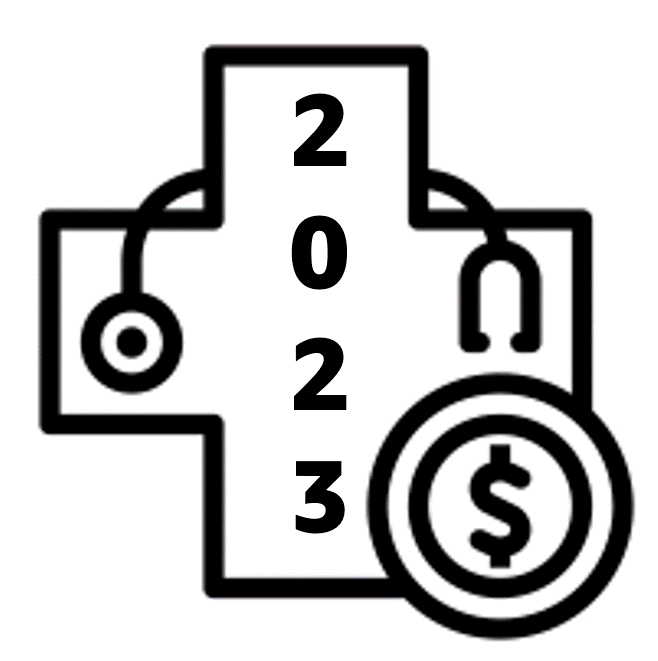
Every health/care industry stakeholder will be in search of value in 2023, I explain in my latest post written on behalf of Medecision. In this essay, I forecast what’s ahead for hospitals, digital health innovators and investors, employers, pharma, and patients-as-consumers — all firmly focused on value in the new year. “Inflation may make consumers and the healthcare system sicker,” Deloitte expects, signaling a sort of “unrest” for the healthcare ecosystem. One of the most telling data points I include in my assessment of 2023 comes from GSR Ventures, which polled major health care investors on
When Household Economics Blur with Health, Technology and Trust – Health Populi’s 2023 TrendCast
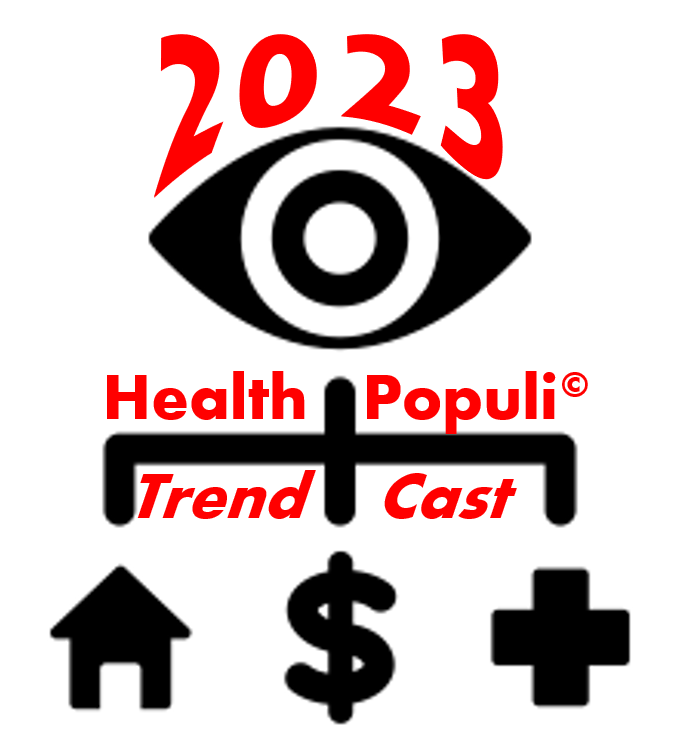
People are sick of being sick, the New York Times tells us. “Which virus is it?” the title of the article updating the winter 2022-23 sick-season asked. Entering 2023, U.S. health citizens face physical, financial, and mental health challenges of a syndemic, inflation, and stress – all of which will shape peoples’ demand side for health care and digital technology, and a supply side of providers challenged by tech-enabled organizations with design and data chops. Start with pandemic ennui The universal state of well-being among us mere humans is pandemic ennui: call it languishing (as opposed to flourishing), burnout, or
Our Homes as HealthQuarters – Finding Health and Well-Being at CES 2023
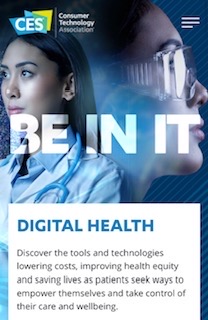
For over ten years, digital health technology has been a fast-growing area at the annual CES, the largest convention covering consumer electronics in the world. When the meet-up convenes over 100,000 tech-folk in Las Vegas at the start of 2023, we’ll see even more health and self-care tools and services at #CES23 — along with new-new things displayed in aisles well outside of the physical space on the Las Vegas Convention Center map labeled “digital health” at this year’s CES in the North Hall. Some context: my company has been a member
Site-Shifting: the Consumer-Driven Pressure on Traditional Healthcare Utilization
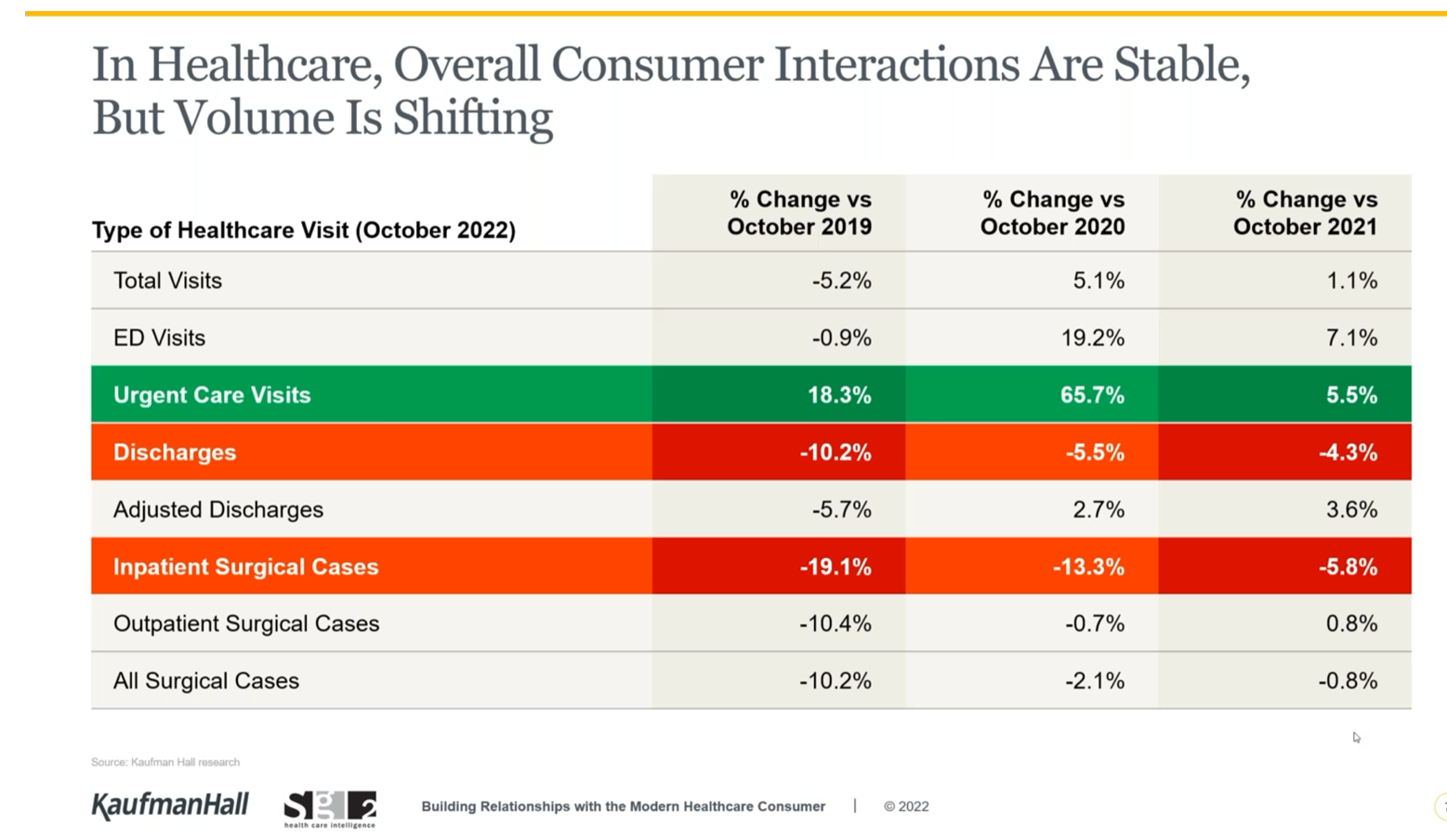
While overall U.S. consumers’ utilization of health care has been pretty stable, the type of visit encounters is shifting away from hospital inpatient cases to ambulatory care, urgent and retail health care sites, data from Kaufman Hall and Sg2 tell us. The companies shared insights in a session on Building Relationships with the Modern Healthcare Consumer last week, warning that hospitals are facing economic challenges with implications on how they should engage and interact with patients in the coming months and years. Wearing a consumer-centric lens, Dan Clarin of Kaufman Hall and Charlotte Brown-Zalewa
Show Me The Evidence and The ROI: Digital Health Investing in 2023 via GSR Ventures
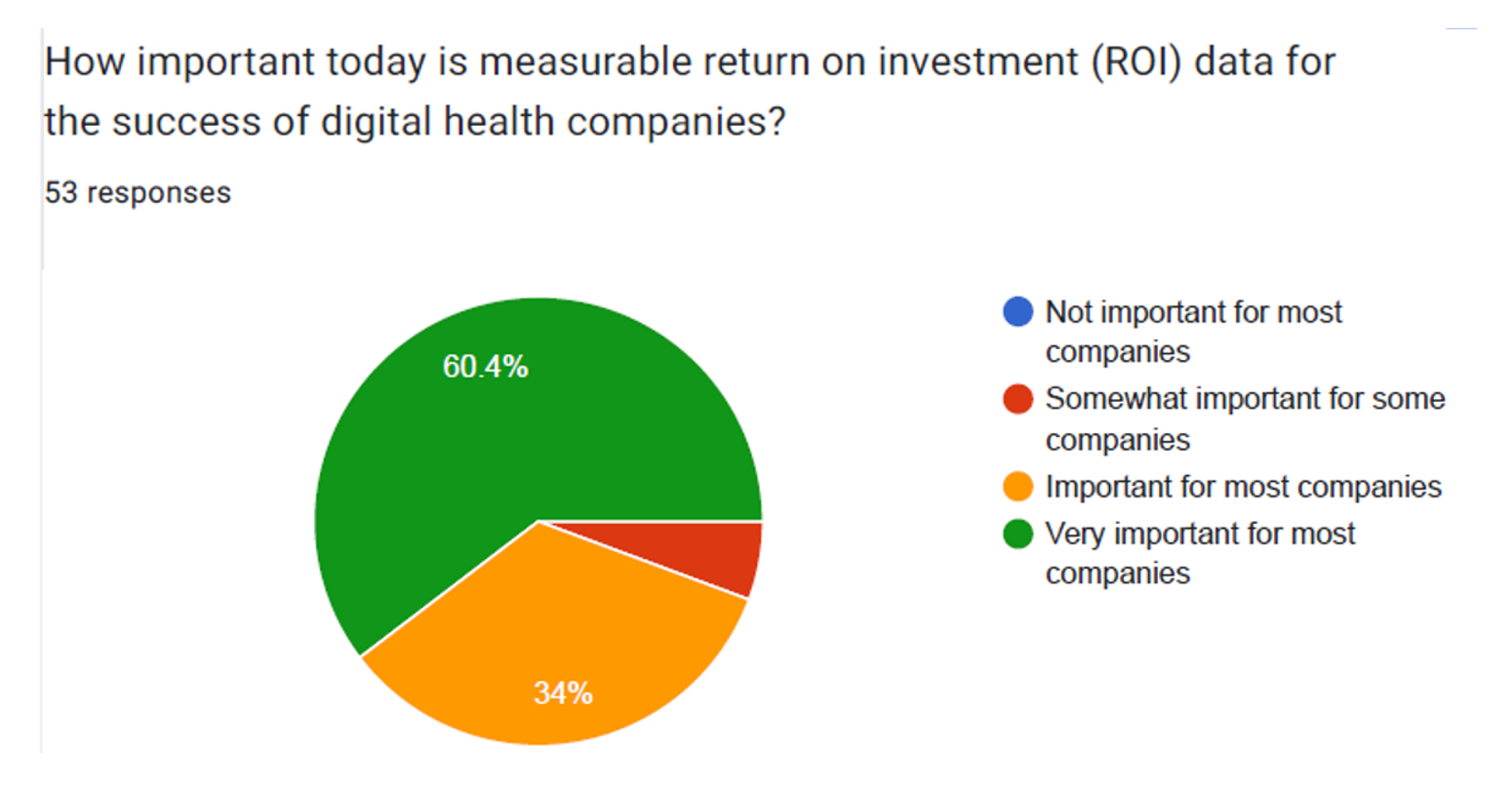
With valuations of digital health companies expected to decline in 2023, investors in the sector are Missourian in spirit in “Show Me” mode: here, it’s all about the clinical evidence and ROI, according to a survey from GSR Ventures. conducted among over 50 major digital health venture capital investors. Most of the 50+ responses to the survey expect that in 2023, valuations for digital health companies will decrease by over 20%: that’s a net of 83% including 60% expecting valuations to fall 20-40%, and 23% anticipating declines of over 40% of valuations in the next
Digital Tech Holds Great Promise for Expanding Patient Access, Health System Leaders Say
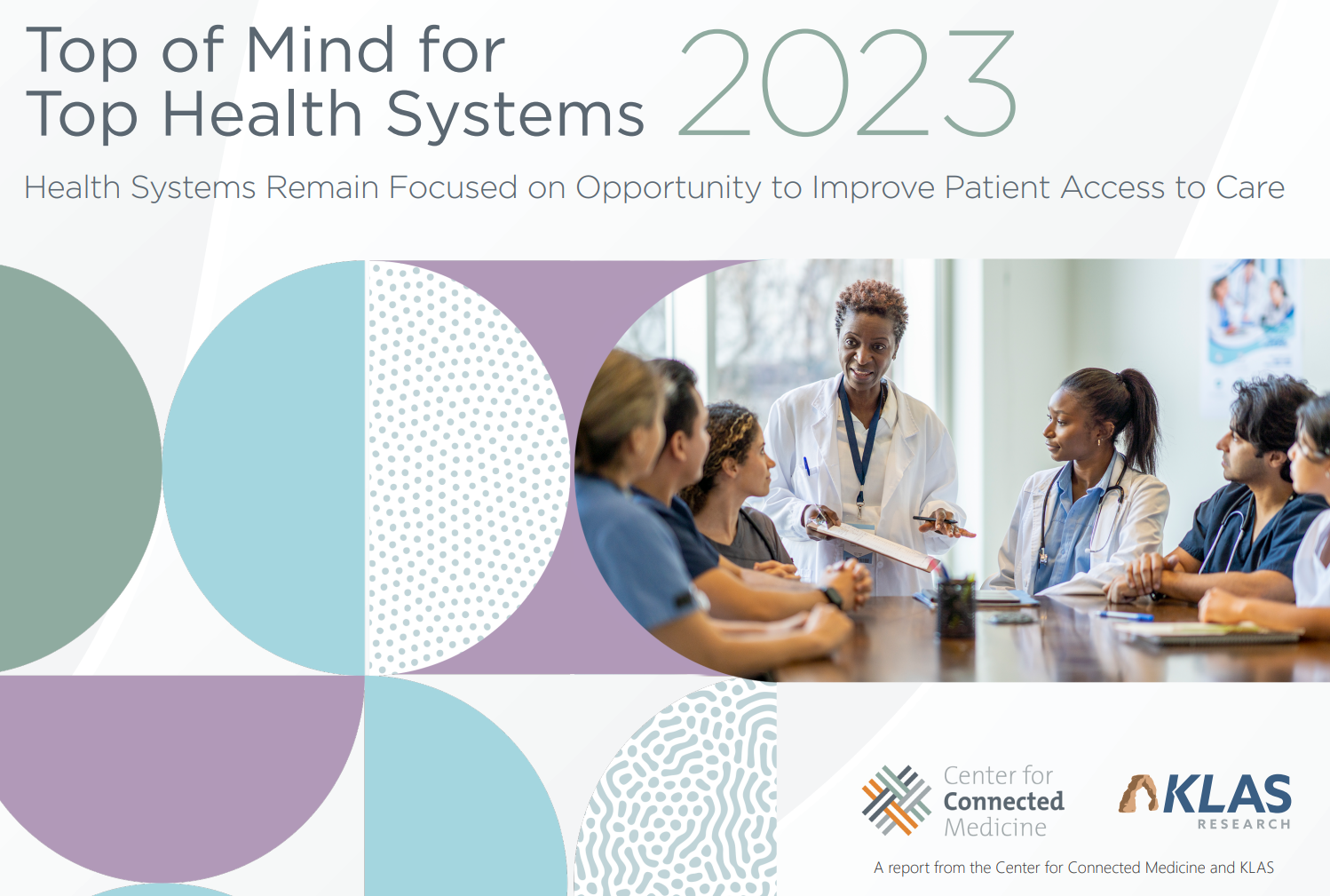
Among all of the challenges health care providers will face in 2023, digital health tools could have the greatest potential to improve patient access, according to the issues most Top of Mind for Top Health Systems 2023 from UPMC. the Center for Connected Medicine, Nokia and KLAS Research. KLAS surveyed the views of 61 health system leaders to assess their perspectives on health care access, costs, telehealth, and artificial intelligence looking toward the next year of health care operations. The challenge of patient access is emerging as top-of-mind for CxOs some of
Omnichannel, Hybrid Health Care Is Happening – Let’s Bake It with Access and Equity
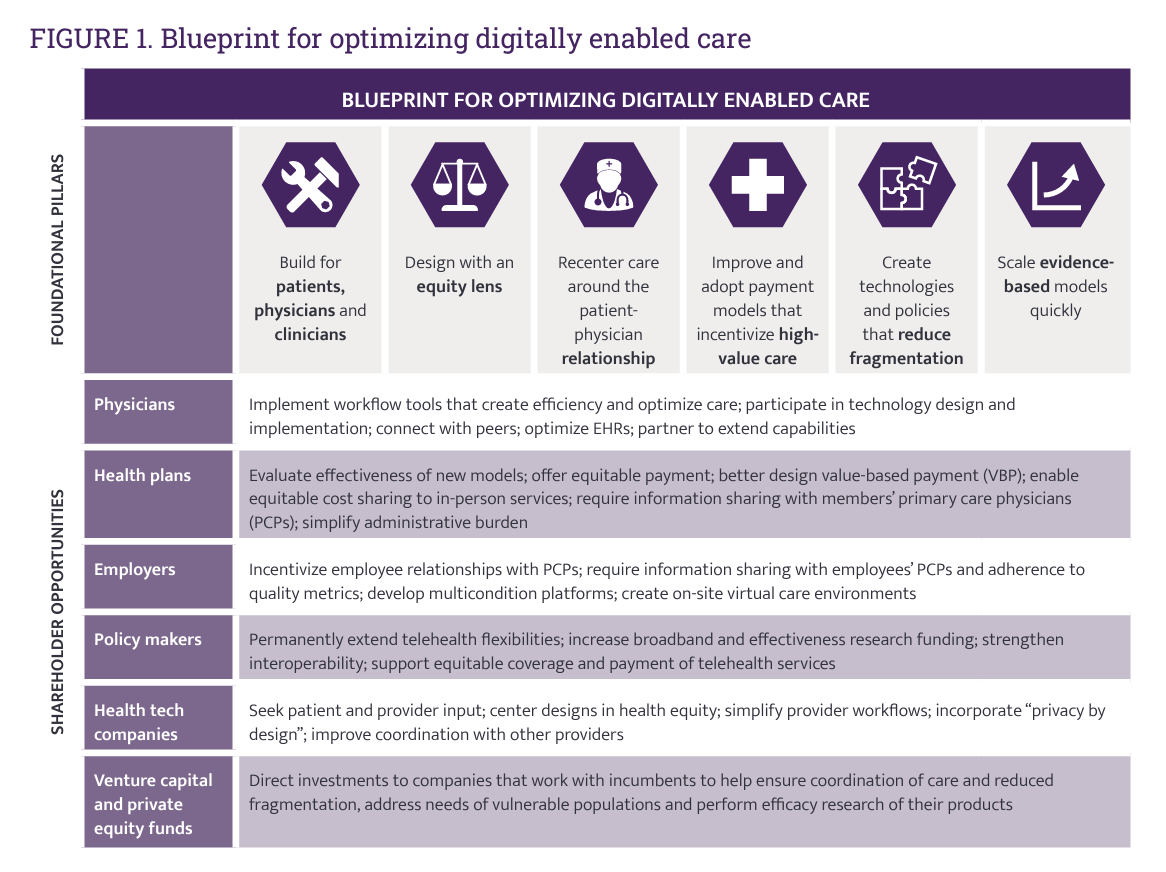
In just the past few months, we’ve seen the launch of Amazon Care, Instacart adding medical deliveries, and The Villages senior community welcoming virtual care to their homes. Welcome to the growing ecosystem of hybrid health care, anywhere and everywhere. In my latest post on the Medecision portal, I discuss the phenomenon and examples of early models, focusing in on Evernorth, a Cigna company. As we add new so-called “digital front doors” to health care delivery, we should be mindful to design in access and equity and avoid further fragmentation of an already-fragmented
The Tik Tok’ing of Medical Mis-Information: Doctors’ and Patients’ Roles in Curating Healthy Advice
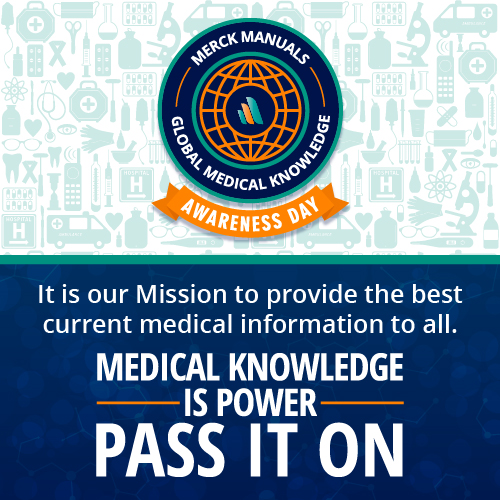
Doctors in the U.S. believe that the medical mis-information problem is worsening, learned in survey research from Merck Manuals. Doctors and patients, both, have roles to play in addressing medical misinformation online. Less than half of consumers, 44%, said that that there is more medical mis-information online than previously. That’s less than half of the percentage of doctors saying so — 98%, virtually all U.S. physicians, citing the problem. There were several disconnects noted in the Merck Manuals study showing starkly different perceptions of health information online between doctors and patients:
Dr. Santa Intends to Deliver Consumer Health-Tech for the 2022 Holidays
Even as consumers’ confess a tighter spending economy for 2022 holiday shopping, peoples’ intent to buy wearable tech for health and fitness and other wellness devices appear on gifting lists in the U.S., according to the 29th Annual Consumer Technology Holiday Purchase Patterns report from the Consumer Technology Association (CTA). In general, technology will be a top-selling category for 2022 holiday gift-giving, somewhat tempered by inflation and the increased cost of living that challenge household budgets in the fourth quarter of 2022. Tech spending will be down about 6% in 2022 according to CTA’s
In Search of Clinical Effectiveness, But “Investment Exuberance?” Not So Much. Insights From FINN Partners and Galen Growth at HLTH 2022
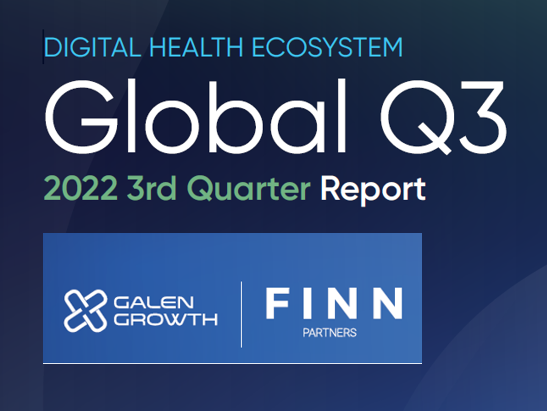
While venture funding for digital health technology declined globally by 35% in the first three quarters of 2022 compared with 2021, this marks a “return to normal” based on the assessment in the Global State of Digital Health Report from FINN Partners and Galen Growth, published today and launched during the HLTH 2022 conference. The report analyzes data from over 12,000 digital health ventures tracked by Galen Growth’s HealthTech Alpha platform. The first chart illustrates the change in venture funding by therapeutic area, showing downturns in four of the five areas called
Health Is Social, With More People Using Apps for Physical and Emotional Wellbeing
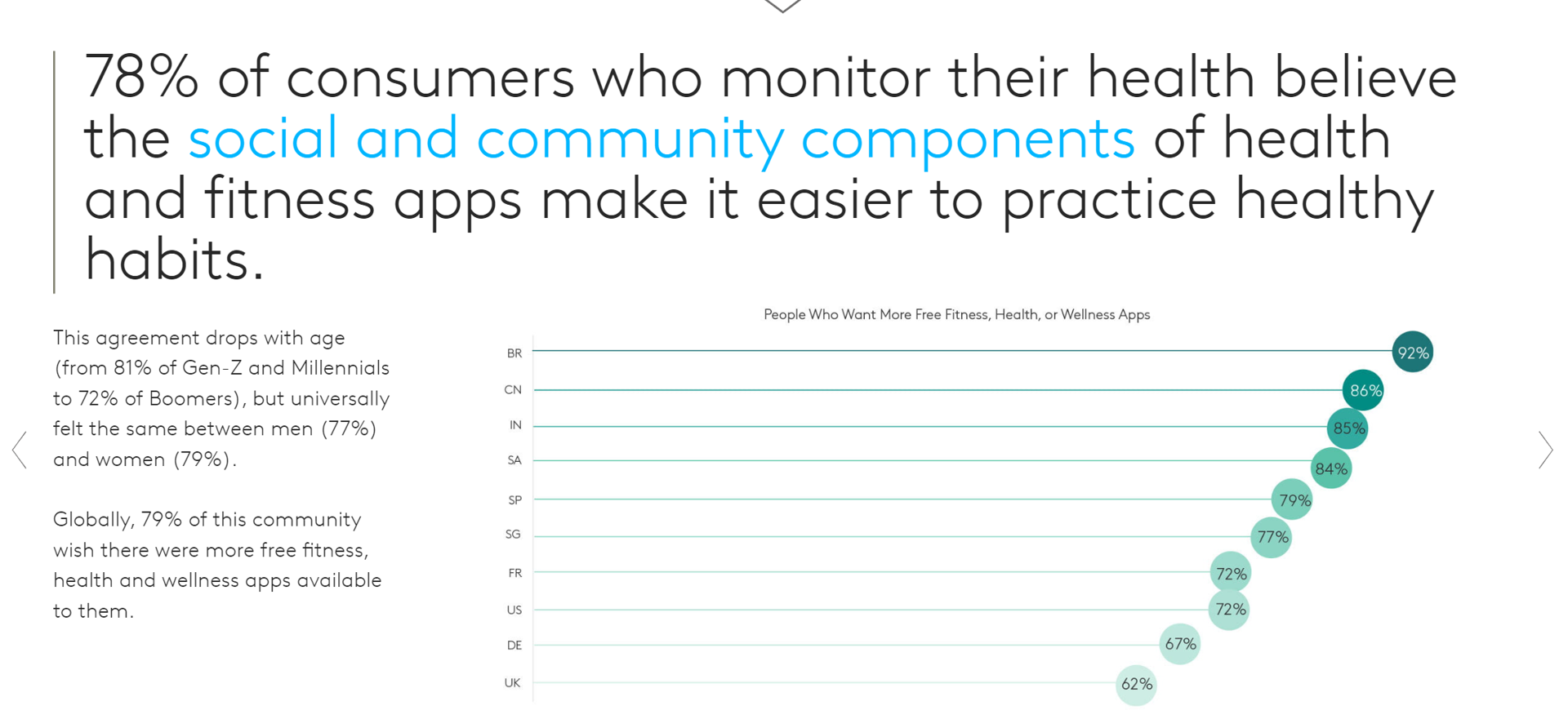
People who need people aren’t just the luckiest people in the world: they derive greater benefits through monitoring their health via apps that make it easier to make healthy choices. Channeling Barbra Streisand here to call out a key finding in new consumer research from Kantar on Connecting with the Health & Wellness Community. Kantar polled 10,000 online consumers in ten countries to gain perspectives on health citizens’ physical and emotional health and the role of technology to bolster (or diminish) well-being. The nations surveyed included Brazil, China, France, Germany, India, Singapore, South Africa, Spain,
Wearable Tech for Health Tracking, Online Dating and Banking: Exploring the “Fluidity” of Peoples’ Data Privacy Views
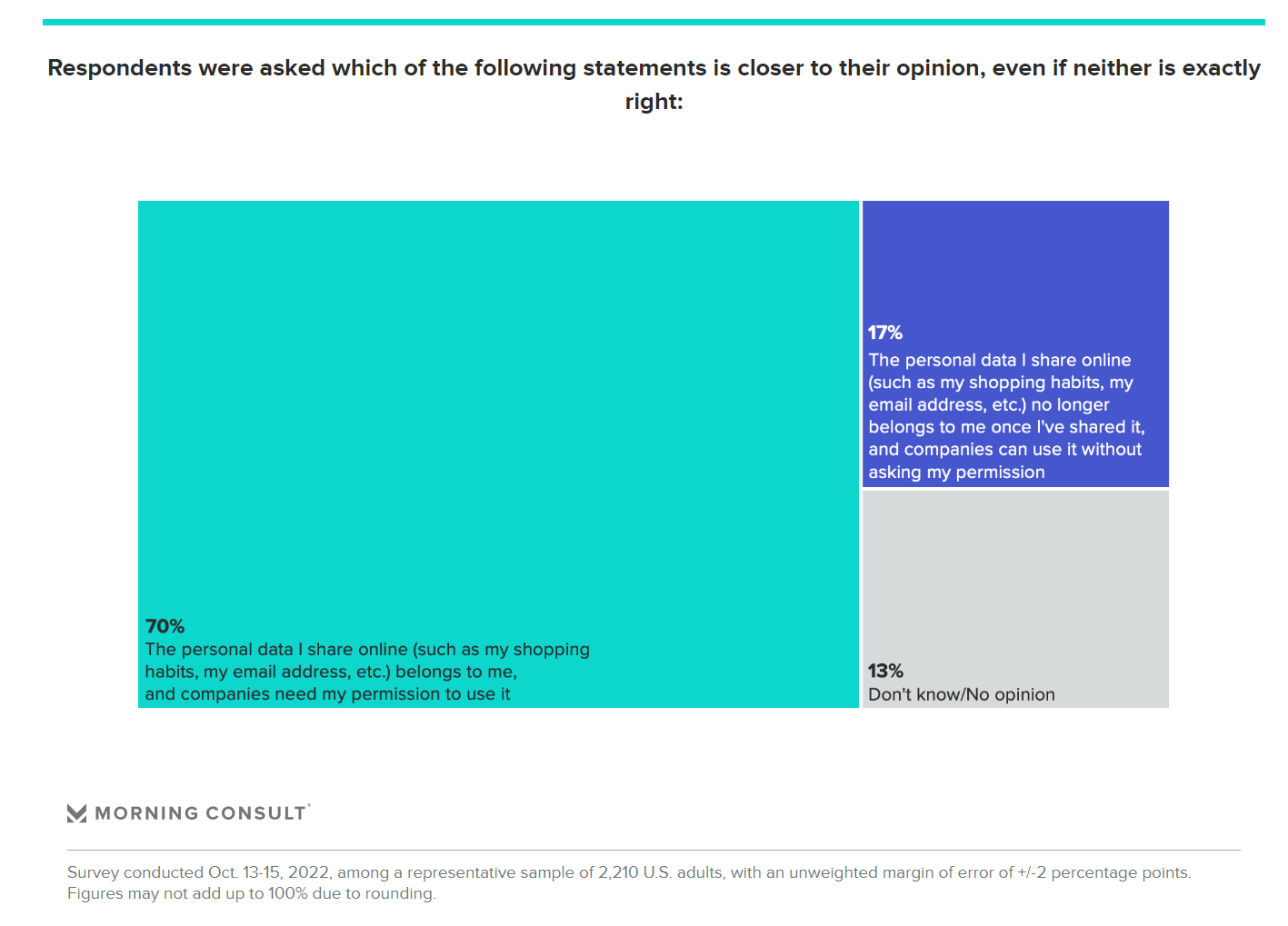
“The security of online data is the top consideration for consumers across many forms of online activities including email, search, social media, banking, shopping and dating”….and using health apps. A new poll from Morning Consult, explained on their website, explains that For Consumers, Data Privacy Has a Fluid Definition. Those privacy nuances and concerns vary by activity, shown in the first chart here from the study. For online banking, the most important consideration among most consumers (55%) is the privacy and security of their online data. Privacy and security of personal data was
Consumers’ Trust In Pharmacists As Providers Grows Along with Omnichannel Health Care
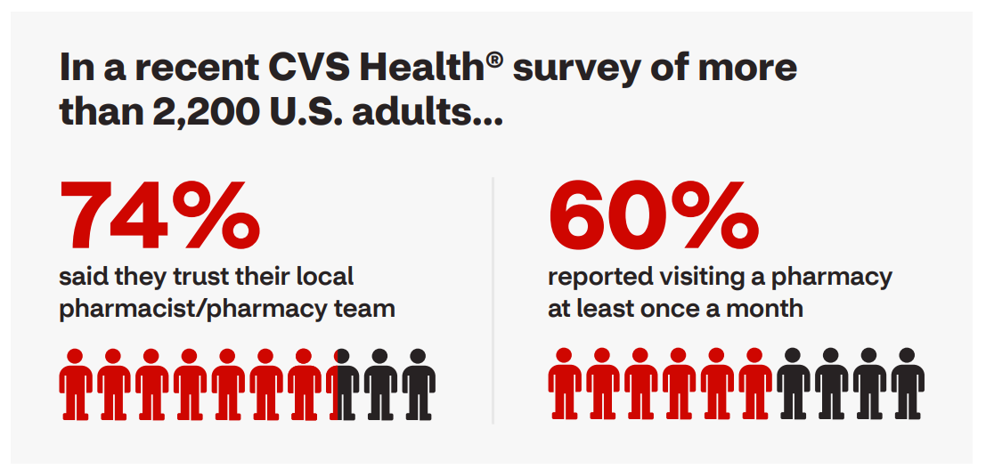
What is a “pharmacy” these days? You might have recently walked into a brick-and-mortar retail pharmacy. Or, you might have refilled a prescription to help you manage a chronic condition, online. Or, perhaps, you asked the pharmacist staffing your favorite grocery store Rx counter to give you the latest vaccine to keep COVID-19 variants at-bay. The pharmacy is all these things, and increasingly digital-first, we learn in The Rx Report: A new day in retail pharmacy, a consumer survey from CVS Health. CVS Health, one of the two largest pharmacies operating in the U.S. in 2021
How Will Consumers’ Declining Trust in Technology Impact Health Tech?
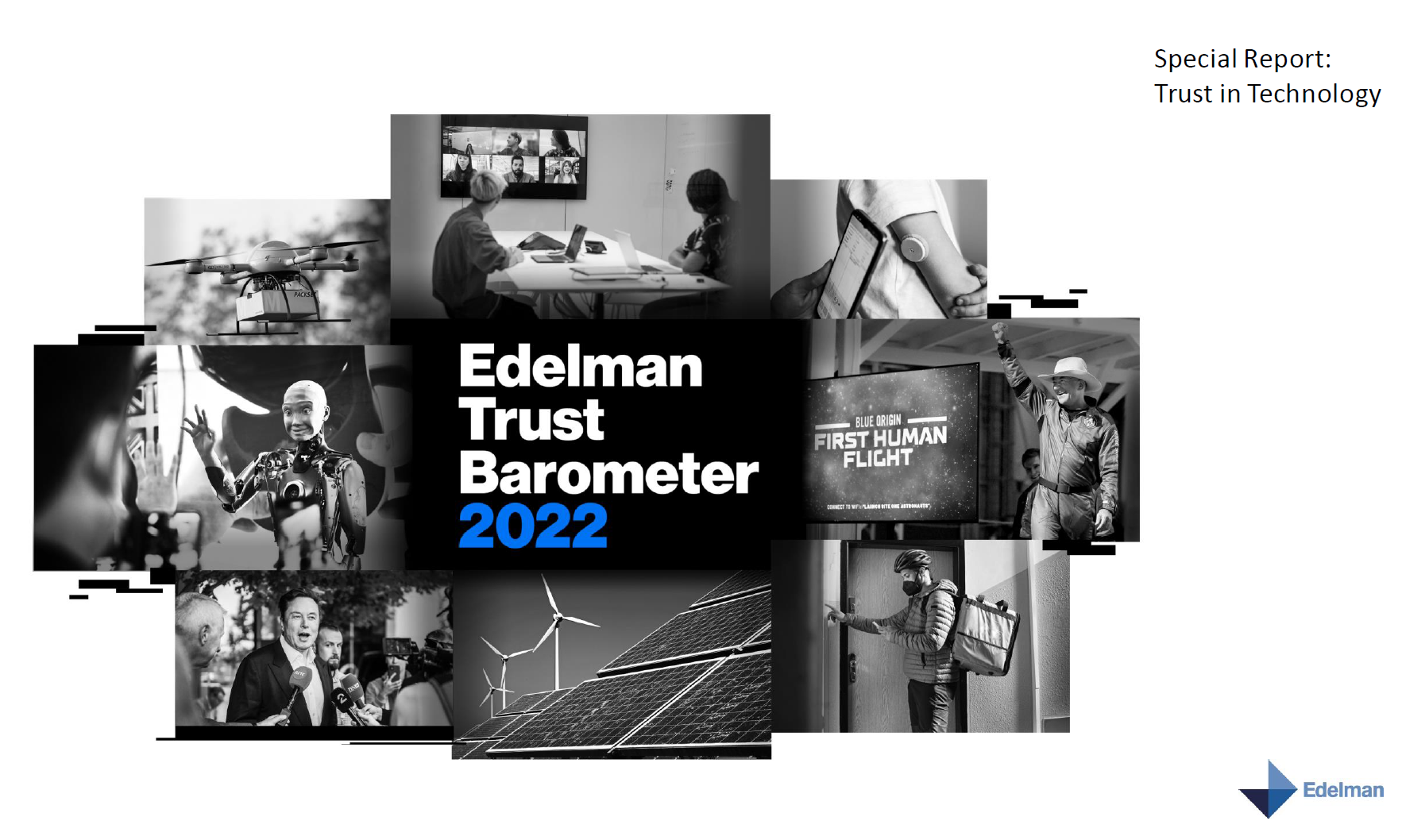
Americans’ trust in technology as “plummeted” in the past decade, according to the 2022 Edelman Trust Barometer’s focused look on trust and technology. How might this play into U.S. health citizens’ trust in digital health technology? To answer that, let’s start with the macro-view on trust in tech. Richard Edelman convened a virtual meeting launch for the Trust Barometer’s tech perspectives yesterday, looking broadly at the global study findings. For these trust-tech insights, Edelman surveyed 15,000 citizens between August 31 and September 12, 2022, residing in 12 countries: Australia, Brazil, Canada, China, France, Germany,
Home Is Where the Health Is: An Update on Connectivity, Food, and Retail
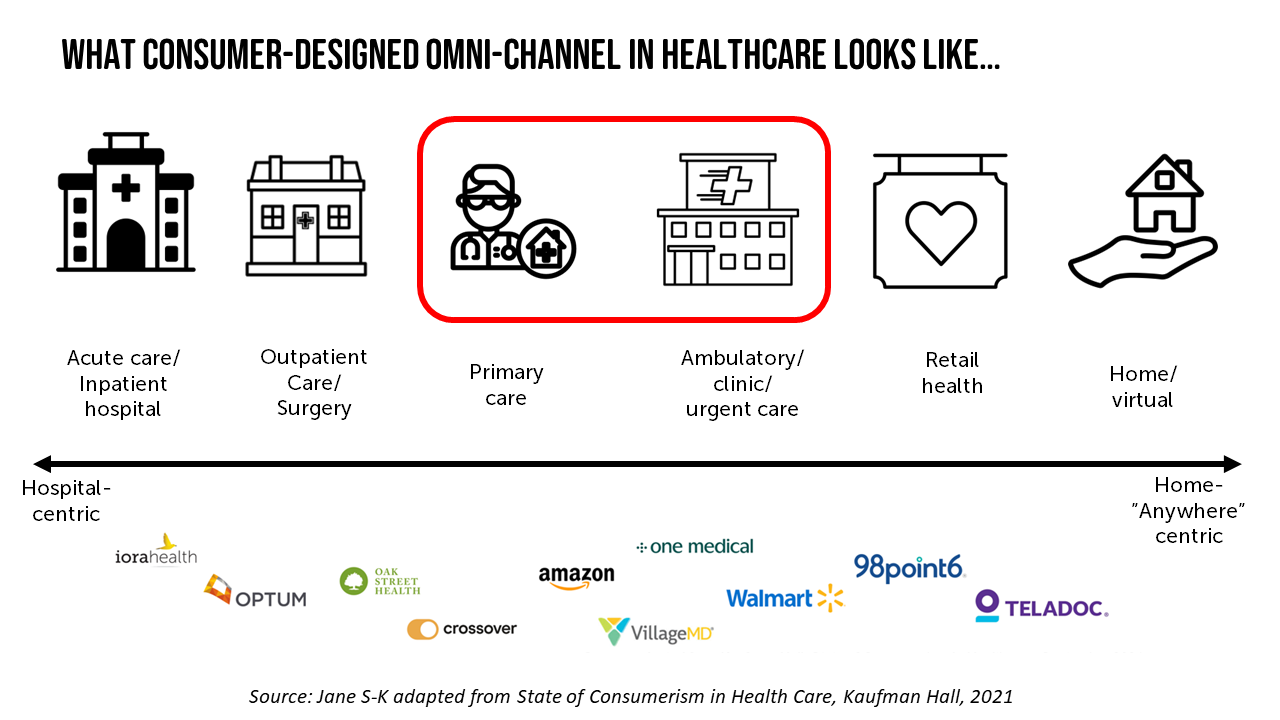
Virtually every closed-door meeting I have had in the U.S. with a client group in the past several months has had a line item on the agenda to brainstorm the impact and opportunity of care-at-home, hospital-to-home, or Care Everywhere. This has happened across many stakeholders in the evolving health/care ecosystem of suppliers, including hospital systems, health plans, grocery chains, retail pharmacy, consumer technology, digital health and tech-enabled providers, pharma and medical supply companies. On October 10, Dr. Robert Pearl, former CEO of The Permanente Medical Group, published a provocative post on Forbes noting that Amazon, CVS, Walmart Are Playing Healthcare’s
Telehealth-As-Healthcare Is a Mainstream Expectation Among Consumers, J.D. Power Finds
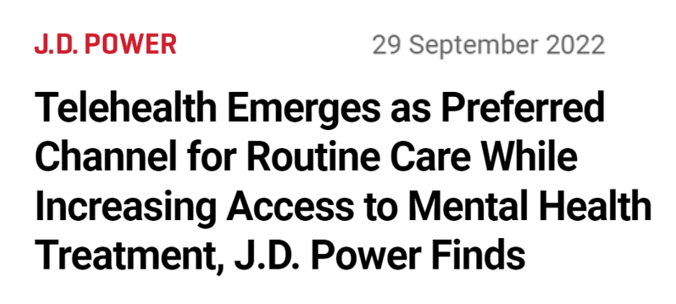
Telehealth has increased access to mental health services, I’ve highlighted this Mental Illness Awareness Week here in Health Populi. But telehealth has also emerged as a preferred channel for routine health care services, we learn from J.D. Power’s 2022 Telehealth Satisfaction Study. Among people who had used virtual care in the past year, telehealth-as-healthcare is now part of mainstream Americans’ expectations as a normal part of their medical care. That’s because 9 in 10 users of telehealth in the U.S. would use virtual care to receive medical services in the future, J.D. Power found in
Connected Wellness Growing As Consumers Face Tighter Home Economics
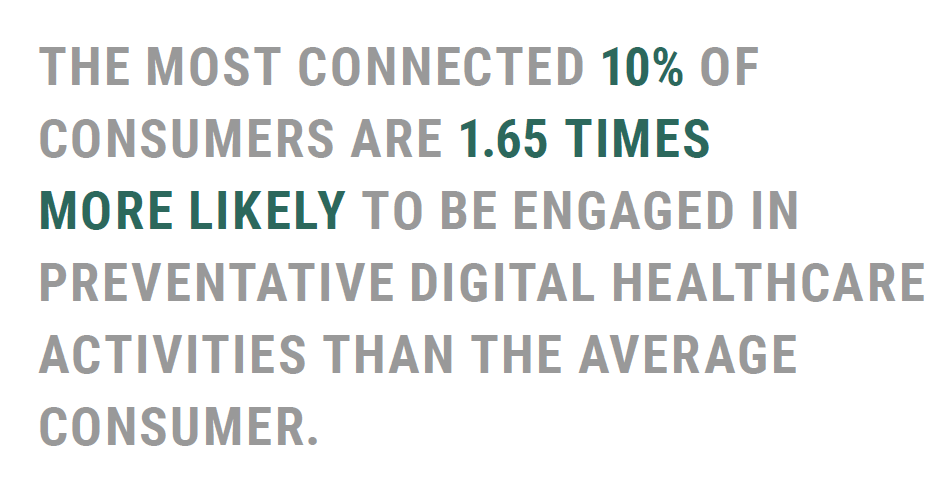
“Consumers are using the Internet to take their health into their own hands,” at least for 1 in 2 U.S. consumers engaging in some sort of preventive health care activity online in mid-2022. The new report on Connected Wellness from PYMNTS and Care Credit profiles American health consumers’ use of digital tools for health care promotion and disease prevention. The bottom-line here is that the most connected 10% of consumers were 1.65 times more likely to be engaged in preventive digital health activities than the average person. Peoples’ engagement with digital health
Big Tech + Digital Health: Even Big-Ticket Mistakes Won’t Dissuade Companies From Healthcare
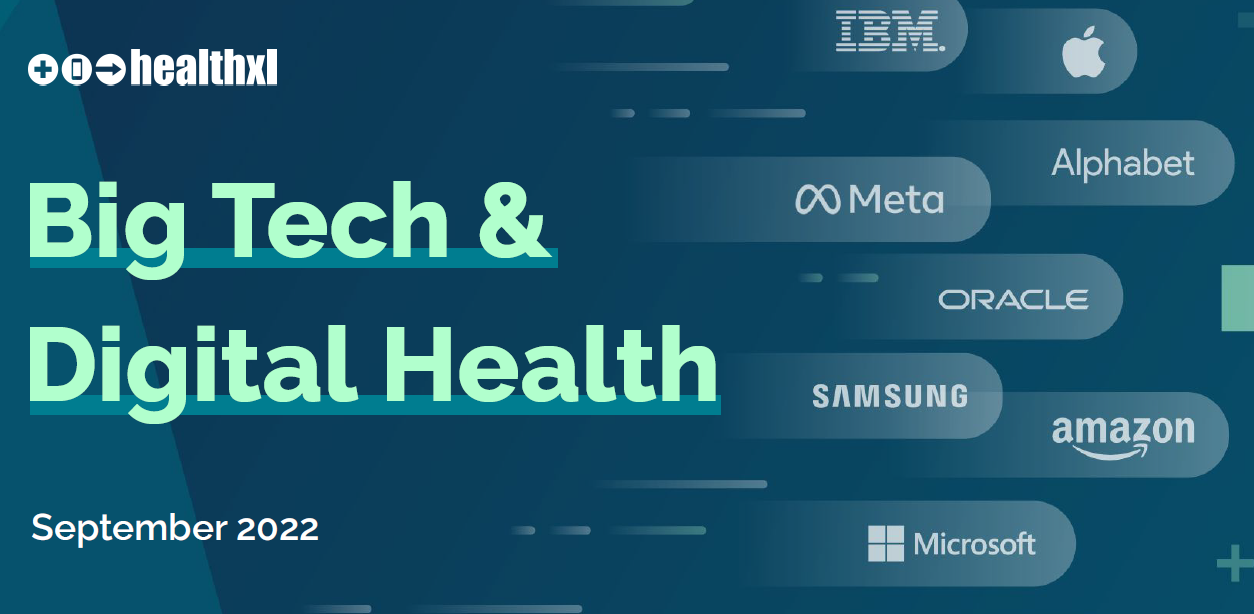
“Big Tech has the capability to disrupt healthcare, though the complexity of healthcare ecosystems is not making it easy for these companies,” according to Big Tech & Digital Health, a detailed update from HealthXL published last week. The pace of activity among Big Tech companies partnering with, investing in, and acquiring health technology and provider organizations has been dizzying, accelerating in and beyond the pandemic. This report profiles the current state and prospects for so-called “Big Tech” companies in the broad health/care ecosystem. For context, “Big Tech” in this report covers activity among eight companies
Health is Everywhere, and Telehealth Is Health – And It’s Personal
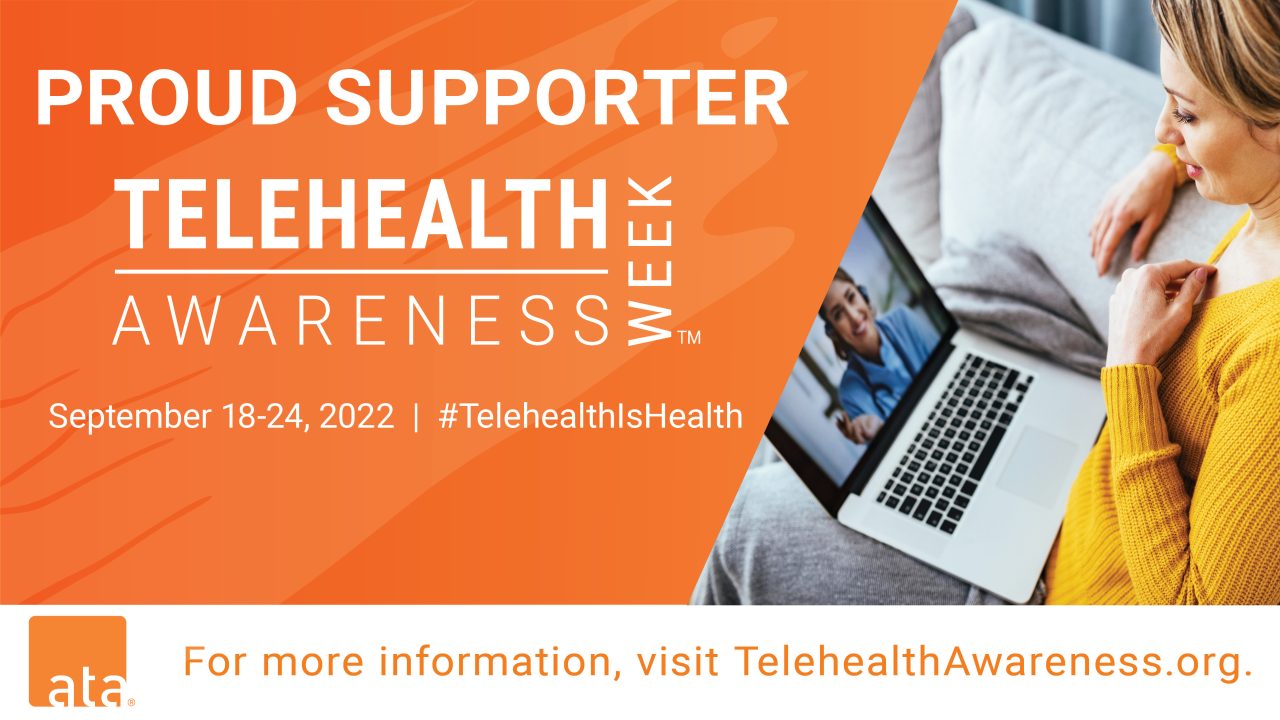
If health is nurtured and made where we live, work, play pray, learn, and shop, then healthcare should be everywhere. That’s the promise, increasingly a reality, of telehealth. We are in the middle of Telehealth Awareness Week, an advocacy program launched by the ATA (American Telemedicine Association) whose mission I share — that #TelehealthIsHealth. Follow that hashtag on Twitter and other social media channels, and you’ll find lots of folks who believe, know, and live this. My personal telehealth journey began with an online encounter in December 1996 when my husband and I were
The Direct Link Between Value-Based Health Care, Digital Transformation and Social Determinants – Insights from Innovaccer and Morning Consult
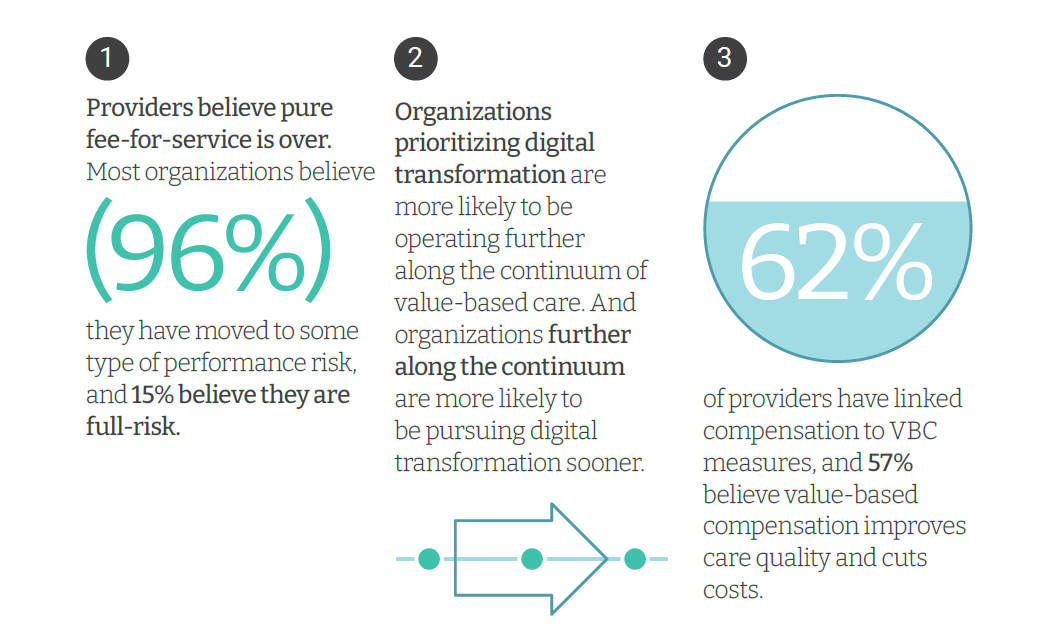
Only 4% of health care payments in the U.S. are pure fee-for-service (FFS) these days. “The end of pure FFS is near,” according to The State and Science of Value-Based Care, a report-out of survey research from Innovaccer and Morning Consult. Innovaccer, a health cloud/data analytics company, worked with Morning Consult to do deep-dive interviews with 75 senior health care executives; research was conducted in November and December 2021, so these perspectives represent those of health system leaders at the start of 2022. The full report is worth your read; my focus in this Health
Physicians More Bullish On the Benefits of Digital Tools for Patient Care, the AMA Tells Us
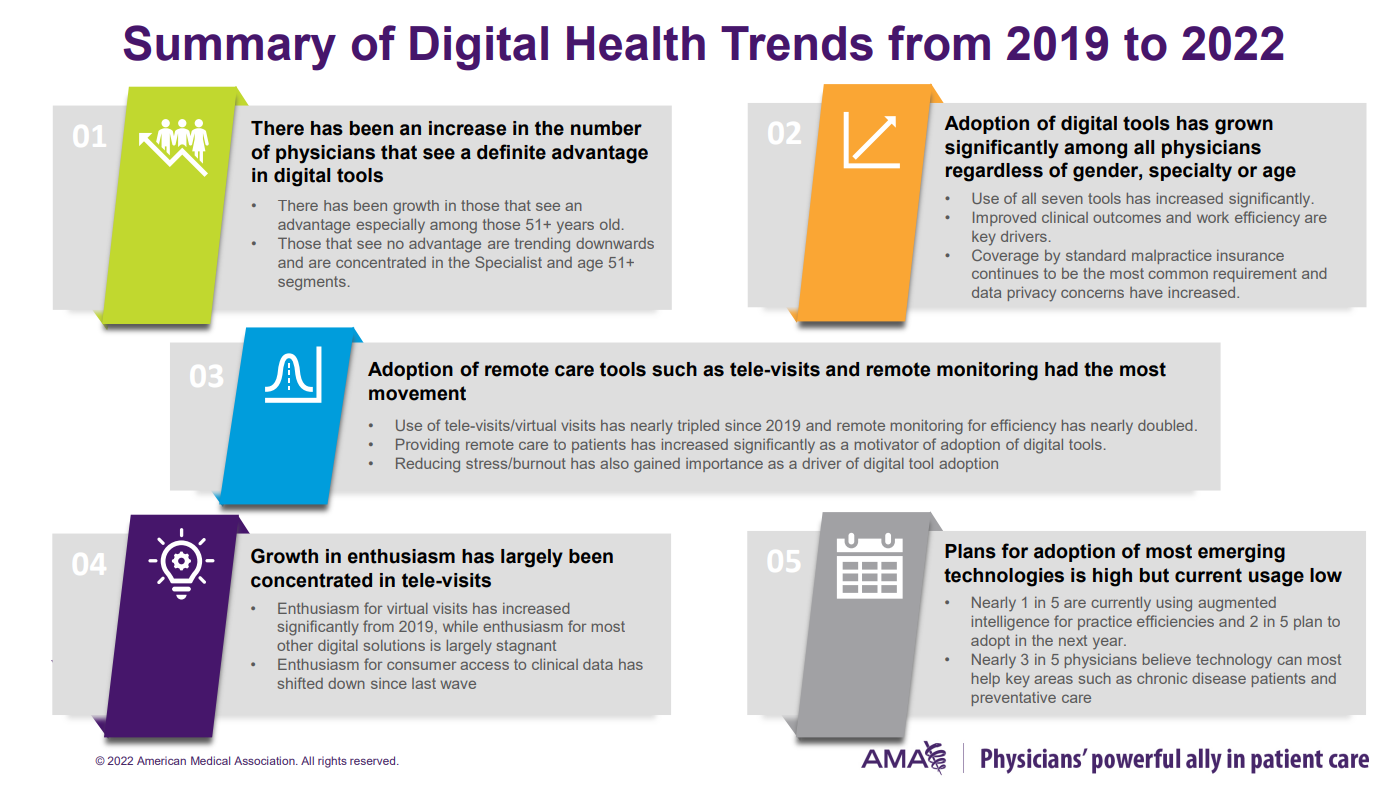
Most doctors see the advantages of digital health tools like telehealth, consumers’ access to their health information, and point-of-care workflow solutions, the American Medical Association found in a survey of 1300 physicians, published in September 2022. The AMA first conducted research with physicians and their views on digital health in July 2016. This year’s study was designed to compare current clinicians’ perspectives with those garnered in the 2016 and 2019 studies. There is a clear and positive shift of doctors’ adoption of and appreciation for digital tools, with “growth in enthusiasm” concentrated in tele-visits, the
As Walmart Allies with LLENA (AI), Food-as-Medicine Blurs with Digital Health Tech and Equity

In a busy week of news in the health care and digital health world, it would be easy to miss a press release published on 23rd August on the food-as-medicine front. But don’t blink this snippet away. It is another strong signal about the growing blur between grocery stores, food, digital tech, and population health. The digital health platform LLENA (AI) announced its collaboration with Walmart to support people managing diabetes with personalized nutrition support from data tracking pulling through to healthy food delivery. Note LLENA (AI)’s tagline: “where AI meets GI for better health.” “LLENA” is
Partnering Up in the Health Care Ecosystem to Drive Transformation – for Organizations and Health Consumers Alike
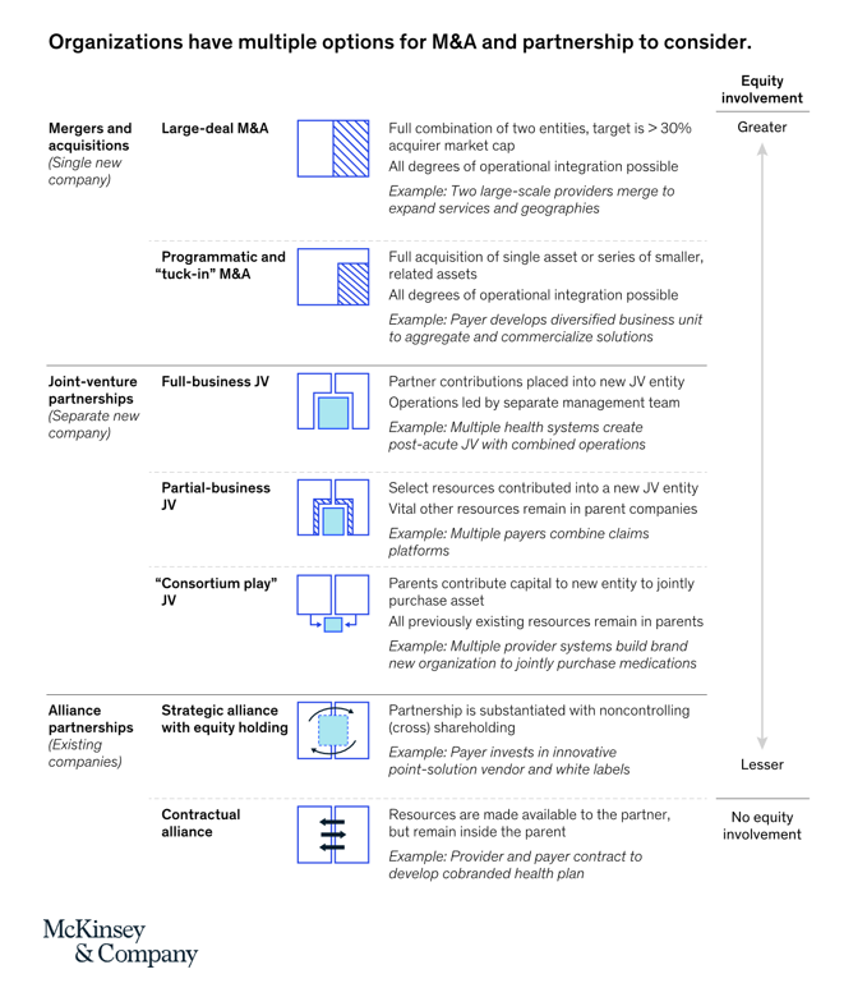
“Partnerships, including JVs and alliances with other healthcare organizations and with new entrants, are just one way to access new capabilities, unlock speed to market, and achieve capital, scale, and operational efficiencies” in health care transformations. “In an environment with continued competition for attractive assets and significant capital in play from institutional investors, these partnerships may also be the most accessible way for organizations to capture value in expanding healthcare services and technology value pools,” we learn in Overcoming the cost of healthcare transformation through partnerships from a team of health care folks with McKinsey & Company.
Hacking Health Care, Your Top Health-Tech Summer Read
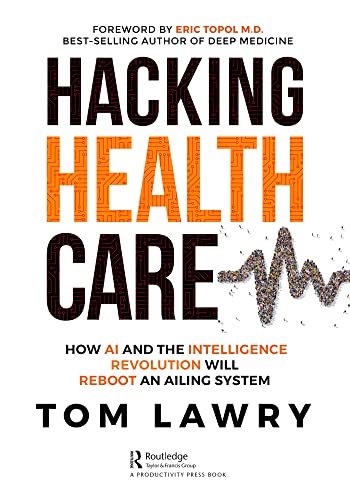
“Tom Lawry reminds us that the health care industry can shift from glacial to warp speed when it needs to. Given the right tools, we can evolve from health systems to systems of health, baked with Responsible Intelligence to do good while embedded with respect, inclusion, and transparency. Health citizens deserve Tom’s vision to emerge,” I wrote in a quote on the back of Tom’s new book, Hacking Health Care: How AI and the Intelligence Revolution Will Reboot an Ailing System. Tom knows whereof he speaks and writes and opines: he has
Consumers’ Blurring Digital Worlds of Health, Learning, Shopping, and Living
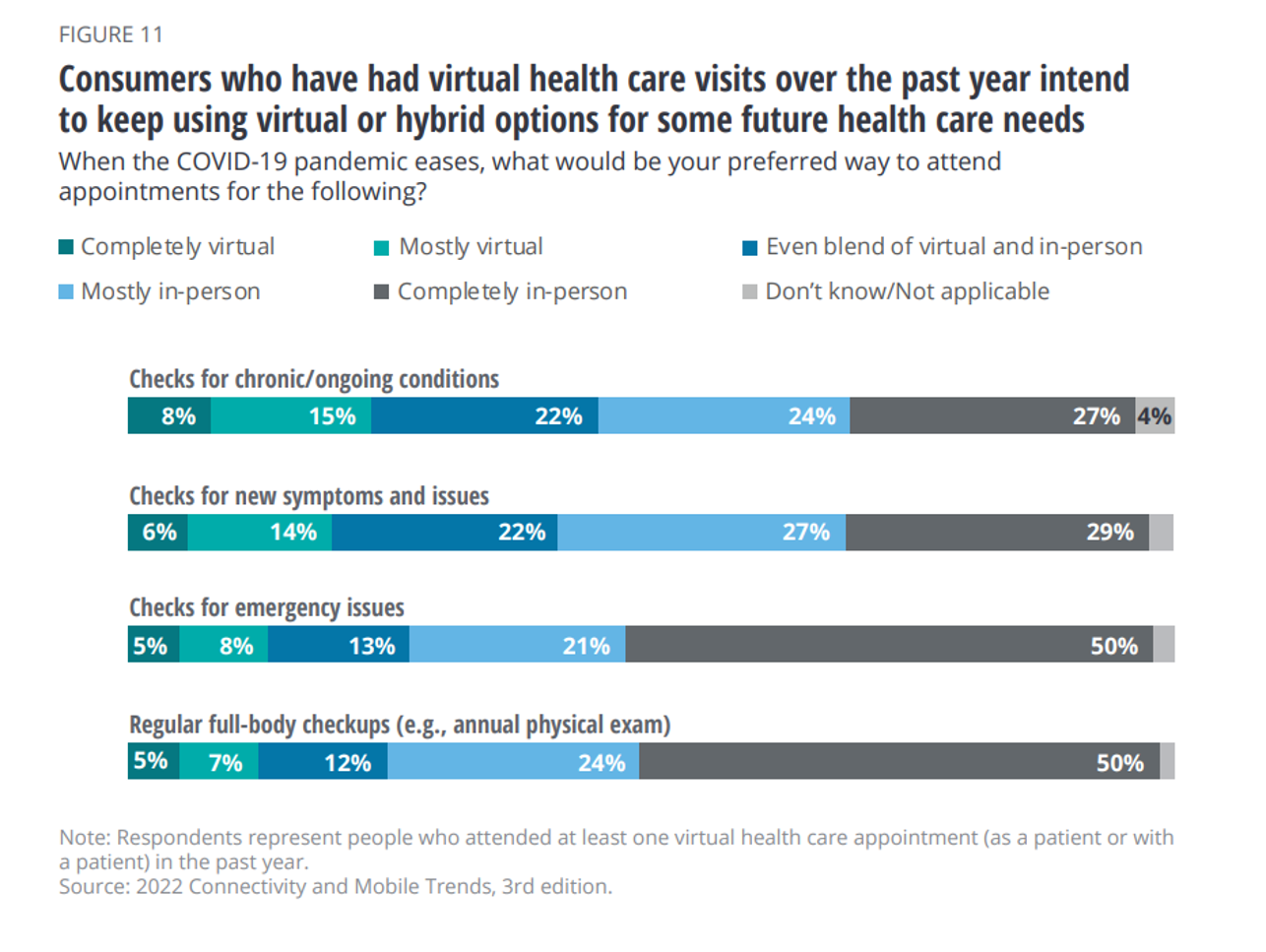
“Almost overnight, lines blurred between consumers’ physical and digital worlds, and home became the headquarters for virtual working, learning, fitness, health care, shopping, socializing, and entertaining.” That blur has reshaped peoples’ Everyday Normal we learn in Mastering the new digital life from Deloitte, a survey conducted among 2,005 U.S. consumers in the first quarter of 2022. The report is part of Deloitte’s ongoing Connectivity and Mobile Trends research in this third iteration. The report covers peoples’ new digital transformations for work, school and health; in this post, I’ll focus on the last element,
“Beyond the Bubble Bath,” Self-Care Must Be Rooted in Science To Build Trust Among Consumers
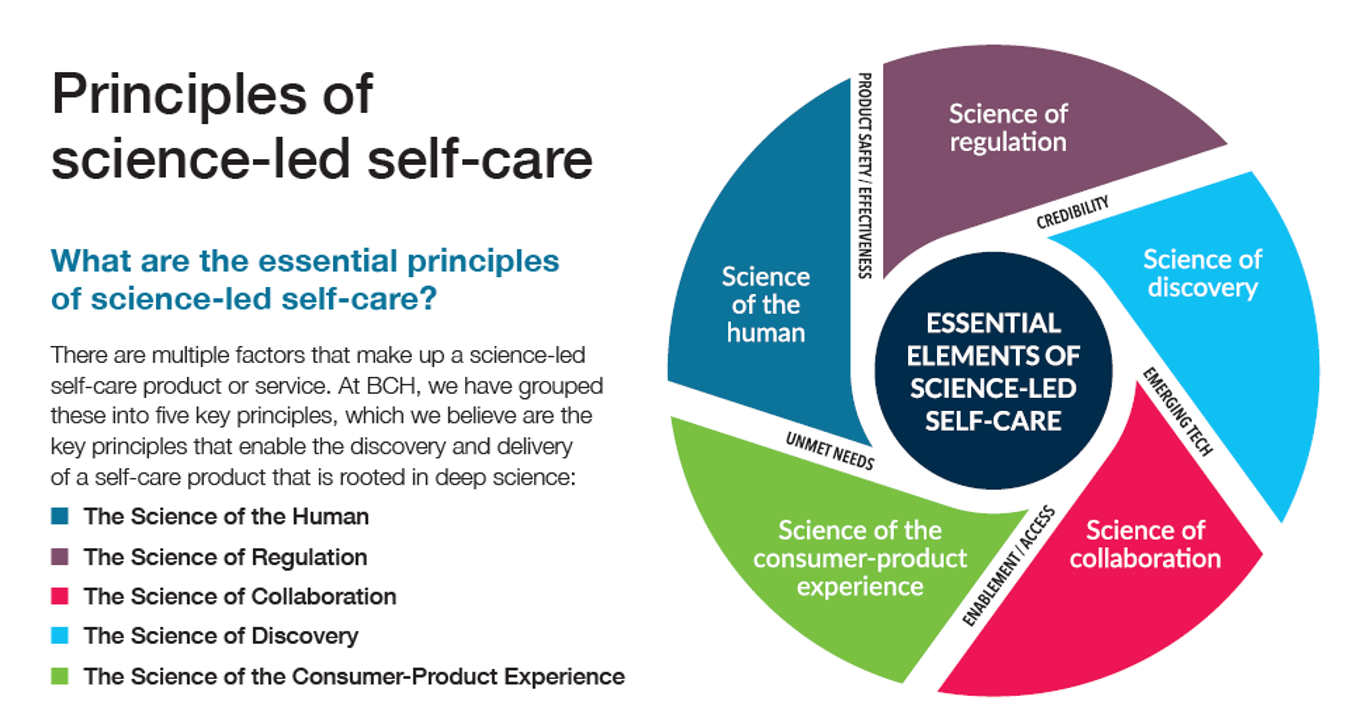
The goal of self-care for health-making is to improve lives by scaling health-and-wellness accessible to all, Bayer believes, giving people more control over their personal health. Self-care work-flows must be based in science to ensure products and services are trusted and deliver on their clinical promise, Bayer explains in Science-Led Self-Care: Principles for Best Practice, a paper published this week which the company intends to be a blueprint for the industry. Bayer recognizes that self-care is growing among health consumers around the world — albeit underpinned by peoples’ cultures, demographics, and “readiness”





 Interviewed live on BNN Bloomberg (Canada) on the market for GLP-1 drugs for weight loss and their impact on both the health care system and consumer goods and services -- notably, food, nutrition, retail health, gyms, and other sectors.
Interviewed live on BNN Bloomberg (Canada) on the market for GLP-1 drugs for weight loss and their impact on both the health care system and consumer goods and services -- notably, food, nutrition, retail health, gyms, and other sectors. Thank you, Feedspot, for
Thank you, Feedspot, for  As you may know, I have been splitting work- and living-time between the U.S. and the E.U., most recently living in and working from Brussels. In the month of September 2024, I'll be splitting time between London and other parts of the U.K., and Italy where I'll be working with clients on consumer health, self-care and home care focused on food-as-medicine, digital health, business and scenario planning for the future...
As you may know, I have been splitting work- and living-time between the U.S. and the E.U., most recently living in and working from Brussels. In the month of September 2024, I'll be splitting time between London and other parts of the U.K., and Italy where I'll be working with clients on consumer health, self-care and home care focused on food-as-medicine, digital health, business and scenario planning for the future...